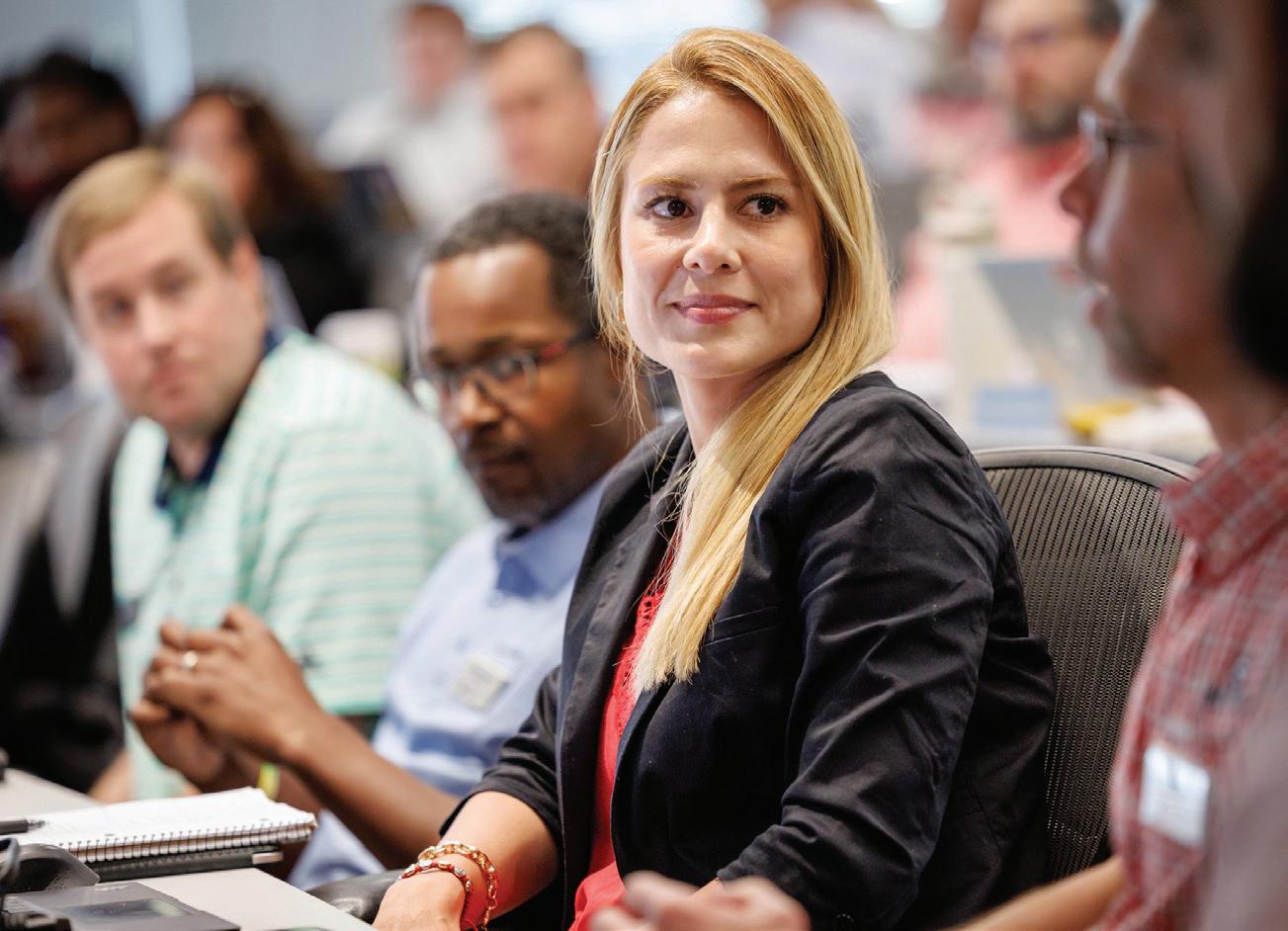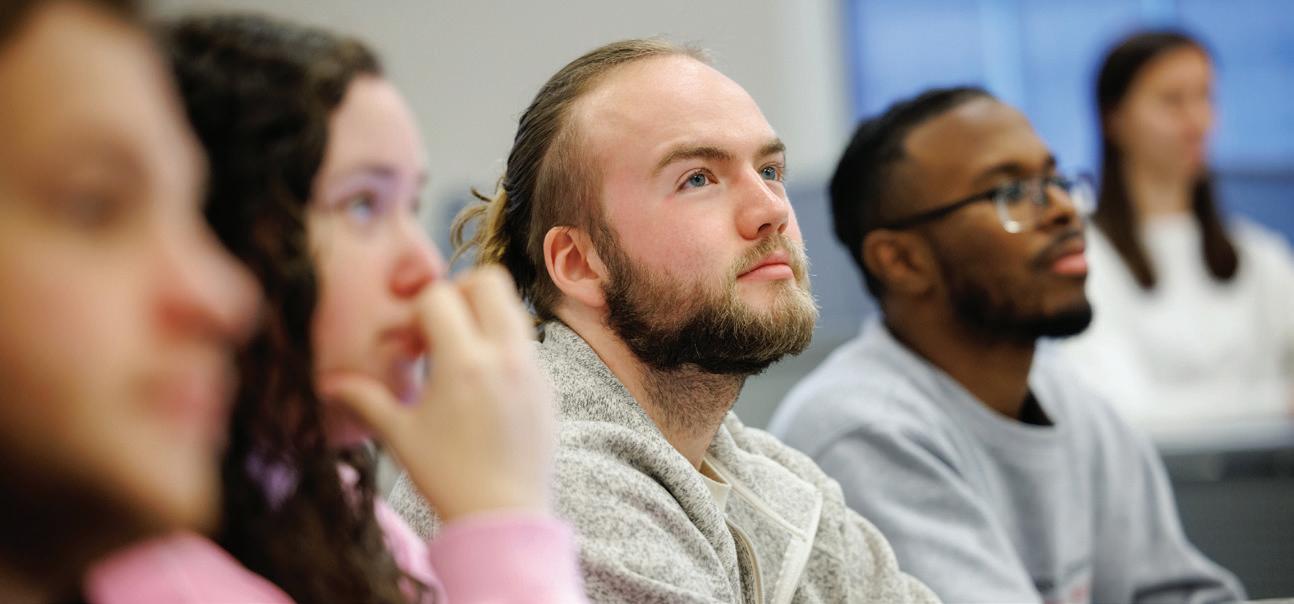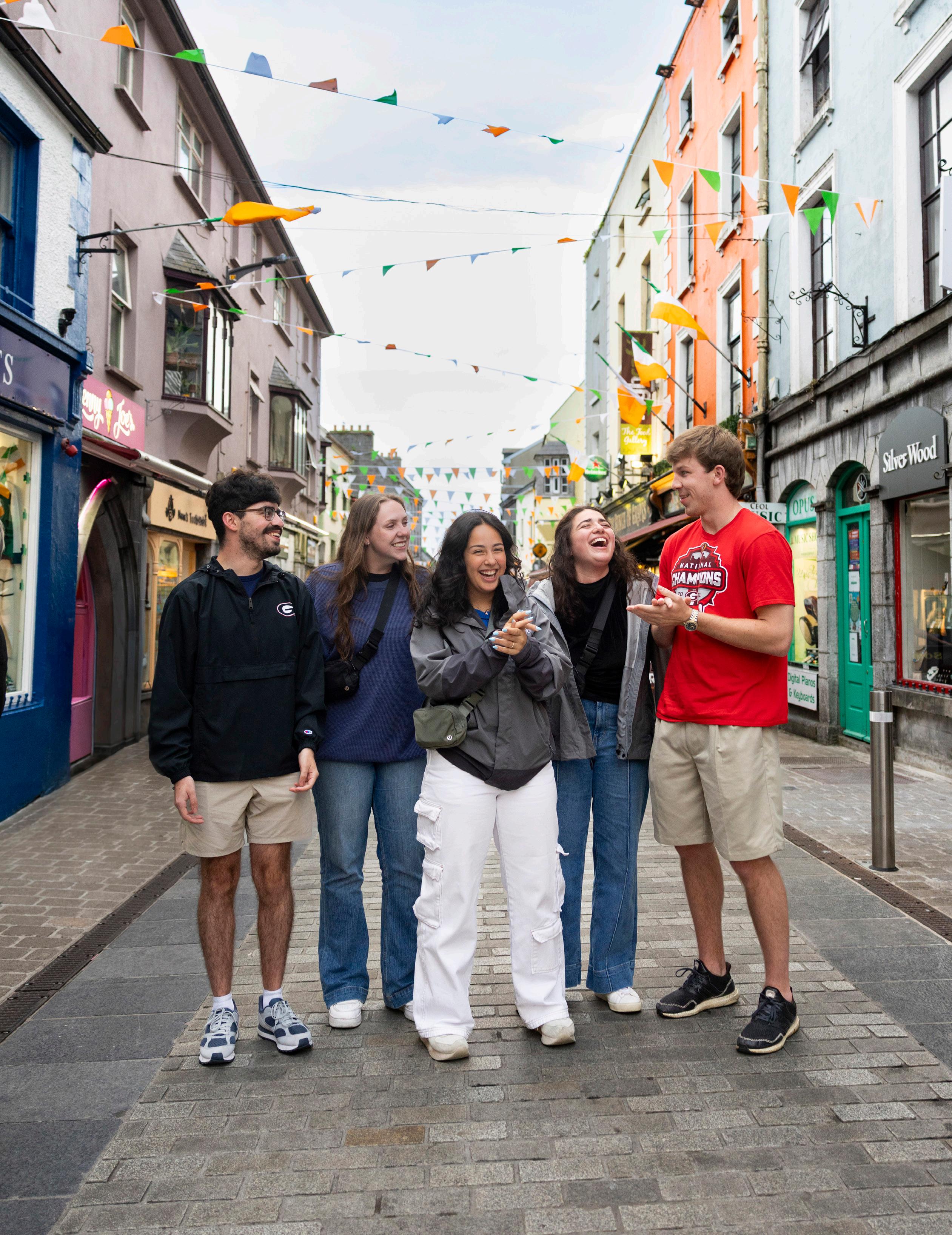

Céad míle fáilte
Ireland offers UGA students a hundred thousand welcomes
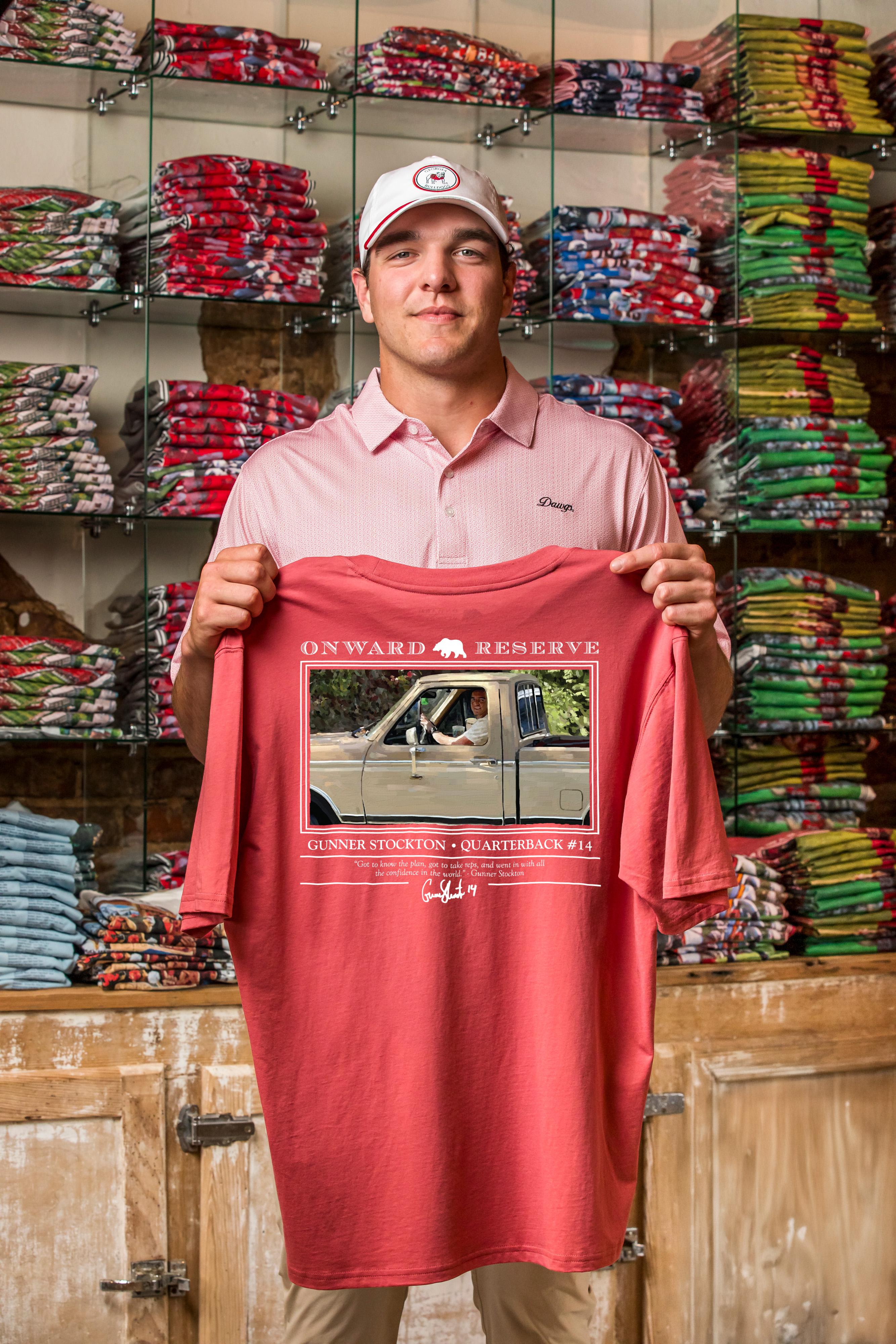

President Jere W. Morehead discusses student and faculty honors at the University of Georgia.
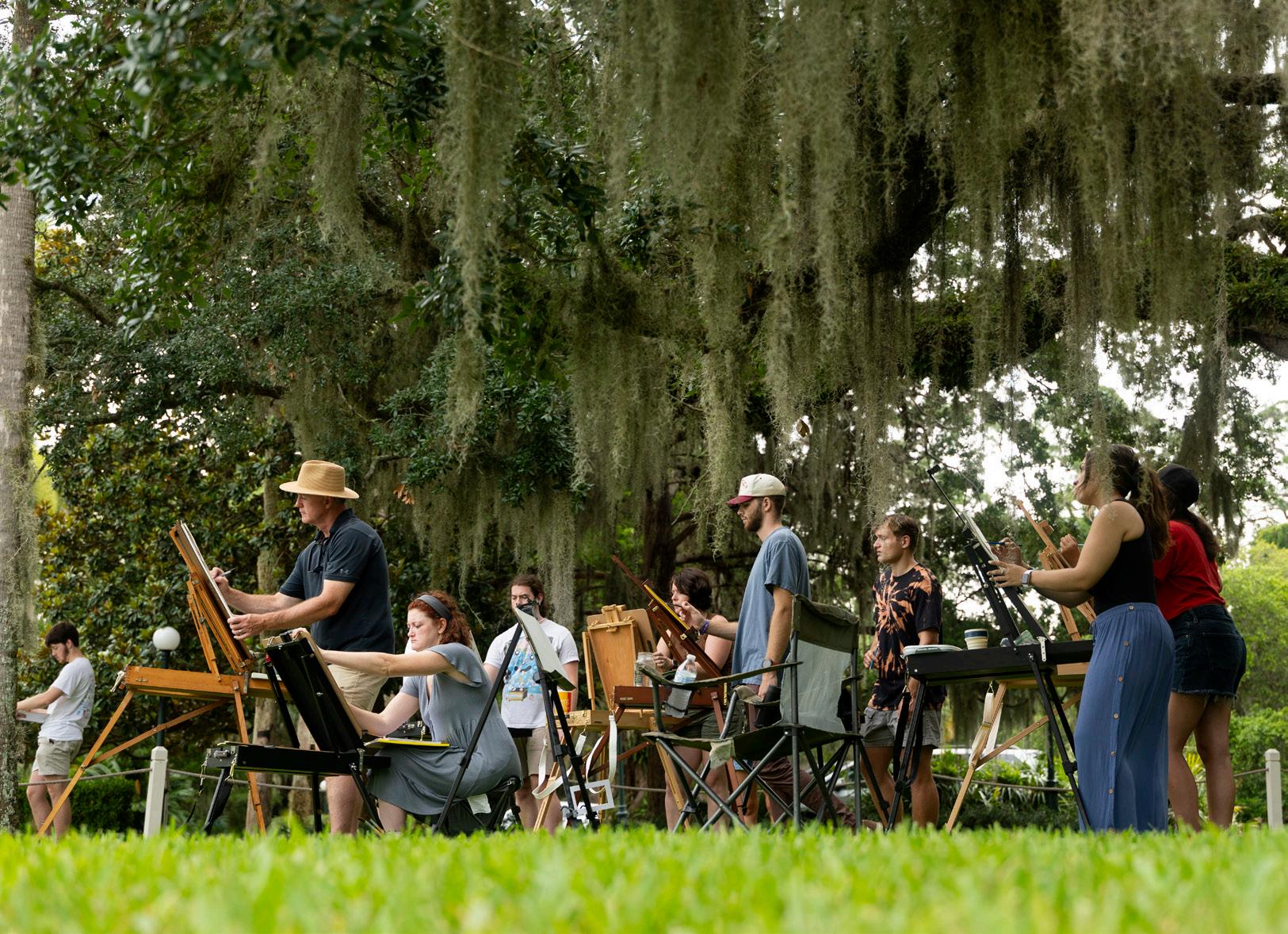
Students in the College of Environment and Design traveled to Jekyll Island for a week to draw and paint the remarkable scenery. For more about their experience, see page 36.
16 A Culture of Care
UGA’s Support Dawgs program empowers campus community members to respond to their peers’ mental health needs.
The Most Important Medical Job You’ve Never Heard Of
With the goal of making health care a little less scary for the most vulnerable patients, UGA’s child life program celebrates 30 years.
22 The Taste of Success
Yum! UGA’s Flavor of Georgia competition combines food innovation and old-fashioned entrepreneurship. The results are delicious.
Lucky Dawgs
For their Maymester adventure, a dozen UGA students explored Ireland, where they learned a lot about Irish history, culture, sports medicine—and a bit about themselves.
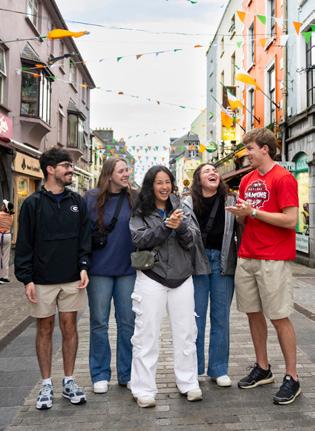
In Gaelic, céad míle fáilte (Kaid MEE-luh FAHLchuh) means “a hundred thousand welcomes.” That is exactly what the streets of Galway offered (from left) Jose Anguiano, Harper Brown, Val Suarez, Madison Huss, and Landon Kardian when they visited Ireland on their Maymester study away trip.
COVER PHOTO BY CHAMBERLAIN SMITH
ANDREW DAVIS TUCKER
Georgia eats!, p. 22.
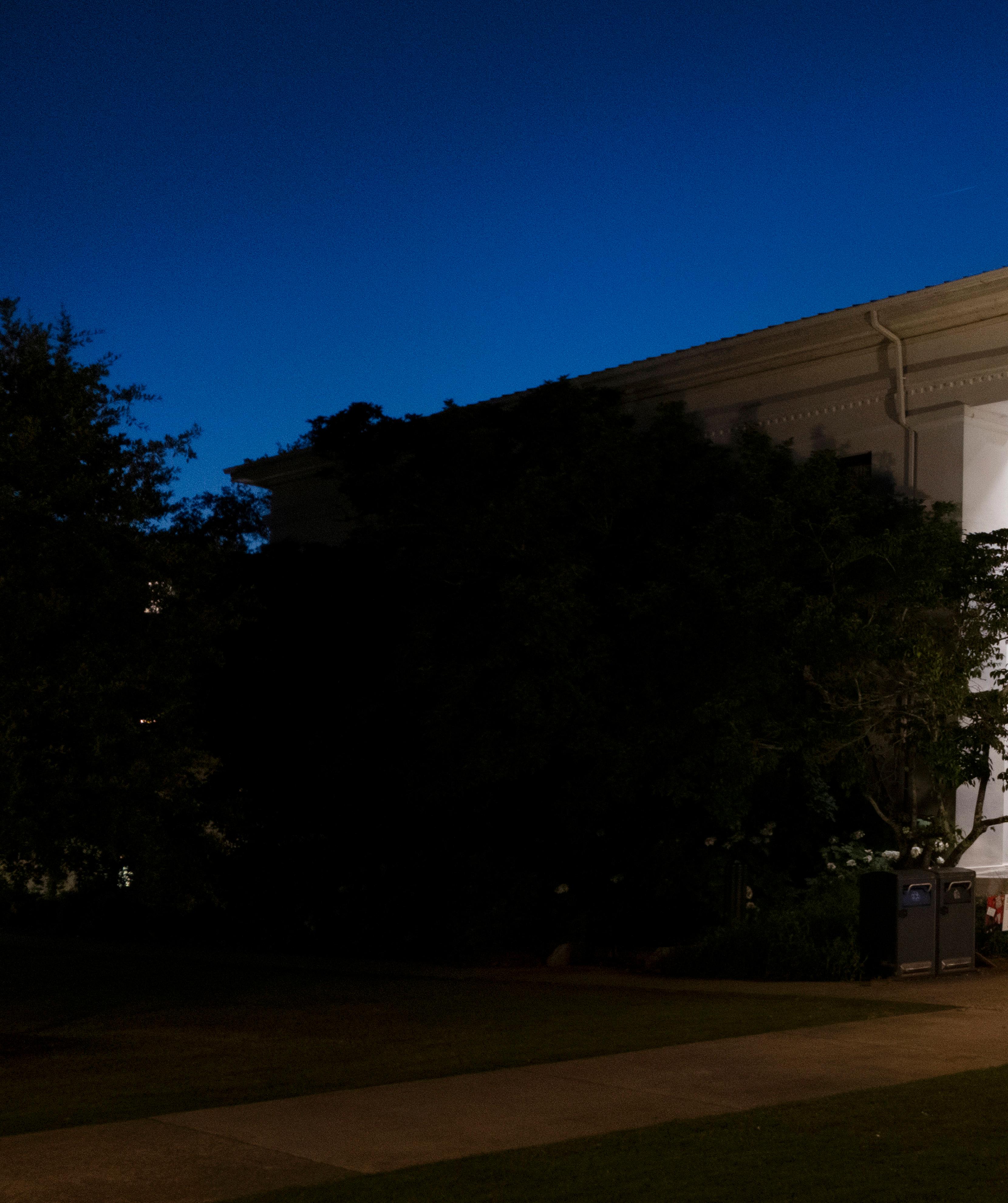
Like a Beacon
SINCE 1832, NIGHT OR DAY, THE Chapel is a tangible representation of the Bulldog legacy. For nearly two centuries, the Chapel has hosted leaders and lectures. weddings, and countless selfies on the steps.
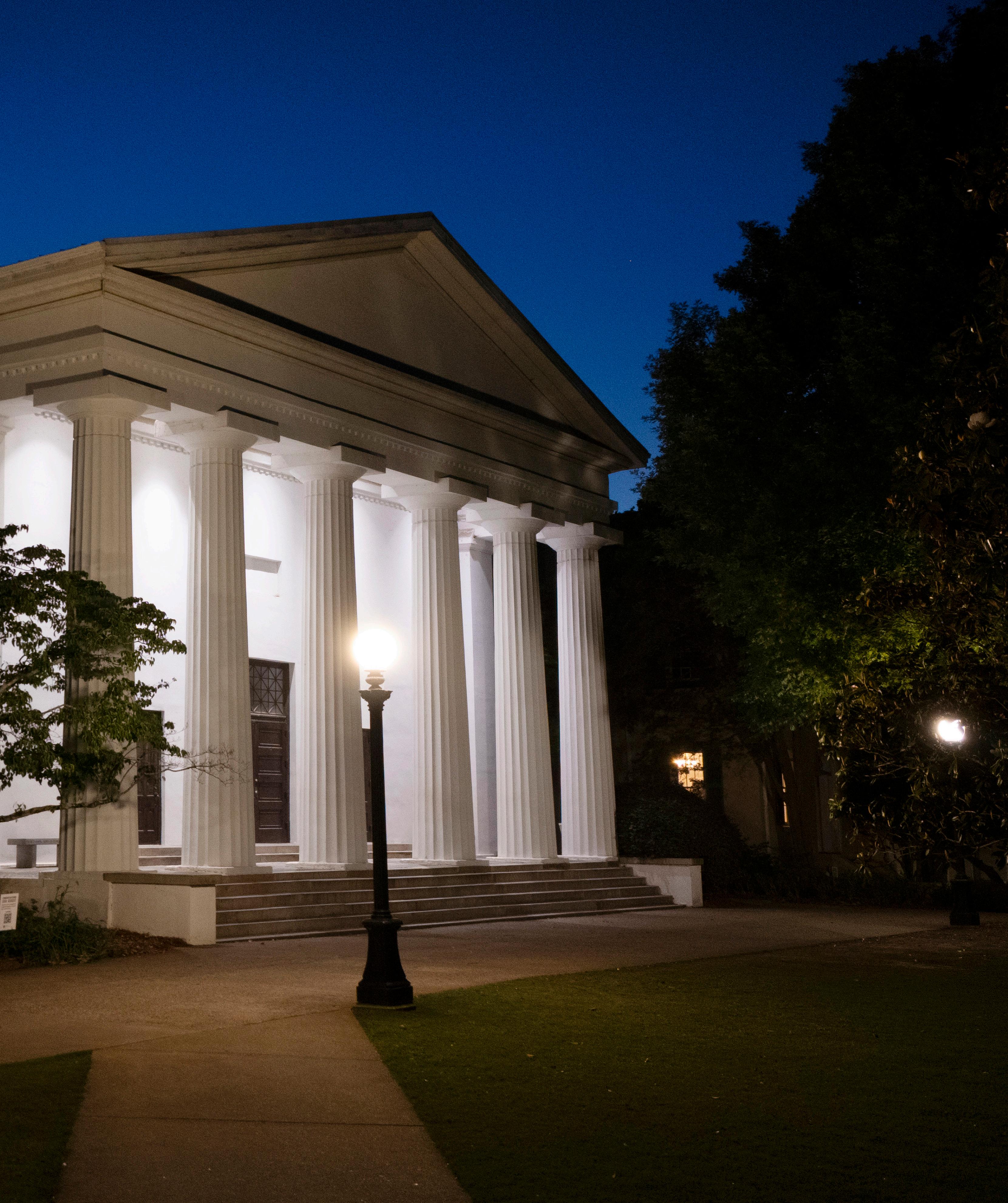
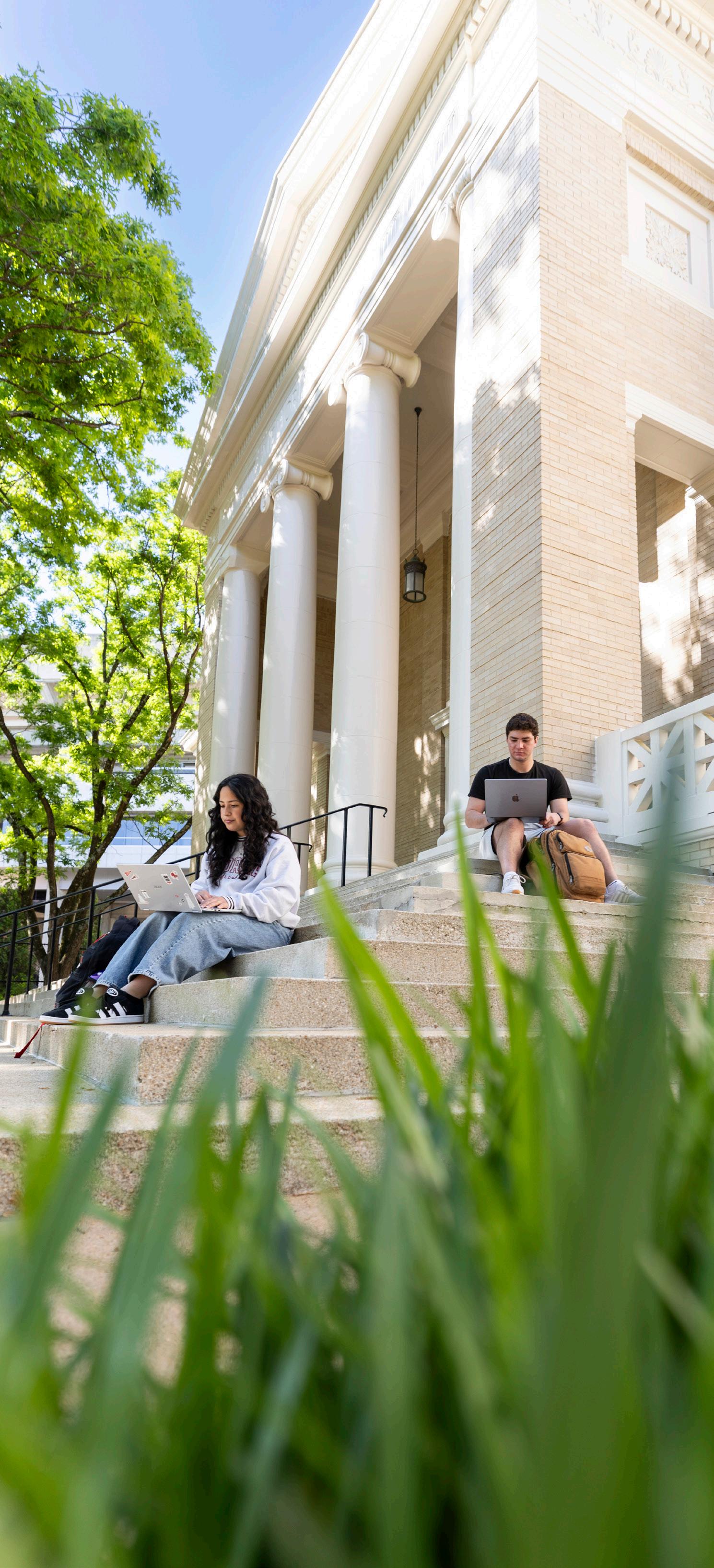
FALL 2025
VOLUME 105 ISSUE NO. 4
GEORGIA MAGAZINE
Editor · Eric Rangus MA ’94
Associate Editors · Aaron Hale MA ’16 and Leigh Hataway MA ’17
Staff Writers · Cole Sosebee BS ’19, MA ’25, Jayne Roberts, Savannah Peat AB ’19, and Hannah Gallant
Art Director · Lindsay Robinson ABJ ’06, MPA ’11, MA ’22
Advertising Director · Kipp Mullis ABJ ’93
Photo Editors · Peter Frey BFA ’94 and Chamberlain Smith ABJ ’18
UGA Photographers · Andrew Davis Tucker and Dorothy Kozlowski BLA ’06, ABJ ’10,
Contributing Writers · Elizabeth Elmore BBA ’08, ABJ ’08, Rachael Andrews AB ’17, MPA ’21, and Ireland Hayes AB ’23
Contributing Designers · Andrea Piazza ABJ ’12, MA ’19, Whitney Mathisen, Kaiya Plagenhoef, Marisa Castengera, Justin Patton ABJ ’15, and Amy Gunby BFA ’20
Editorial Interns · Caroline Newbern and Maura Rutledge
Research Writing Graduate Assistant · Sydney Barrilleaux BS ’24
MARKETING & COMMUNICATIONS
Vice President · Kathy Pharr ABJ ’87, MPA ’05, EdD ’11
Senior Director for Integrated
Media Communications · James Hataway MA ’10
Assistant Vice President & Chief Operating Officer · Fran Burke
Project Manager · Brittney Wurdeman
ADMINISTRATION
President · Jere W. Morehead JD ’80
Senior VP for Academic Affairs & Provost · Benjamin C. Ayers
VP for Finance & Administration · Ryan Nesbit MBA ’91
VP for Development & Alumni Relations · Jill S. Walton BSA ’99, MPA ’03
VP for Instruction · Marisa Anne Pagnattaro PhD ’98
Interim VP for Research · Christopher King
VP for Public Service & Outreach · Stacy Jones BSFCS ’93, EdD ’19
VP for Student Affairs · Michelle Cook
VP for Government Relations · Kevin Abernethy AB ’99
VP for Information Technology · Timothy M. Chester
Senior Director for Marketing and Communications for Development and Alumni Relations · Lacey Creech
Change your mailing address by contacting e: records@uga.edu or ph: 888-268-5442
Find Georgia Magazine online at news.uga.edu/georgia-magazine
Submit Class Notes or story ideas to gmeditor@uga.edu
ADVERTISE in Georgia Magazine by contacting Kipp Mullis at e: gmsales@uga.edu or ph: 706-542-9877
FINE PRINT
Georgia Magazine (issn 1085-1042) is published quarterly for alumni and friends of UGA.
POSTMASTER | Send address changes to: University of Georgia
286 Oconee Street, Suite 200 North Athens, GA 30602
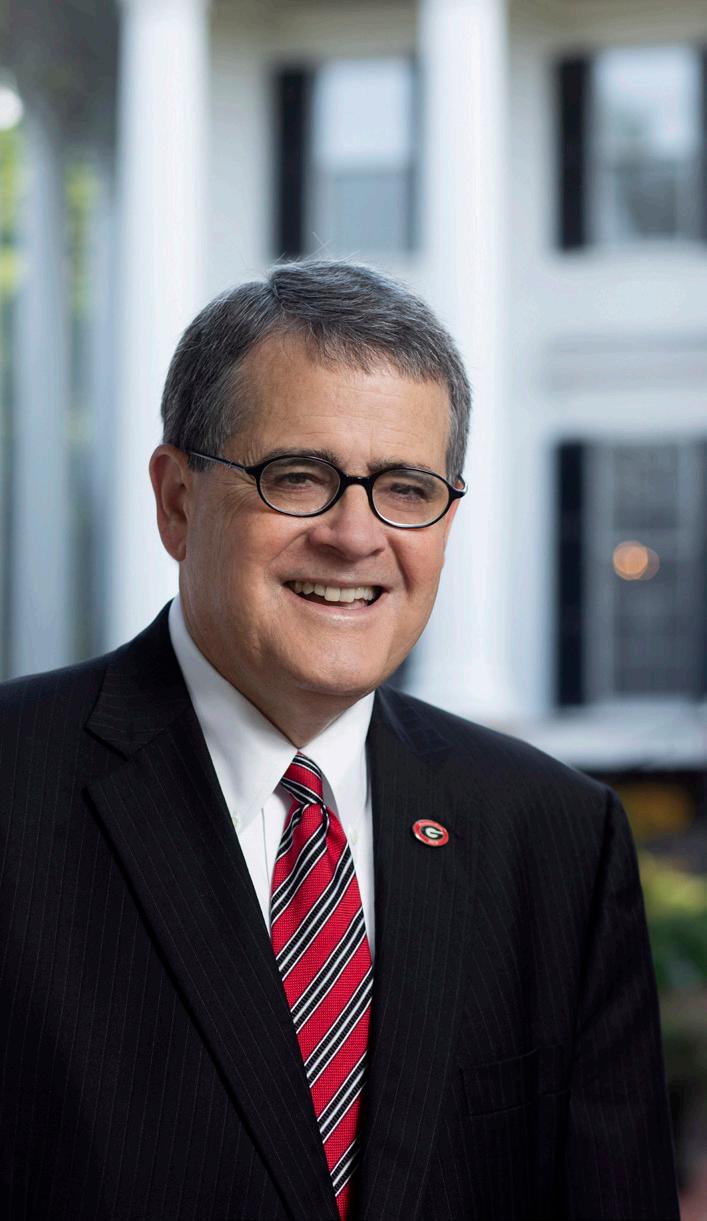
“Our students and faculty continued to reach new heights and were recognized for excellence with a host of national and international honors.”
Celebrating Honors and Awards
UGA faculty and students are collecting awards at an incredible rate
Throughout the spring and summer, it was inspiring to see the extraordinary accomplishments of individuals in the University of Georgia community. Our students and faculty continued to reach new heights and were recognized for excellence with a host of national and international honors.
This spring, fourth-year student Mercedes Bengs was selected as one of the nation’s 54 Truman Scholars while also receiving the prestigious Boren Scholarship. With seven undergraduates selected as Boren Scholars this spring, UGA’s total number of Boren Awards has reached 112, marking the second year in a row UGA has ranked second nationally for this elite recognition. In addition, three UGA third-year students were named Barry Goldwater Scholars, and 17 students were named Fulbright U.S. students, once again making UGA a top producing institution for Fulbright awards.
Our talented student-athletes continued to excel. This spring, on the heels of national championships in equestrian, women’s tennis (indoor and outdoor), and women’s track and field, UGA swimmer and seven-time All-American Abby McCulloh was named the 2024-2025 SEC H. Boyd McWhorter Women’s Scholar-Athlete of the Year. McCulloh—who graduated in May as a First Honor Graduate—was the 2024 SEC and NCAA champion in the 1,650-yard freestyle and the two-time SEC Women’s Swimming & Diving Scholar-Athlete of the Year.
UGA’s world-class faculty also were recognized for their groundbreaking work by distinguished national organizations. GRA Eminent Scholar Robin Buell and GRA Distinguished Investigator Daniel Perez were elected to the National Academy of Sciences (NAS). Selection to the organization is one of the most prestigious honors for a scientist, and 17 current or former UGA faculty are NAS members. Meanwhile, UGA Foundation Distinguished Professor of Chemistry Gregory Robinson—already a member of the National Academy of Sciences—was elected to the American Academy of Arts and Sciences. Founded in 1780, the academy is one of the most noteworthy organizations of its kind and includes historical figures like Benjamin Franklin and Albert Einstein.
UGA students and faculty are committed to excellence in all that they do, and I am proud of how they represent the University of Georgia with distinction. In the years ahead, I look forward to watching our community gain further recognition as we educate the next generation of leaders, solve the world’s grand challenges, and serve the state of Georgia.

Jere W. Morehead President

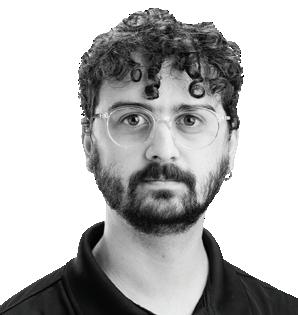
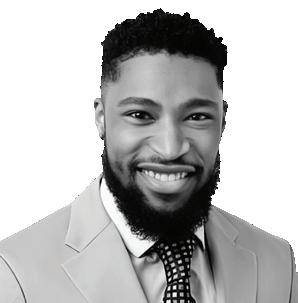

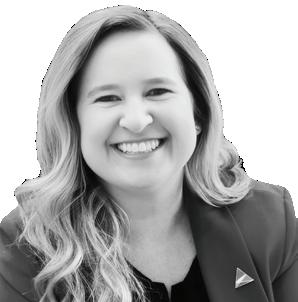
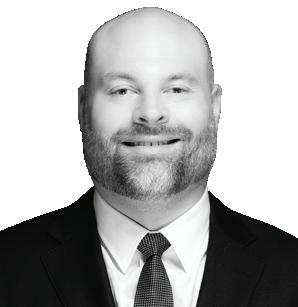
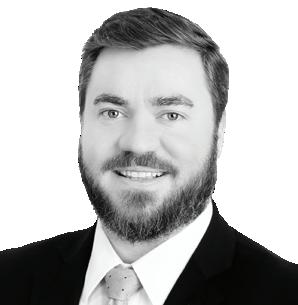


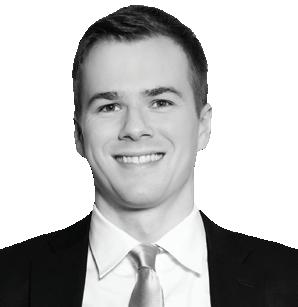


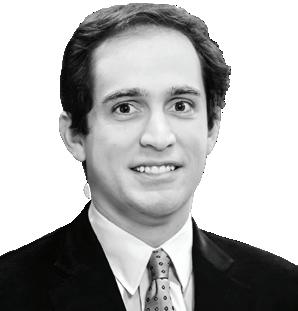

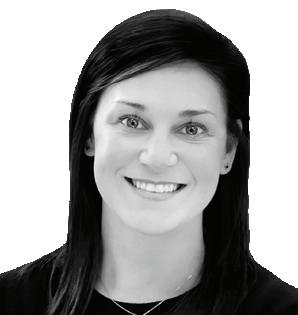


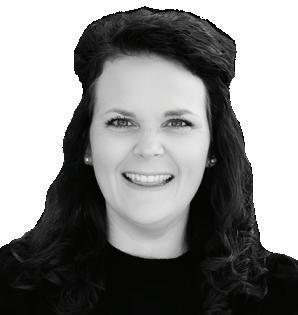
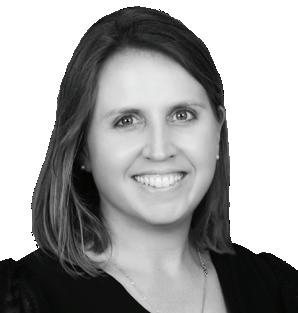
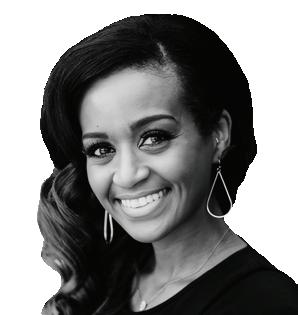
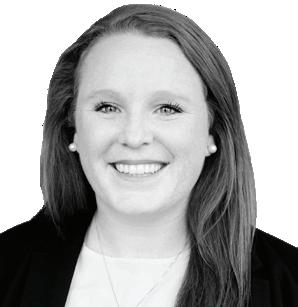
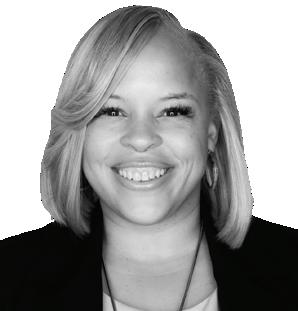


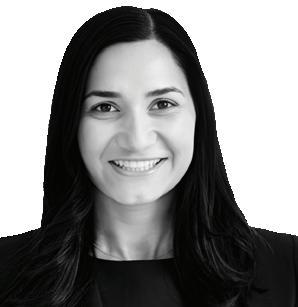
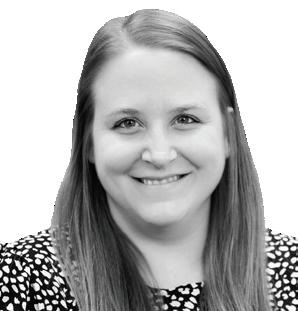
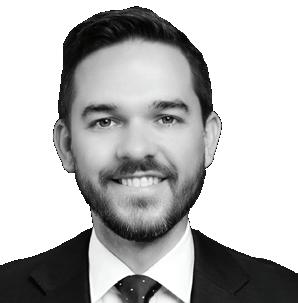
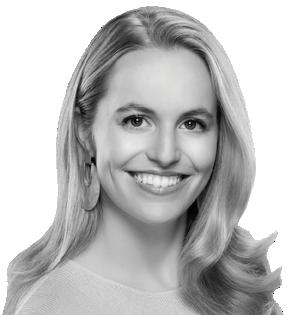
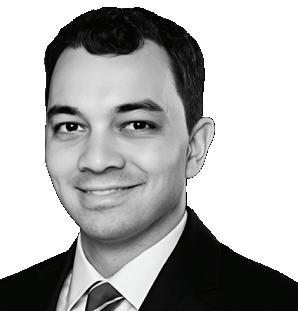
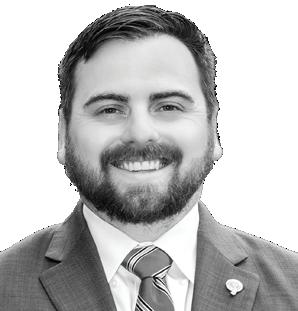
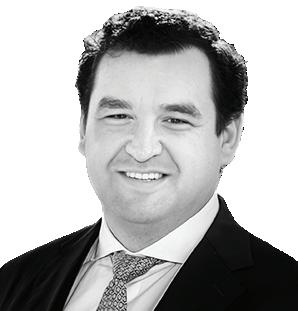
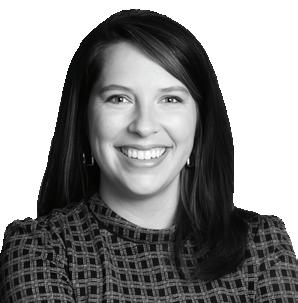
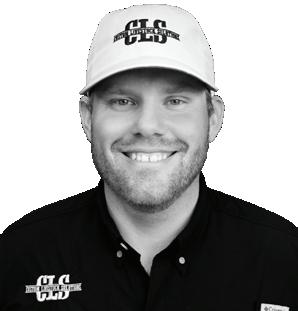
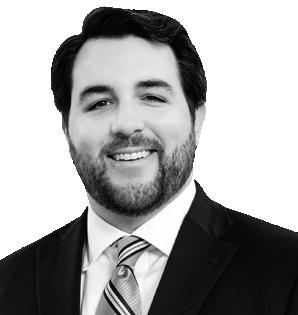
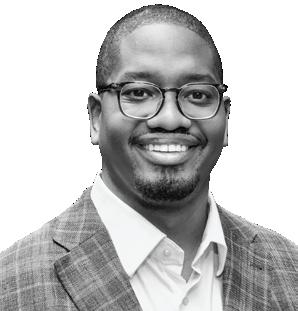

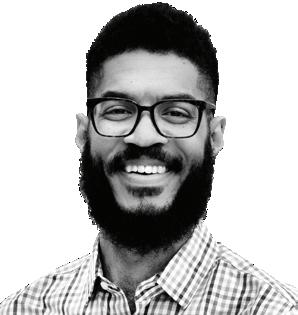
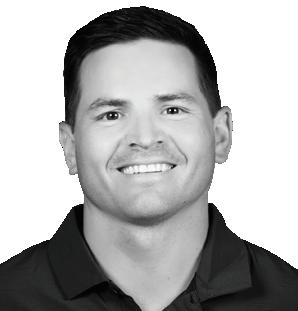

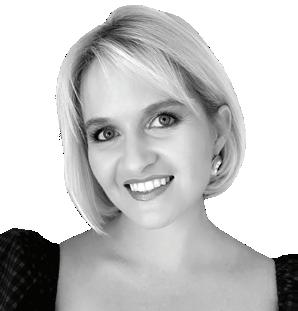

JEMELLEH COES
ALEX T. BRADFORD
SAM HATCHER
MATT DONATO
SHANE P. FOYE NIC FINK KATE HASLAM
MIKE MACDONALD
ALIA C. MARTINEZ
ROYA NAGHEPOUR
SARAH K. MERKEL
AVERY MONTHERO SHANNON MILAN
PHILLIP C. MOTE
E. SPENCER TOLLEY TYSON STRICKLAND
CAROLINE STELLING
JOE VAUGHN
BRIAN W. WATTS
KELLY VAUGHN D. HARLEY YANCEY IV
DAVE BLISS
CALEB ASHMORE ADAMS
MIKE BARRY DARREN ANGLIN
SHELBY BICE
MACY SIRMANS HOLMES
NICK HENDRICKS
MACKENZIE LONG
JORDAN LAYSON
CURT A. JACKSON
CAROLINE LEWALLEN
DORRIS HYER
INES K. OWENS
RYAN SCATES MIKE RAFI
JESSLYN ROLLINS
HARRY SANDERS III
CHARLES ORGBON III
COLBY RUIZ
UGA Z to
THE FUTURE IS BRIGHT
Congratulations to the Class of 2025
Higher education tests students in a variety of ways, but the Class of 2025 is leaving the University of Georgia well-prepared. For them, the future is bright.
Keynote speaker Jarryd Wallace AB ’19, a two-time bronze medalist across four Paralympics, shared lessons from the tests he’s faced during UGA’s undergraduate Commencement ceremony in May.
“That’s what trials do—they forge something in us that comfort never could,” he said. “They teach us to keep going when nothing makes
sense. To believe when hope feels distant. To see ourselves.”
A total of 8,781 students—5,971 spring undergraduates and 953 expected summer undergraduates, along with 1,857 graduate students— met requirements to walk in the university’s spring Commencement ceremonies and had their degrees
Highlights from across the UGA community

conferred by UGA President Jere W. Morehead JD ’80
“Remember the deep ties that bind us together, and remember that, wherever you go, throughout your life, you are part of the UGA family,” Morehead said.
We Are the Champions
One of the greatest seasons in Georgia Bulldogs athletics history wrapped up in stellar fashion in June when the women’s track and field team won its first outdoor national title. It was the fourth national championship won by a Bulldog team since February, tying a school record set in 1999.
Georgia’s women’s tennis team, runner-up to Texas A&M in 2024, avenged that defeat by sweeping the Aggies at the NCAAs in May. Having won the Intercollegiate Tennis Association National Indoor Championships in February, Georgia’s women’s tennis now has eight national team titles.
This spring, Georgia equestrian also won its eighth national championship—and second in the last five years. All told, Georgia now claims 52 national team championships across all sports.
In addition to the Bulldogs’ dominant team performance in track (second-place Southern Cal finished 26 points behind UGA), Georgia athletes won individual titles in the high jump (Elena Kulichenko, her third NCAA championship in the event), the
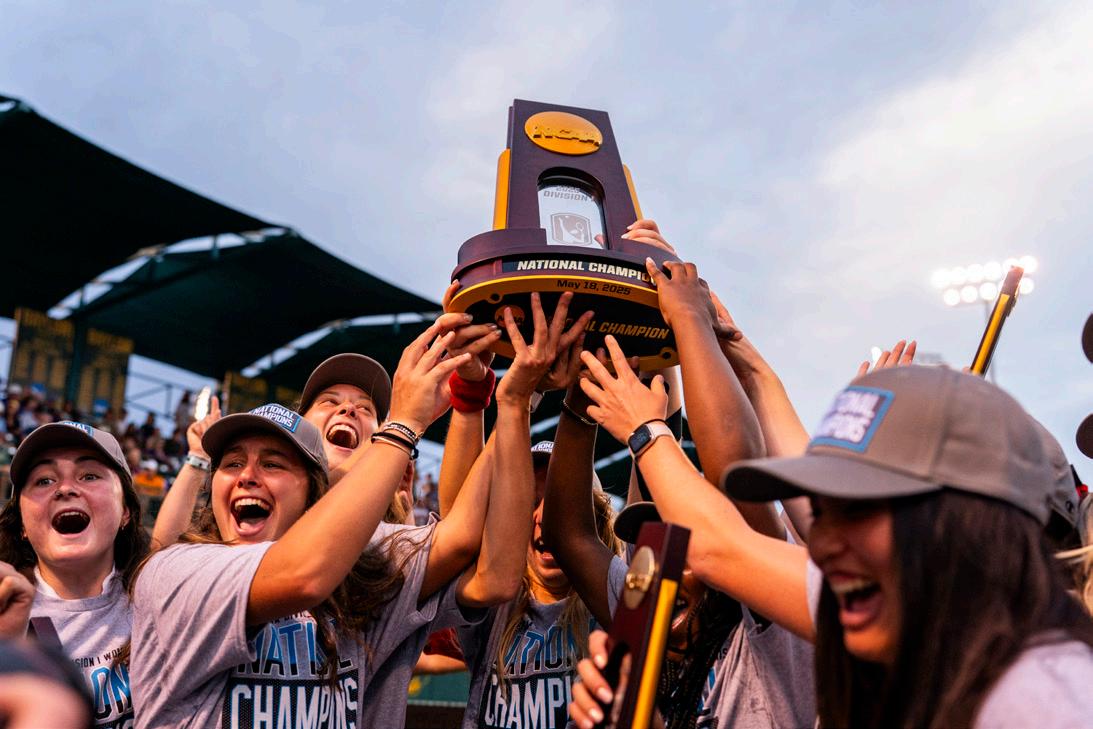
400 meters (Aaliyah Butler), the hammer throw (Stephanie Ratcliffe, who also won the 2023 NCAA title while at Harvard), and the 4x400 meter relay (Michelle Smith, Dejanea Oakley, Sydney Harris, and Butler).
Women’s tennis star Dasha Vidmanova’s individual performance was perhaps even more impressive. In spring 2024, Vidmanova and partner Aysegul Mert won the NCAA doubles title. In November, Vidmanova won the NCAA singles championship. Add those to Georgia’s team NCAA title in May, and Vidmanova is just the third player in collegiate women’s tennis history to win all three titles in her career.
Both the women’s tennis and women’s outdoor track teams entered the NCAA finals as favorites. Not so for the equestrian team, which entered the National Collegiate Equestrian Association Championships a decided underdog. But the seventhseeded Bulldogs knocked off second-seeded Auburn, sixth-seeded Texas A&M, and top-seeded SMU to win the title.
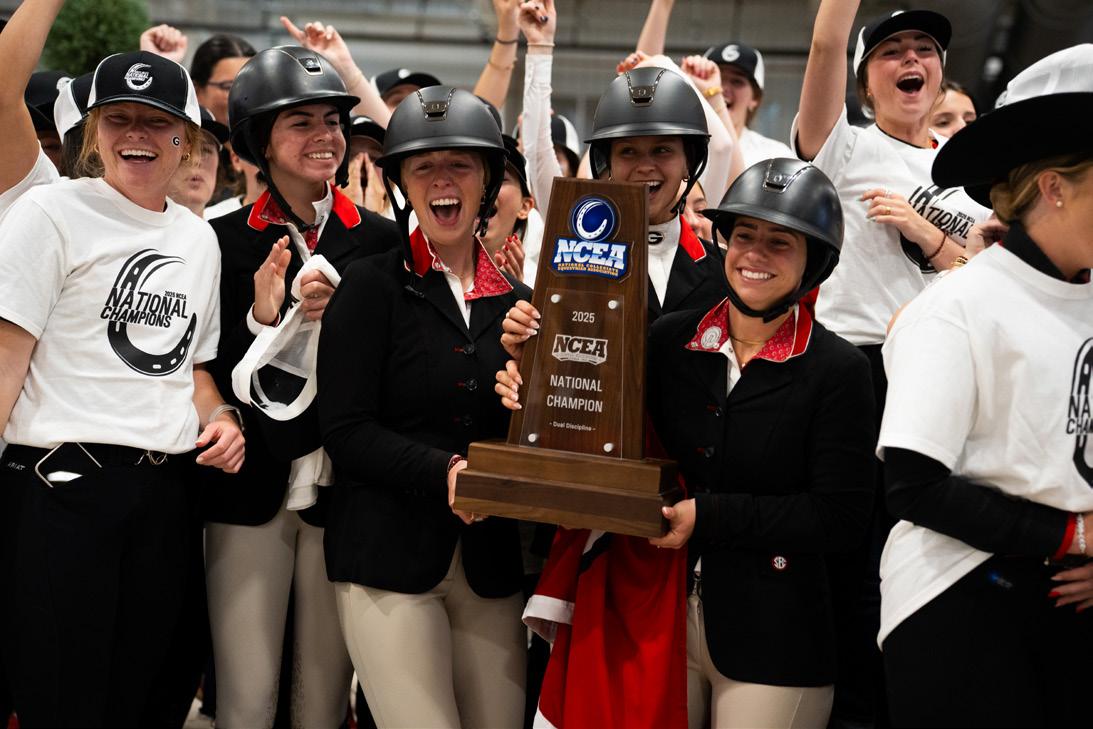
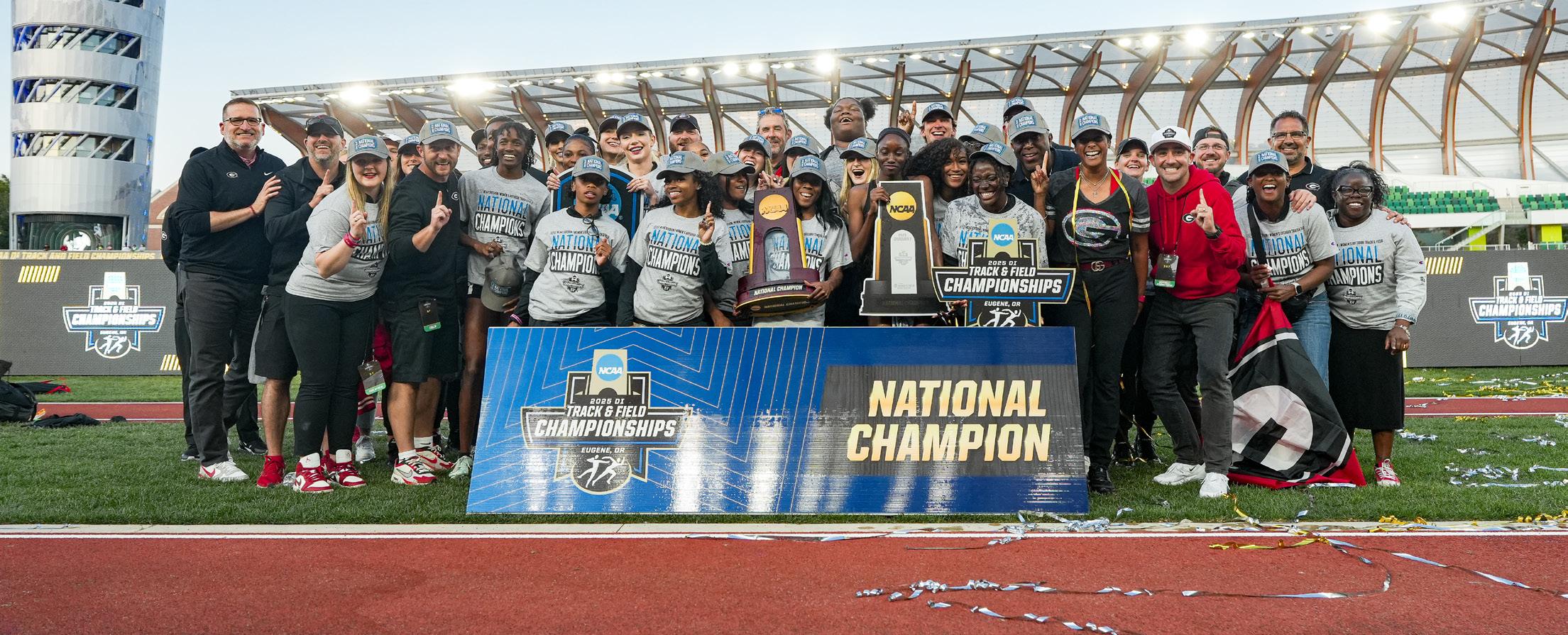
Clockwise from top left: Georgia’s women’s tennis, equestrian, and women’s outdoor track and field all won national titles in the spring.
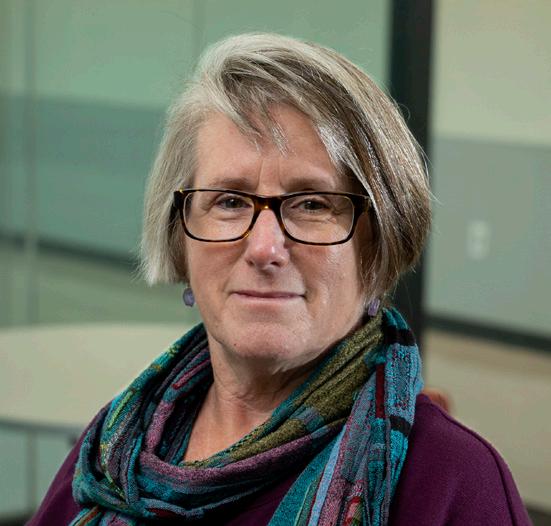
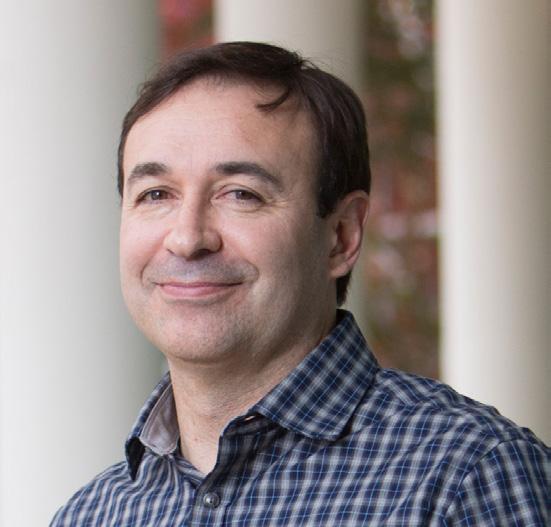
Two UGA Professors Elected to the National Academy of Sciences
C. Robin Buell and Daniel R. Perez have been elected to the National Academy of Sciences.
Members are elected to NAS in recognition of their distinguished and continuing achievements in original research. Membership is one of the highest honors a scientist can receive. With their elections, UGA now counts 17 current or former faculty as members of the prestigious academy.
Buell is the Georgia Research Alliance Eminent Scholar Chair in Crop Genomics in the College of Agricultural and Environmental Sciences. Her research facilitates crop improvement and helps develop new ways to increase crop productivity.
Perez is the Caswell S. Eidson Chair in Poultry Medicine in the College of Veterinary Medicine’s Department of Population Health. His work paved the way for new advances in vaccines and disease prevention for viruses that can spread from animals to humans, especially influenza.
Buell and Perez were among 120 new members and 30 international members elected at the academy’s annual meeting this spring.
FACULTY HONORS
Robinson Elected to American Academy of Arts and Sciences
Gregory Robinson, the University of Georgia Foundation Distinguished Professor of Chemistry, has been elected to the American Academy of Arts and Sciences. One of the oldest and most prestigious organizations of its kind, the academy was founded in 1780, and its membership includes historical icons such as Benjamin Franklin and Albert Einstein, among many others.
A UGA faculty member since 1995, Robinson conducts research with applications in sustainable energy. His recent work addresses unique challenges in chemistry, such as the preparation of molecules relevant to nanotechnology and the molecular development of carbon-free fuels. He was named to the National Academy of Sciences in 2021.
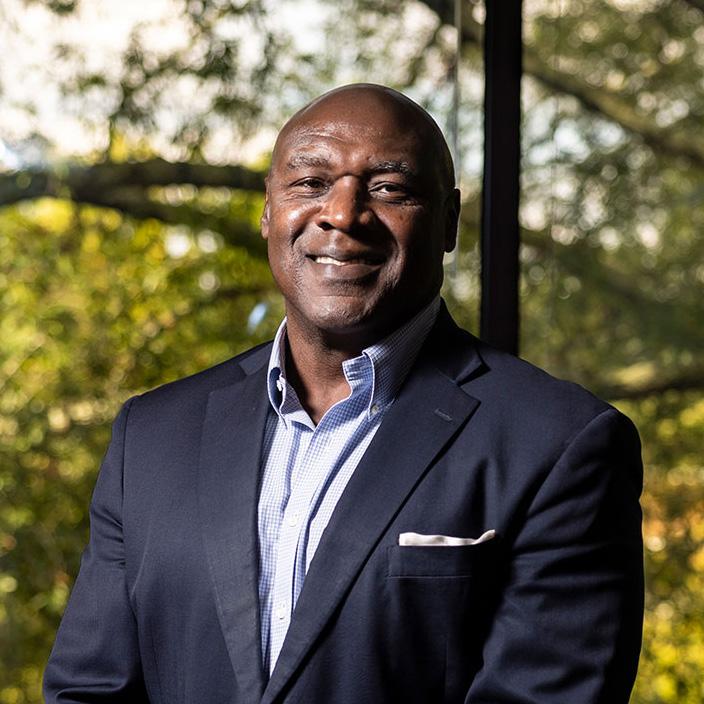
Robinson is the 13th UGA faculty member elected to the American Academy of Arts and Sciences.
“Being elected to the American Academy of Arts and Sciences is both humbling and tangible validation of our research,” Robinson says. “While I remain indebted to my students, co-workers, and colleagues, I also am constantly amazed by the transformative power of science.”
CHECK YOUR HAYSTACKS
Invasive Asian Needle Ants Invading the South
A newly emboldened invasive species is taking over Georgia yards this season, and it packs a powerful sting.
It may look like “just an ant,” but the Asian needle ant has a painful and potentially life-threatening sting. The ants can cause anaphylactic shock in people who’ve had adverse reactions to bee and ant stings.
Even if you’re not allergic, the pain from its sting can come back days later.
The species was first detected in Georgia
in the 1930s, but it wasn’t really studied until about 20 years ago after it spread. The ants are crawling all up and down the East Coast now. They prefer hardwood habitats, big oak trees, leaf litter, and piles of firewood. Asian needle ants wreak havoc in these native environments by outcompeting native ant species that are important to the ecology of the area.
It’s important to remember that many ants out there aren’t going to hurt you, so identification is key. You can send a

photograph or specimen to a local UGA Extension office, whose agents can help with identification. Then you can contact a professional to come out and bait for the ants.
CHAMBERLAINSMITH
C. Robin Buell
Daniel R. Perez
ANDREW DAVIS TUCKER
PETER FREY
KAIYA
LEADERSHIP UPDATE
Ayers is Named Provost
Benjamin C. Ayers, formerly the dean of the C. Herman and Mary Virginia Terry College of Business, has been named the University of Georgia’s senior vice president for academic affairs and provost, effective June 30.
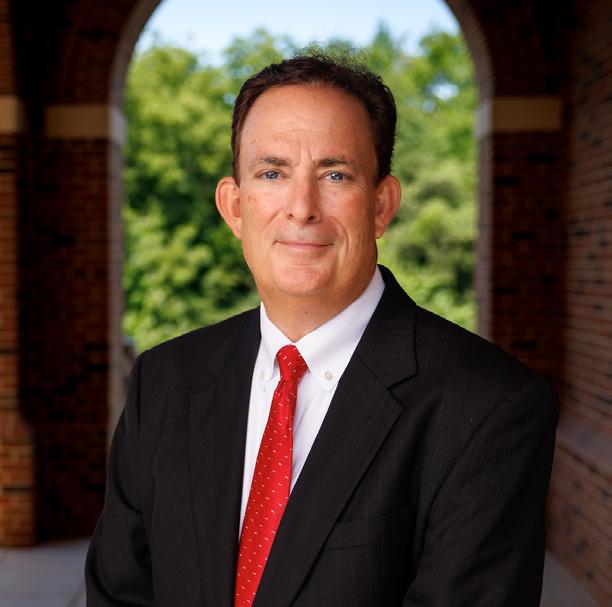
Ayers, who also holds the Earl Davis Chair in Taxation, succeeds S. Jack Hu, who was recently appointed chancellor of the University of California, Riverside. Ayers had led the Terry College since 2014.
“I am deeply honored to serve the University of Georgia in this important role,” Ayers says. “I look forward to working with the UGA community to further advance our world-class learning environment and expand our positive impact through groundbreaking research and service.”
Ayers earned his bachelor’s degree summa cum laude and his master’s of tax accounting from the University of Alabama, and his doctorate in accounting from the University of Texas at Austin. Prior to his appointment as dean of the Terry College, he served as director of UGA’s J.M. Tull School of Accounting for nine years. He joined UGA in 1996 as an assistant professor.
Under Ayers’ leadership, the Terry College has achieved historic success, endowing four academic units while launching a highly competitive online MBA, a master’s in business analytics, a campus-wide entrepreneurship program, popular executive and dual degree programs, and market-driven certificates.
Over the past decade, the college’s undergraduate enrollment has grown by 40%, graduate enrollment has risen 64%, and the college has achieved the highest employment rates for graduating students in its history.
Spread of Baker’s Yeast Tied to Human Migration
Yeast is already a familiar ingredient to bakers and winemakers, but new research from the University of Georgia suggests it can also trace the footsteps of our ancestors.
Humans domesticated baker’s yeast as early as 7000 BCE, but wild varieties of the same species also live on trees. The researchers sought to explore the link between the two, using data from all over the world. Some samples were even collected in North Campus by the Arch.
The study found that domesticated yeast split from wild yeast around the time of the last ice age. This is roughly when humans began growing their own food and spreading farming around the world.
It was also discovered that yeast in the winemaking regions of southern Europe resembled yeast found in the southern U.S. The researchers tied this to the Great French Wine Blight in the 1850s, when European vines were grafted onto North American rootstock to combat insect pests. In doing so, yeast living in the North American vines were passed on to their European counterparts.
Studying yeast in this way offers an enlightening look at how humans have moved through and interacted with their environment.
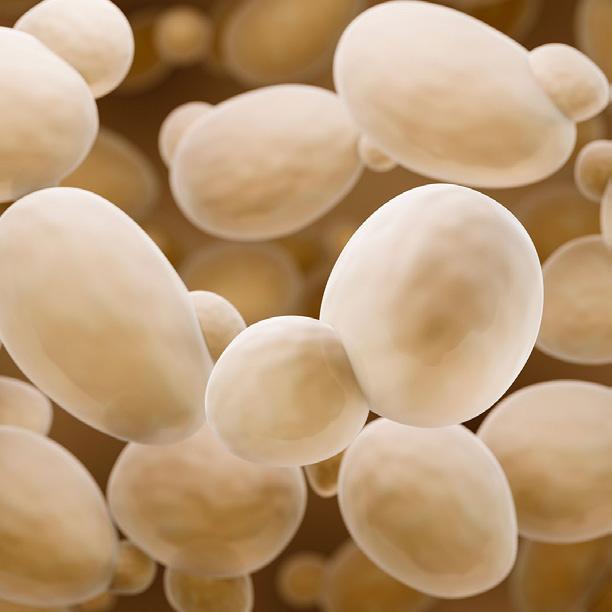
Dead Poets Society Screenwriter Visits UGA
Tom Schulman, the Academy Award-winning screenwriter of Dead Poets Society, visited UGA’s Department of Religion in the spring to share his journey from the page to the big screen.
Derrick Lemons, the head of the religion department in the Franklin College of Arts and Sciences, interviewed Schulman as part of Lemons’ course, Anthropology in American Religion.
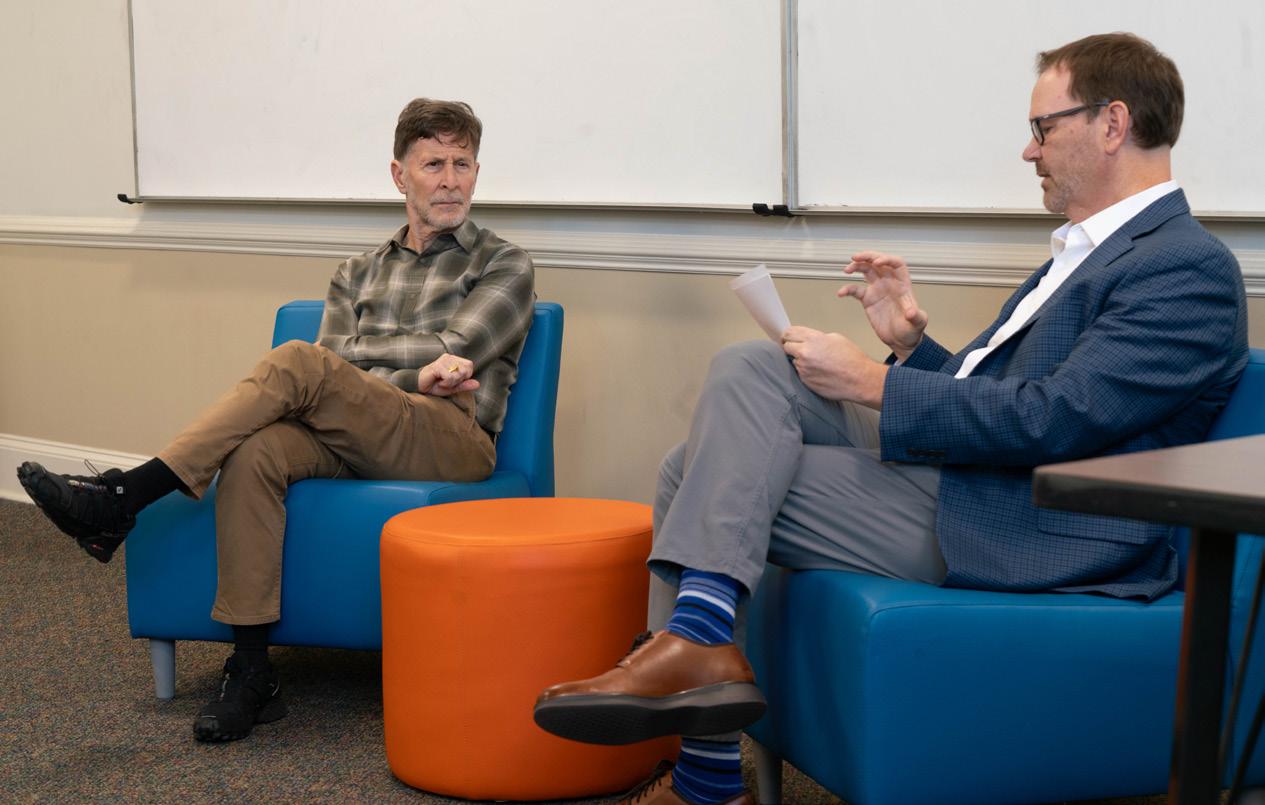
Schulman shared his experiences writing the film’s screenplay and the long process of getting a studio to produce it.
When asked why the 1989 film still resonates with audiences today, Schulman said that the theme of standing up for what you believe in crosses generations.
Schulman also shared his experiences in the film industry (his other credits include Honey, I Shrunk the Kids and What About Bob? ) and offered advice for the students.
“Show off your technique, your comedy, and your vision of the future,” he said. “Make something so distinctive that it will get a lot of attention.”
Tom Schulman (left), the Oscar-winning screenwriter of Dead Poets Society, speaks with religion professor and department head Derrick Lemons about the power of standing up for what you believe in—on top of the desk or off.
OH CAPTAIN, MY CAPTAIN
GARETH ROSE
Danger is Lurking in Southern Swamps
In studying alligators from the Okefenokee Swamp, Jekyll Island, and Yawkey Wildlife Center, researchers from the Odum School of Ecology and Marine Extension and Georgia Sea Grant found high levels of mercury, prompting concerns about the levels of the heavy metal in the environment.
Trace amounts of mercury, a potentially harmful element, are often found in runoff and precipitation downstream from major industrial areas. Previous research has shown accumulating levels of mercury in smaller animals in Georgia swamps, but not as much is known about animals as high up in the food chain as the alligator.
Alligators in the Okefenokee Swamp were found with mercury levels that were eight times higher than the other two research sites, a result that researchers called “striking” and added that the cause was likely residual runoff from factories.
The researchers discovered that mercury concentrations were more prominent in larger, older gators. That wasn’t just from absorption over time but presumably from the alligators consuming more creatures already contaminated with mercury.
As for smaller alligators and hatchlings, the story was surprisingly the same: Mercury levels seemed to be inherited by offspring.
The presence of mercury in these waters not only impacts the health of the alligators but also poses risks for the other creatures relying on these waterways for food, including humans.
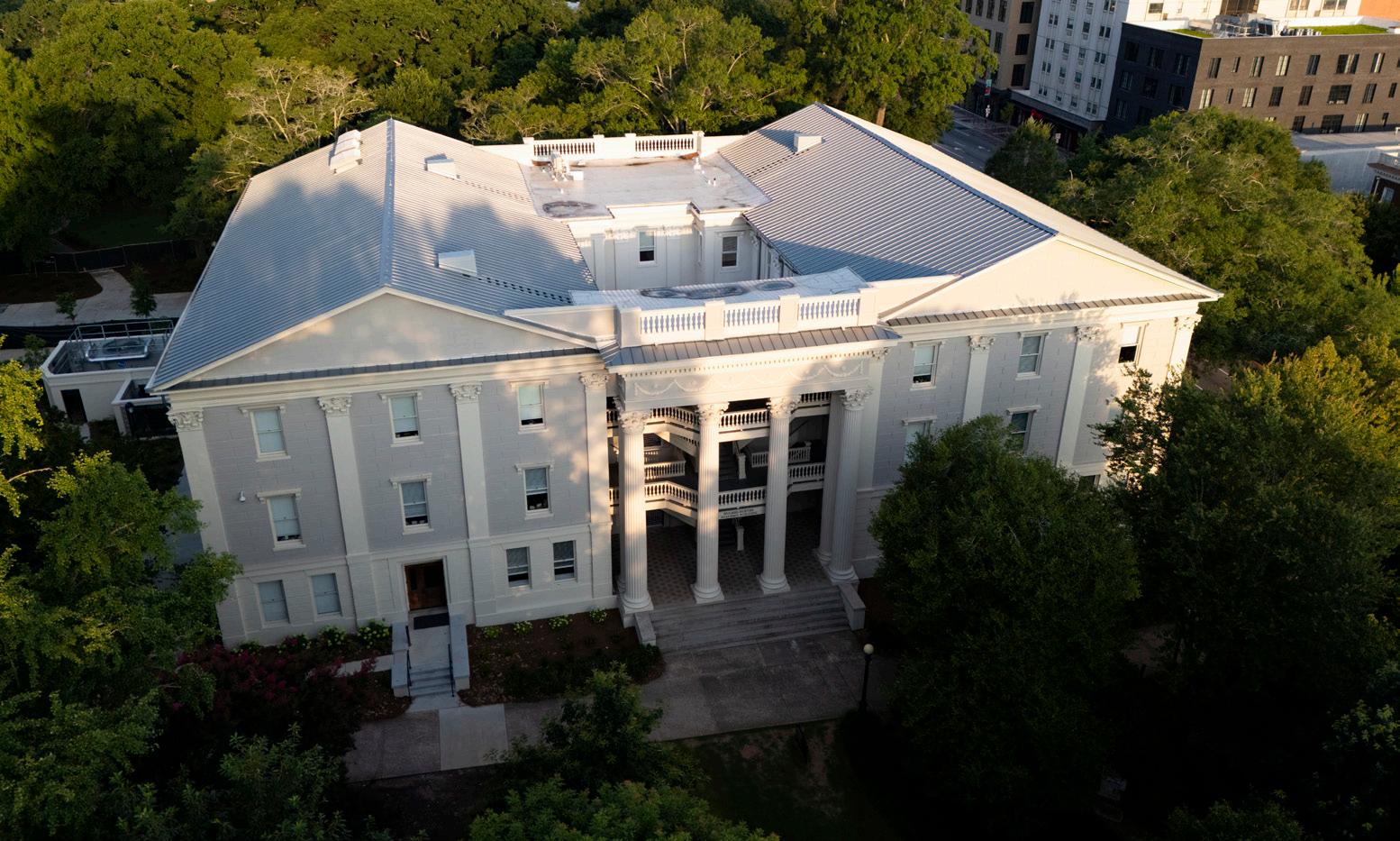
The restoration of the HolmesHunter Academic Building has received a variety of accolades.
Holmes-Hunter Restoration Earns Local, National Honors
The University of Georgia’s restoration of the Holmes-Hunter Academic Building earned top honors from local, state, and national organizations recognizing excellence in preservation and design.
UGA researchers discovered high levels of mercury in the Okefenokee Swamp by studying its alligator population.
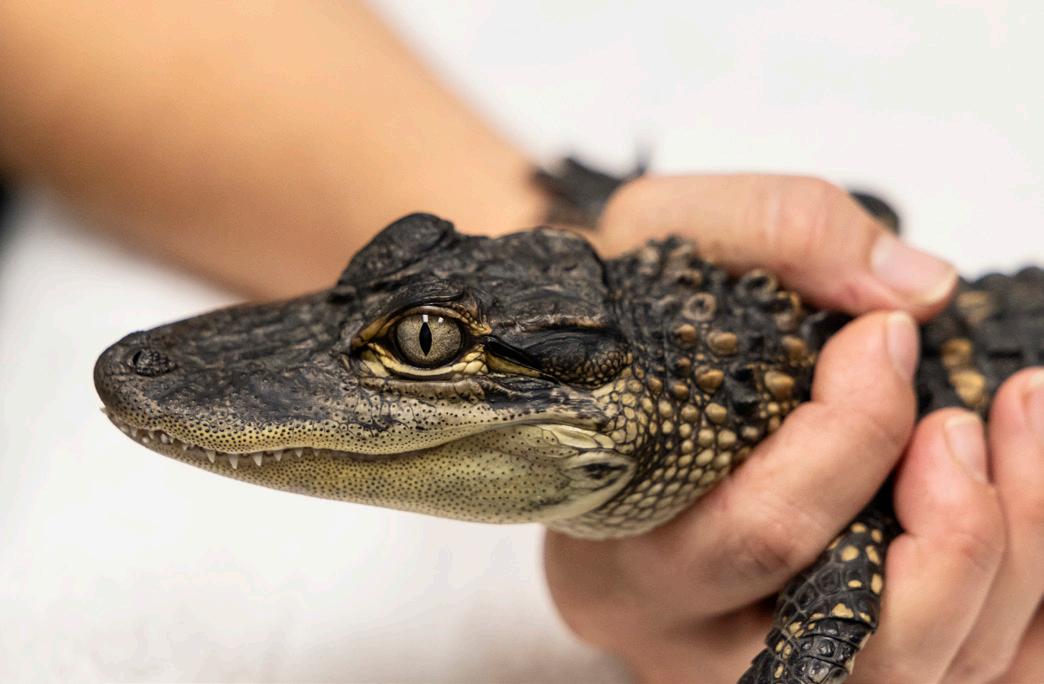
The project received the Excellence in Rehabilitation Award from the Georgia Trust for Historic Preservation; a Merit Award for Excellence in Architecture for Rehabilitation, Restoration, or Preservation from the Society for College and University Planning; and an Outstanding Restoration Award from Historic Athens.
Originally constructed in three phases between 1832 and 1905, the Holmes-Hunter Academic Building has served many roles, from housing the university library to becoming a central administrative hub. It was renamed in 2001 to honor Hamilton Holmes BS ’63 and Charlayne Hunter-Gault ABJ ’63, the first African American students to enroll at UGA in 1961.
The renovation, which was completed in fall 2024, preserved key historic features while updating the building for modern use. Crews refurbished and reinstalled original 1905 pine floors, restored century-old windows with new hardware, and recreated cast iron elements and stucco details using archival images. In the north wing, hand-painted 19th-century maps were uncovered and conserved after decades hidden beneath paint.
Additional improvements reintroduced historic circulation paths and removed a 1970s-era addition that had obscured the building’s original west façade. One of the most significant elements of the project was the restoration of the interior courtyard, which now serves as a natural skylight for the interior spaces and pays tribute to Holmes and Hunter-Gault. The $30 million project was funded through a match of public and private support including a $15 million gift from the Robert W. Woodruff Foundation.
BUILDING COMMUNITY
ANDREW DAVIS TUCKER
CHAMBERLAIN SMITH
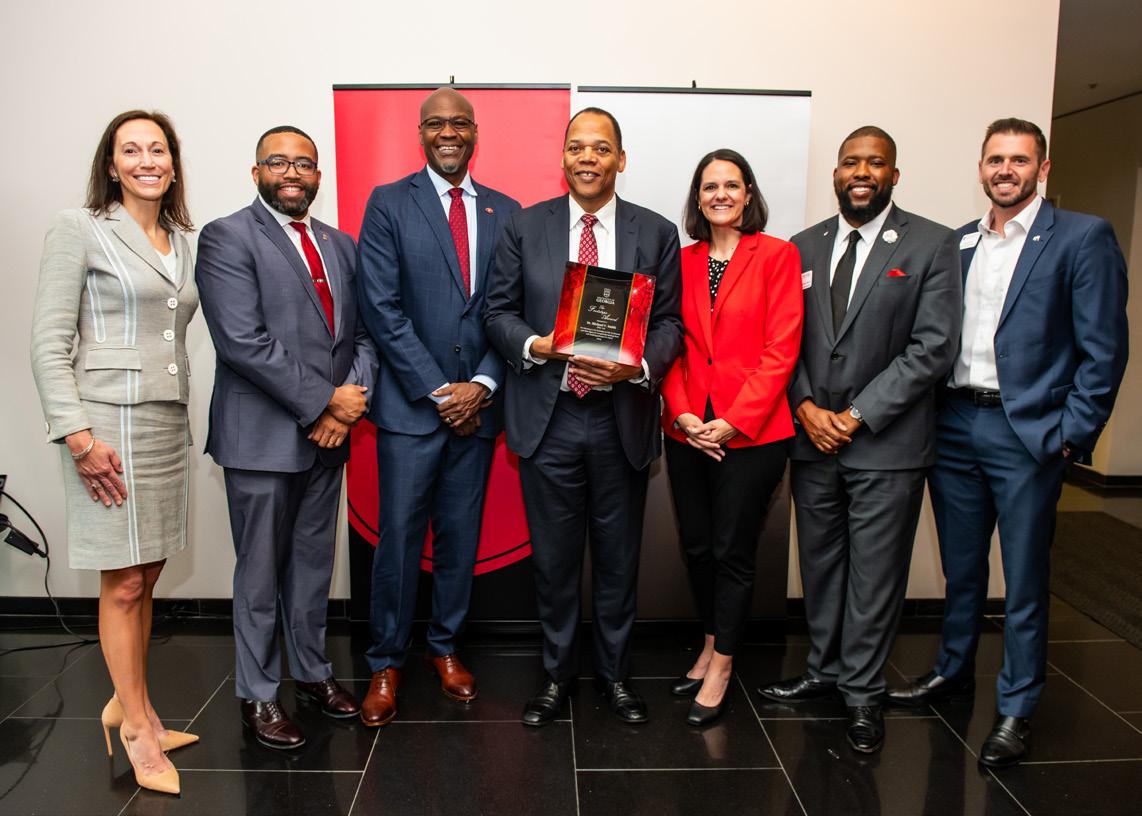
Dr. Michael V. Smith (center) is flanked by UGA dignitaries after receiving the 2025 Footsteps Award. Through his start-up, Marti Health, Smith bridges gaps in health care and student support.
2025 Footsteps Award Honors Medical Leader
Dr. Michael V. Smith BS ’79 was selected as the 2025 Footsteps Award recipient, in honor of his impact on the community. Smith, the CEO and founder of Atlantabased Marti Health, bridges gaps in health care and student support.
The Footsteps Award is named to recognize the three students who helped to integrate the university in the 1960s— Charlayne Hunter-Gault ABJ ’63, Hamilton Holmes BS ’63, and Mary Frances Early MEd ’62, EdS ’67—and honors alumni who follow in the footsteps of these trailblazers.
Smith’s health care platform, Marti Health, is dedicated to improving the quality and consistency of health care for at-risk populations, including those with sickle cell disease and their caregivers. Previously, as chief of cardiothoracic surgery at the former Atlanta Medical Center, Smith launched the first early detection lung cancer program in Georgia.
In addition to Smith’s contributions to the health care and medical fields, he is a member of the UGA Board of Visitors and is committed to improving the student experience through scholarships. NEVER
Using Humor Helps Scientists Build Trust
Scientists aren’t comedians, but it turns out a joke or two can go a long way.
As scientists often study complicated topics, it’s important to keep the key ideas of their research accessible for a general audience. One of the most effective ways to do that is through a little bit of light-heartedness, according to a new UGA study.
The study found that when researchers use humor in their communication—particularly online—audiences are more likely to find them trustworthy and credible.
People were also more likely to believe the scientist’s research when they found the post funny.
There’s a limit to the tone of the comedy, however. Science communication can’t contain too much sarcasm or negativity, or it loses credibility.
The researchers’ advice for science communicators? Keep posts short, clever, and try not to strike a nerve.
ONE HEALTH

Scientists Use Innovative Model to Fight Chagas Disease
Researchers at the University of Georgia and Texas A&M University received more than $4 million from federal and nongovernmental organizations to support research on Chagas disease.
The research will consist of multiple projects focused on the disease’s prevalence, diagnostics to detect the parasite that causes the disease, and treatment protocols to prevent infection and disease in dogs. The ultimate goal is to use the findings to help people as well.
Tens of millions of people across the Americas have Chagas disease. Spread by blood-sucking kissing bugs, the condition often goes unnoticed in early stages. However, a chronic infection can lead to serious heart and digestive system problems.
False negatives and a lack of effective treatments make it difficult to combat the disease. To address these issues, the researchers will implement a One Health approach, combining field and laboratory research, studying treatments, and exploring environmental factors to help both people and canines.
In the last five years, UGA has invested in the One Health approach as part of a broader effort to bring interdisciplinary research teams together to tackle complex 21st century challenges.

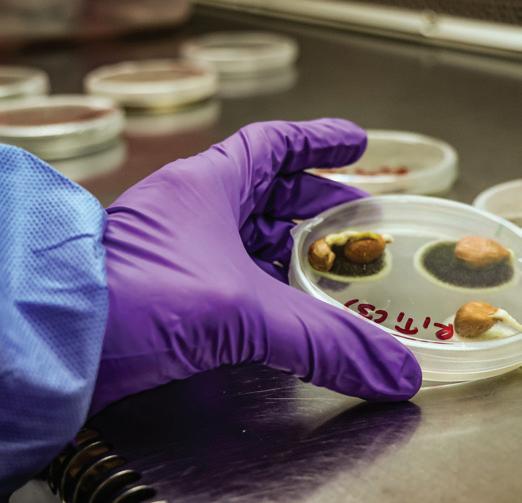

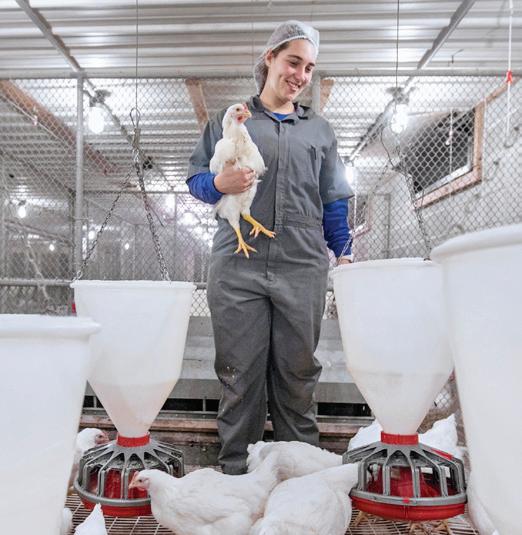
A DECADE ON THE HILL
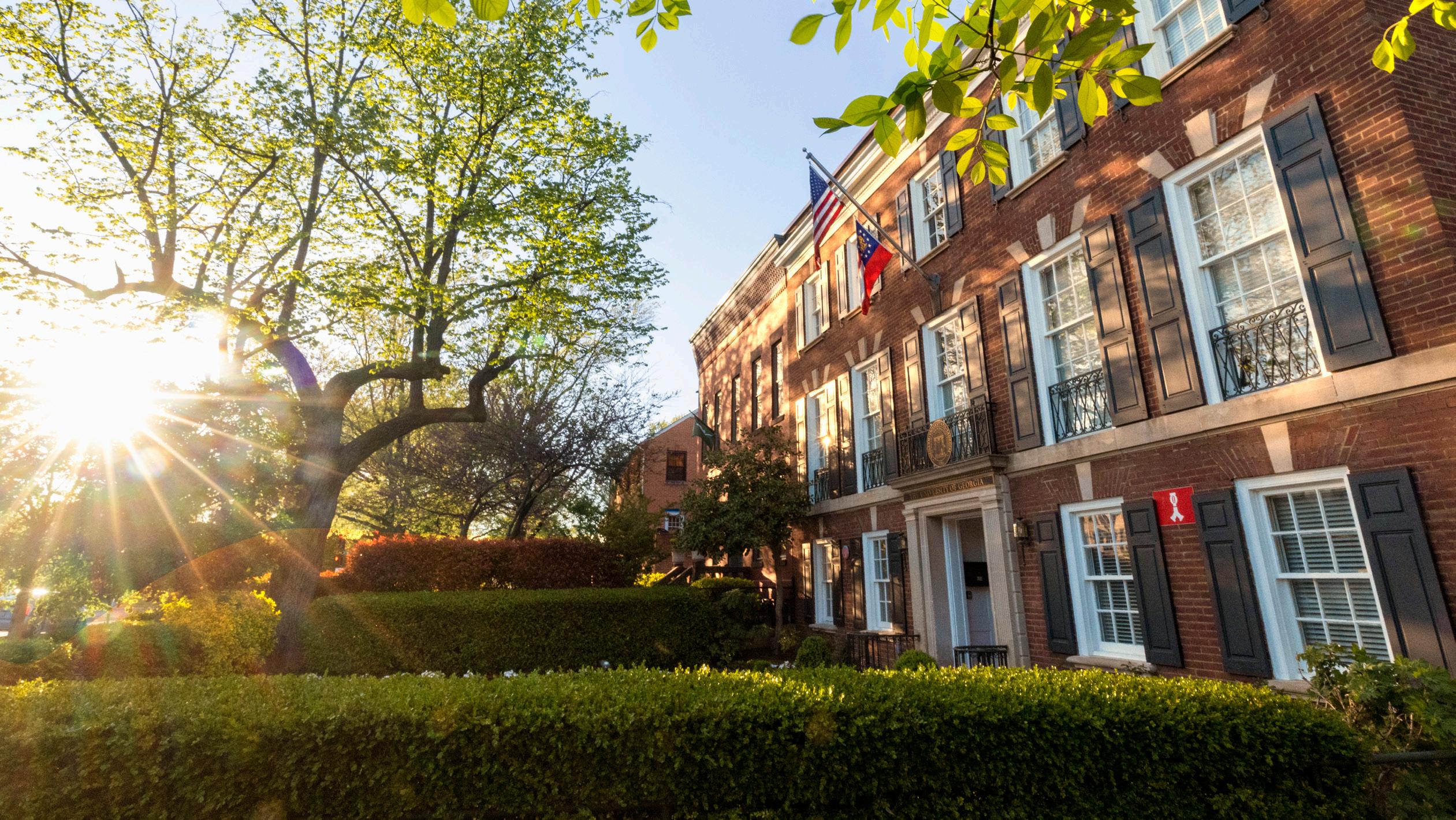
Delta Hall, UGA’s home in Washington, D.C., celebrates a milestone.
Delta Hall, UGA’s residential facility in Washington, D.C., has been home to nearly 900 UGA students since it opened in 2015. Bryson Henriott (right) lived there while working an internship in 2022.
Bryson Henriott AB ’23, AB ’23 has lived in Washington, D.C., for two years, working in various roles on Capitol Hill—from the offices of former Georgia Rep. Drew Ferguson BS ’88 and House Speaker Mike Johnson to his current position as floor assistant for House Majority Leader Steve Scalise.
But this isn’t his first stint in Washington. That came in 2022, when an internship brought him to the University of Georgia’s home in D.C., Delta Hall.
“Living in Delta Hall as an intern was truly an unforgettable experience,” Henriott (above, right) says. “It was incredible to learn from such accomplished people but also have a unique space where your classroom was in the same building you lived in. And I will always be thankful for the camaraderie and friendships I made there.”
In 2015, UGA dedicated Delta Hall, the culmination of a multiyear effort to create a permanent residential learning facility in the nation’s capital. Thanks to generous contributions from nearly 80 individuals, corporate partners, and foundations—most notably The Delta Air Lines Foundation’s $5 million gift—UGA purchased a three-story building in the heart of Capitol Hill, renovated it, and expanded the programming available for students interested in living and learning in D.C.
“I think before coming to Delta Hall, I just assumed other universities had similar programs, but once I got to D.C., I realized just how special that place is,” Henriott says.
Henriott’s political history stretches back to 2018, when the Vidalia native interned with Georgia State Sen. Blake Tillery AB ’06, JD ’10 before enrolling at UGA in 2019. Throughout his UGA experience, he held leadership positions: orientation leader, president of the Rural Students Igniting Success in Education organization, and student body president during his senior year,
to name a few.
Unsurprisingly, living in Delta Hall and interning full-time in Washington, D.C., was attractive to Henriott.
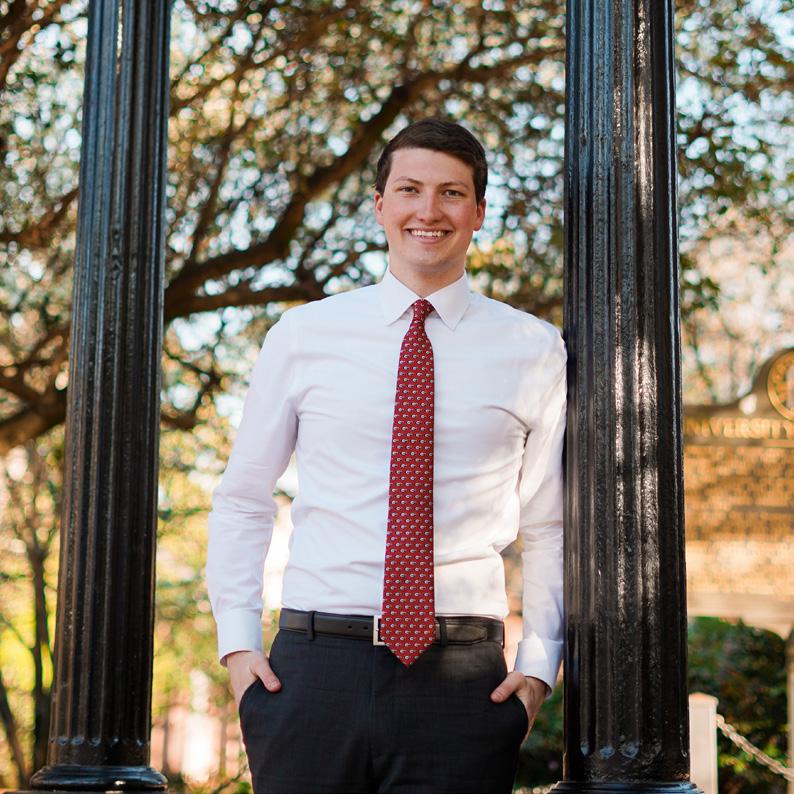
“The Delta Hall experience was so impactful that I knew I wanted to come back after graduation—and so did most of the students I lived with,” Henriott says. “In fact, three guys I lived with in Delta Hall became my roommates when I moved back to D.C. Interning on the Hill and living in Delta Hall is something I would recommend to any student, regardless of their major or what they want to do after school.”
Delta Hall allows UGA students to combine the experiences of living and working in Washington, building relationships with fellow students, and learning from UGA faculty, government officials, and policy experts.
Beyond work and study, students have the opportunity to explore a historic, dynamic city and connect with influential UGA alumni in the area, alumni like Henriott.
“From my D.C. internship to deciding to come back to Washington for my first job to my current job, all of it was made possible by UGA alumni,” Henriott says. “I would not be where I am today if not for their mentorship, so I try now to do the same for the students I meet.”
Help UGA students live and learn in the nation’s capital. GIVE.UGA.EDU/DELTAHALL
DOROTHY KOZLOWSKI
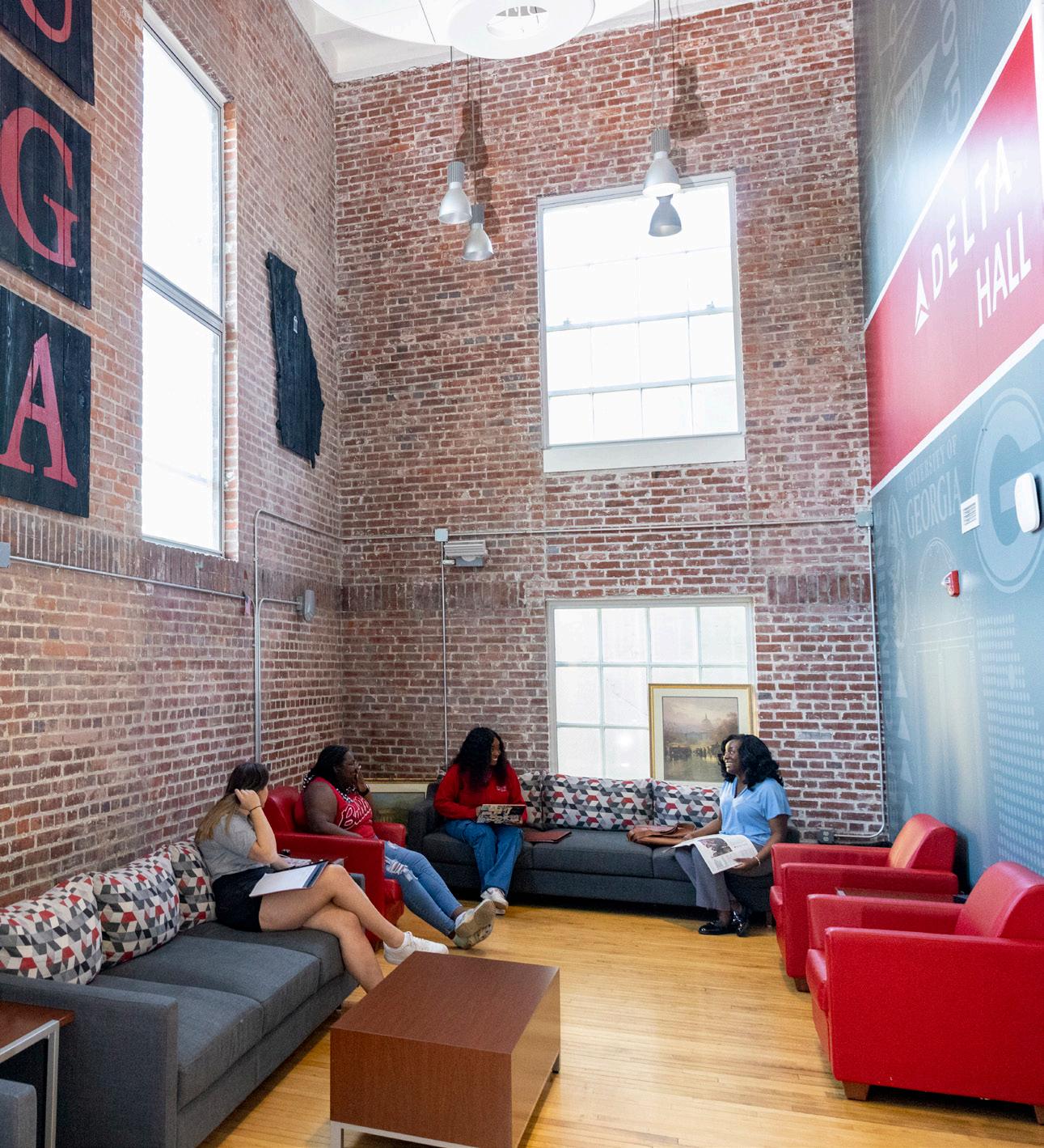
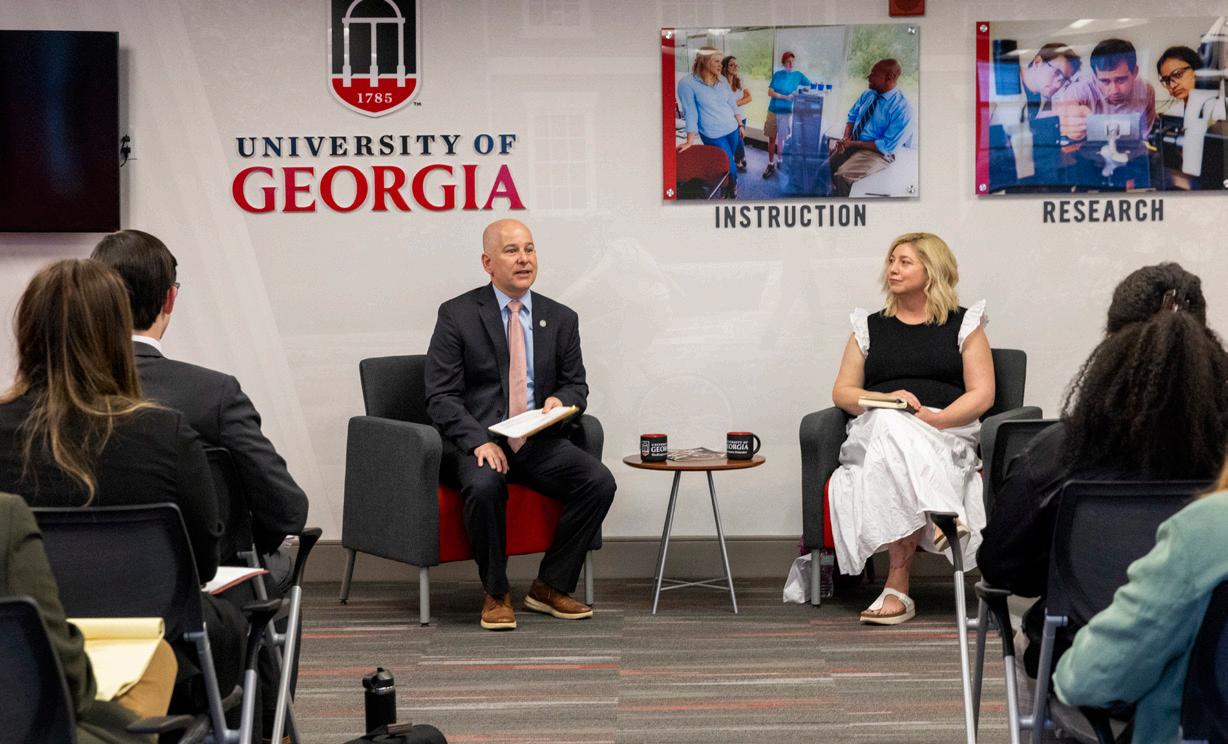
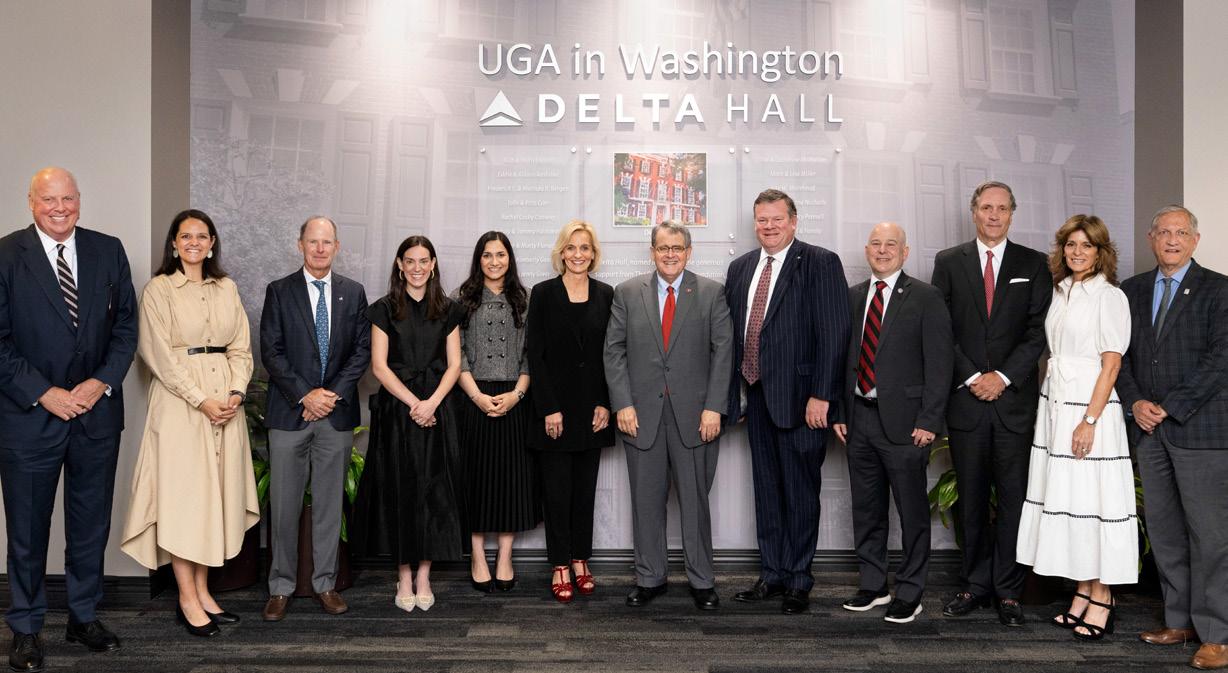

“Our rise as a national university is tied directly to the support we have received from Delta Air Lines. They have been a critical part of our continued success.”
– Jere W. Morehead JD ’80
UGA President
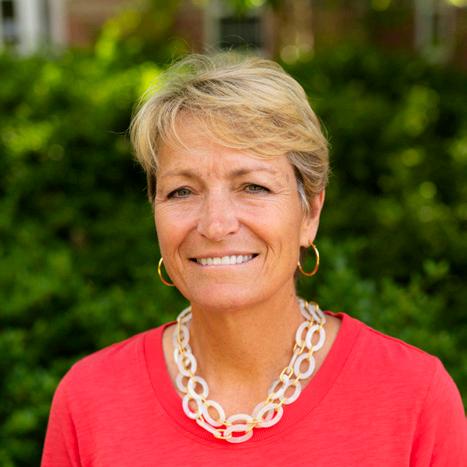
“In 2015, we went up to D.C. with UGA, and we immediately understood. It was a bold idea, it was an innovative idea, and it has just been phenomenal.”
– Tad Hutcheson, Senior Vice President
The Delta Air Lines Foundation
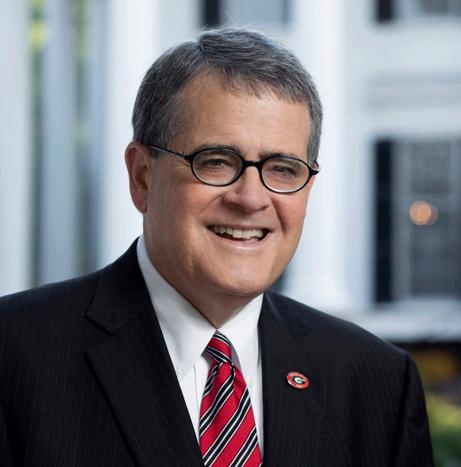
“Our older son struggled to locate housing in Washington during a college internship, so when UGA approached us to support the development of what is now Delta Hall, we knew firsthand that there was a need.”
– Nancy Juneau BSEd ’82
UGA Foundation trustee and Delta Hall donor
Delta Hall: A Look Back
1997 UGA first establishes a presence in Washington, D.C., with the start of the Congressional Agricultural Fellowship program.
2002 The UGA Honors Program, led by then-director Jere W. Morehead, establishes the Honors in Washington summer internship program.
2008 The Washington Semester Program is launched under the leadership of Director Don DeMaria, making D.C. internships available to all UGA undergraduates.
2013 UGA, with the support of the UGA Foundation and donor gifts, purchases and renovates a 20,000-square-foot building that had previously been a commercial office building and former boys’ club to be used as a residential learning facility.
2015 The Delta Air Lines Foundation makes a $5 million commitment to support the building purchased in 2013, establish a lecture series, and create additional internships for UGA students. In honor of this gift, the facility is named Delta Hall.
2025 As of this writing, 879 students have lived at Delta Hall, and 200 different offices have hosted student interns living at Delta Hall, including The UPS Foundation, NBCUniversal Media, the U.S. State Department, and the White House.
Above left: Each student floor includes common areas, a kitchen, study spaces, and laundry facilities. Students live on Delta Hall’s second and third floors in furnished suites for three to four people. Top right: Program director Don DeMaria and Leigh Hildebrand, senior assistant parliamentarian in the U.S. Senate, lead a seminar for students at Delta Hall. Bottom right: University of Georgia administrators, representatives from Delta, donors, and alumni gathered on campus May 1 to celebrate the 10th anniversary of Delta Hall.
EDWIN HAMMOND
DOROTHY KOZLOWSKI
DOROTHY KOZLOWSKI
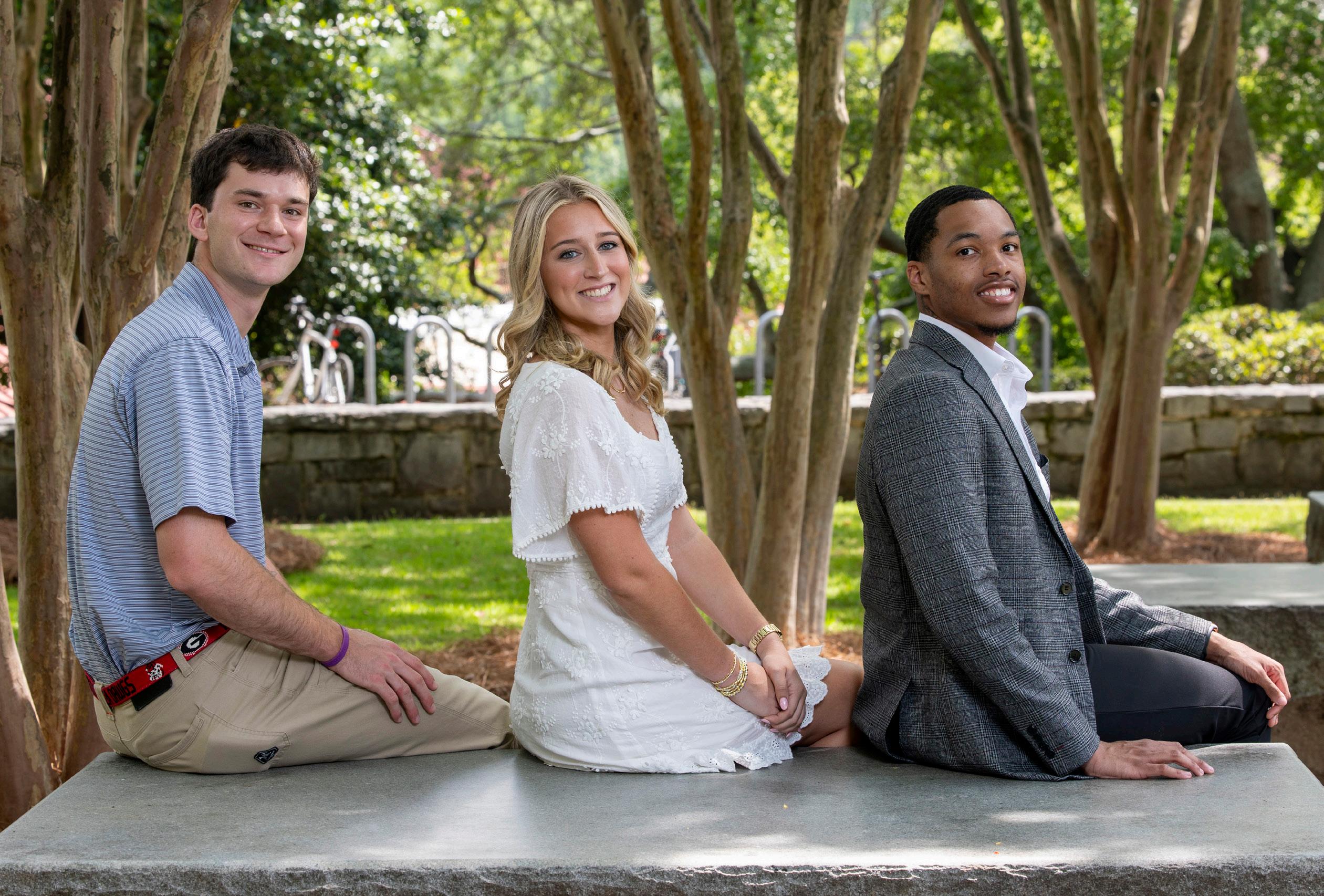
A Culture of Care
UGA’s Support Dawgs program empowers campus community members to address mental health needs.
WRITTEN BY HANNAH GALLANT
PHOTOS BY PETER FREY BFA ’94
When Grady Taylor talks with fellow students about well-being resources at the University of Georgia, he doesn’t just share what’s available. He shares his story.
As a freshman, he was struggling with a course and reached out to Student Care and Outreach staff member Alicia Talbird MSW ’12. She told him about peer tutoring resources and how to take advantage of office hours. He walked away from that experience eager to learn more about the well-being resources available to students.
Now a fourth-year economics major, Taylor tells his story to peers and has found that his openness encourages them to seek support when they need it. “Resources are abundant at UGA, and someone’s door is always open if you’re willing to reach out,” he says.
Taylor is one of many UGA students, faculty, and staff who have completed the Support Dawgs certification, a three-part training program that’s transforming how the UGA community approaches mental health and well-being—not just in crises but in everyday conversations across campus.
Offered by Student Care and Outreach, part of UGA’s Wellbeing Resources within the Division of Student Affairs, the
program trains the UGA community to identify, understand, and respond to mental health problems and crises, including anxiety disorders, trauma, and depression. It also focuses on sexual assault awareness and prevention, and in-depth coverage of the well-being resources and support offered at UGA. More than 1,230 students representing over 58 student organizations have begun the training along with nearly 500 faculty and staff.
“We usually only talk about mental health when someone’s in crisis,” says Carrie Smith PhD ’18, director of Student Care and Outreach at UGA and one of the program’s founders. “But now we’re seeing students proactively engage with resources prior to crisis.”
The shift from crisis response to proactive support reflects UGA’s broader institutional commitment to promoting well-being as a cornerstone of student success.
“Well-being isn’t just a buzzword at UGA. It’s central to everything we do for faculty, staff, and students,” says Beau Seagraves PhD ’11, associate vice president for student well-being. “Through Support Dawgs, we’re all gaining essential tools and information to better understand our students and connect them with the comprehensive support systems that we offer.”
From left, UGA students Boon Elliott, Emily Waldman, and Grady Taylor use what they’ve learned from the Support Dawgs training to help their peers.
Listening to Student Voices
In 2021, the University System of Georgia launched a mental health initiative that provided mini-grants, which helped fund the creation of the Support Dawgs program.
When developing the program, Smith and her team, including community of care coordinators Julia Buwick MEd ’18 and Talbird, custom built the training resources to include case studies and formats informed by listening sessions with UGA students. They met with student leaders and student groups to hear what kind of mental health struggles their communities were facing.
Since its launch in 2024, the program has expanded as the Student Care and Outreach staff conduct customized training with student groups and partners across campus, including the Fontaine Center and the Office of Learning and Development within University Human Resources.
It has paid off.
Smith has observed a cultural shift— from reactive crisis response to students intentionally fostering community and belonging by sharing their struggles, seeking help, and prioritizing self-care.
When Smith and her staff first began training students, she would ask them what came to mind when they heard the term mental health. And the answers usually centered on the bad.
Anxiety. Depression. Constant mental health struggles.
“Everything you’ve said is a deficit,” Smith and her team would tell the students. “You haven’t talked about how you’re well.”
Now, when they ask that question, students focus on the good: how they care for themselves, how they support their friends, and how they build habits into their daily routines that support their well-being.
The training continues to expand into new areas of campus including University Housing and the Ramsey Student Center.
Victoria Gathings, coordinator for residential education and belonging in University Housing, worked with Student Care and Outreach to bring Support Dawgs training to student staff in University Housing.
“Both offices really had a vision to get students this information so they can better support students because there’s nothing like peer-to-peer mentorship,” Gathings says.
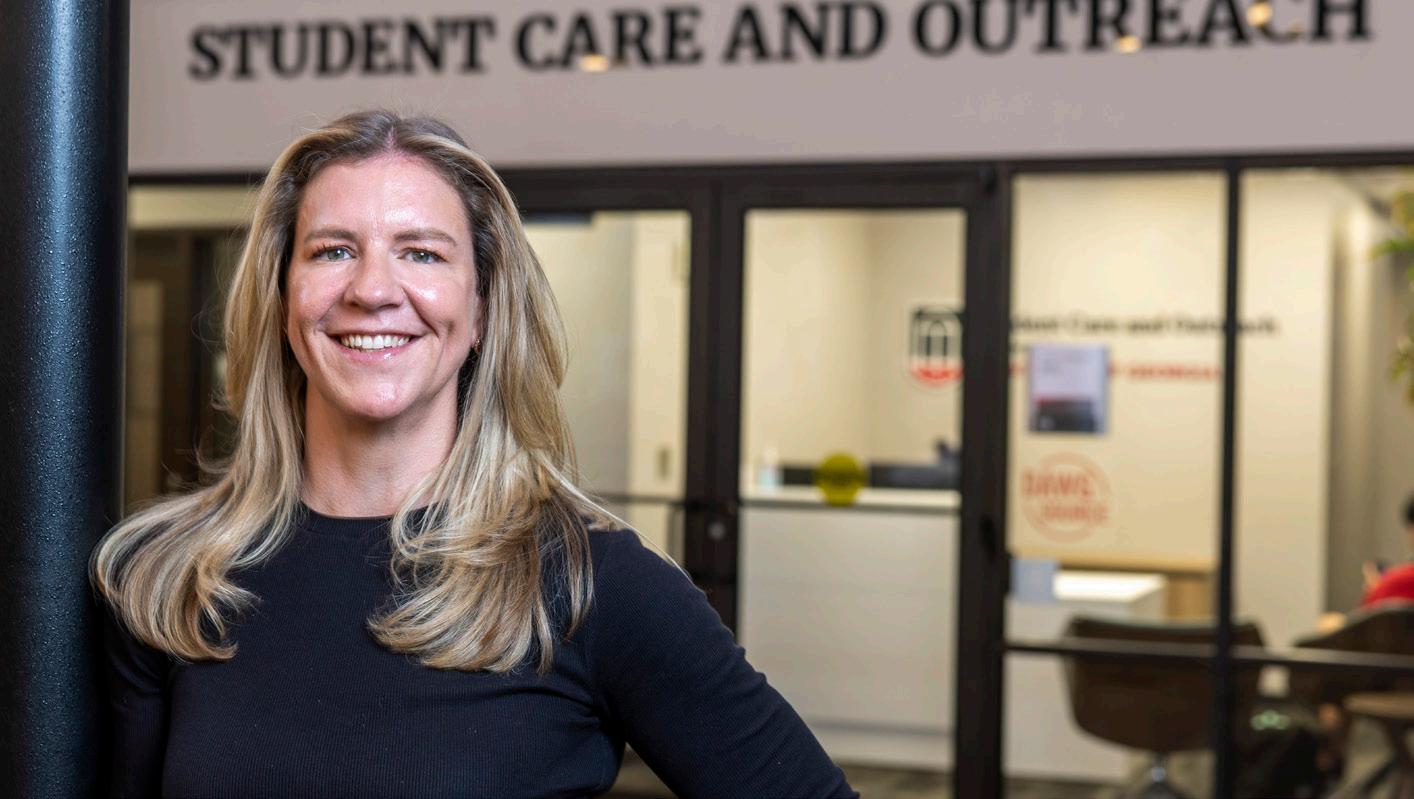
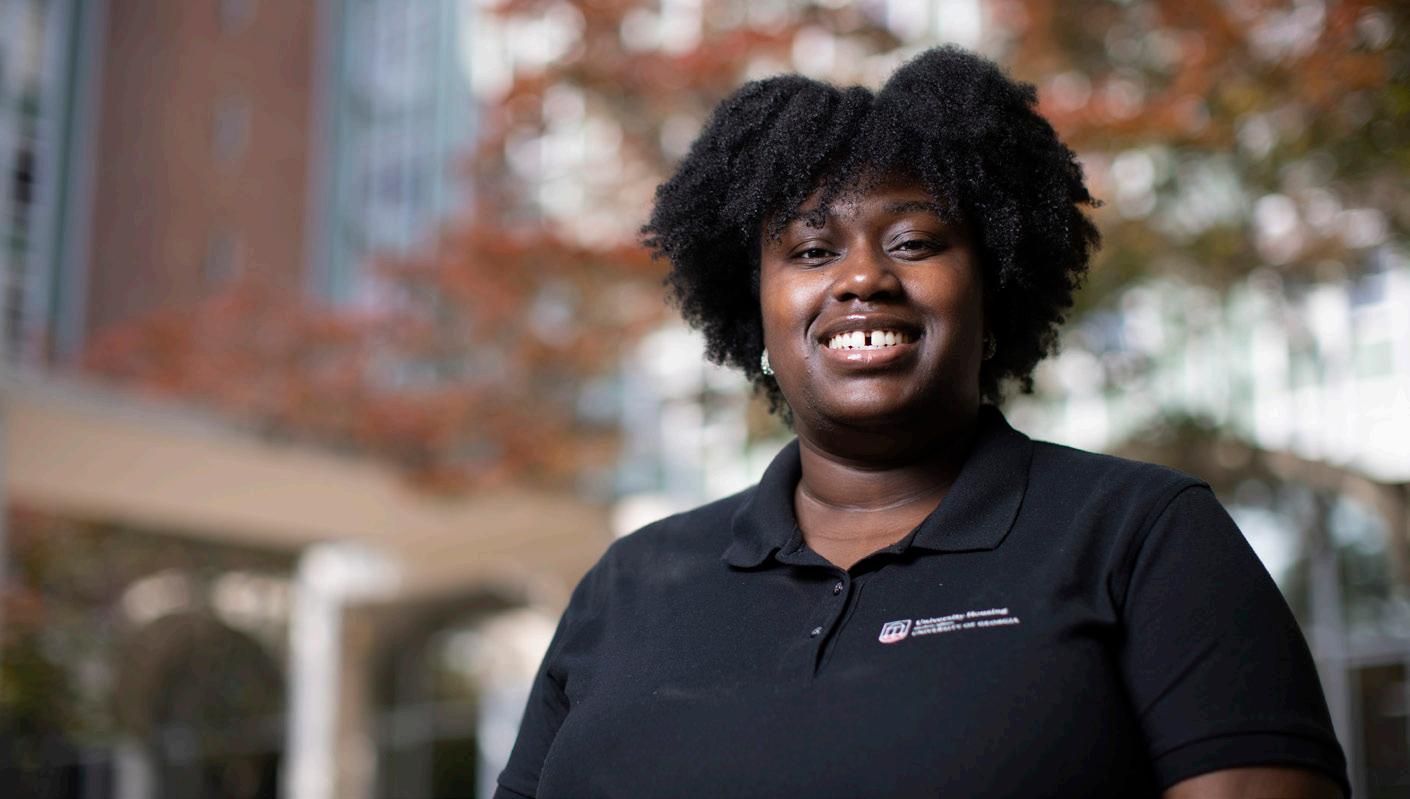
From Learning to Leading
The Support Dawgs program has changed how students interact with their peers and take care of their own mental health.
“Support Dawgs helps students figure out how to navigate being a young adult in a fast-paced and pressured world and how to live like that and be successful while also taking care of themselves,” says Boon Elliott, a fourth-year finance major. His Support Dawg training equipped him with the tools to look after people in his circle.
Emily Waldman BS ’25, a first-year master’s student in social work and a spring graduate, used what she learned from Support Dawgs to create an 80-page document of resources for her Delta Zeta sorority sisters that she also shared with Student Care and Outreach staff.
“You don’t just learn on your own or develop on your own, and that’s why these programs are very important,” she says.
As the Support Dawgs program expands across campus, Smith and her team are building something larger than a training program. They’re cultivating a campus community that views mental health support as a shared responsibility.
Whether it’s a residence hall conversation, a pre-class check-in, or a formal peer mentoring session, Support Dawgs are demonstrating that a culture of care isn’t just an ideal. It’s an everyday practice. GM

Victoria Gathings coordinates training and support for students in University Housing.
Carrie Smith, director of Student Care and Outreach, encourages students to think outside the box about how they care for themselves.
The Most Important Medical Job You’ve
Never Heard Of
With the goal of making health care a little less scary for the most vulnerable patients, UGA’s child life program celebrates 30 years.
WRITTEN BY LEIGH HATAWAY MA ’17
Growing up, Nathaniel Patton wasn’t sure why his sisters got most of his parents’ attention.
“It was always like, ‘Oh, we can’t do that because Madeleine’s sick’ or ‘Valerie has an appointment,’” he says. “It was really confusing, and there was a little bit of resentment there.”
Patton MS ’20 didn’t know his sisters were sick. Really sick.
He spent most of his young life in hospitals, visiting them, attending doctor’s
appointments with his sisters and his parents, and getting to know the health care system far better than any child should.
When his sisters passed and he grew up, Patton began to recognize how traumatic these experiences had been. And he also realized that he didn’t want other children to go through similar trauma alone.
Patton was working at Camp Twin Lakes, a nonprofit that offers year-round programs for children and families facing serious illnesses, disabilities, and life challenges,
when he first heard about the University of Georgia’s child life graduate program.
Housed in the College of Family and Consumer Sciences (FACS), the program prepares students to fill a unique—but incredibly important—role in health care settings.
“There’s kind of a joke in child life that you don’t know it exists as a field until you’ve been forced into interacting with it,” Patton says. “And that’s usually not a fun introduction.”
“There’s kind of a joke in child life that you don’t know it exists as a field until you’ve been forced into interacting with it, and that’s usually not a fun introduction.”
NATHANIEL PATTON, CERTIFIED CHILD LIFE SPECIALIST AND UGA ALUMNUS, INOVA CHILDREN'S HOSPITAL, FAIRFAX, VIRGINIA
What are Child Life Specialists?
Child life specialists “in both health care and community settings … help infants, children, youth, and families cope with the stress and uncertainty of acute and chronic illness, injury, trauma, disability, loss, and bereavement,” according to the Association of Child Life Professionals.
Child life specialists are there when things get hard, with the goal of making the process just a little bit easier on children and families who find themselves in hospitals, doctor’s offices, and sometimes even funeral homes.
For Patton, having someone like that explain what was going on with his sisters would’ve made all the difference.
“One thing I always do is try to include siblings, especially when we have kids who are chronically ill or maybe can’t do things for themselves,” says Patton, who now works as a certified child life specialist at Inova Children’s Hospital in Fairfax, Virginia. “Asking if they want to help pick the color Band-Aid their sibling gets flips the whole script. They feel like they are part of this care team.”
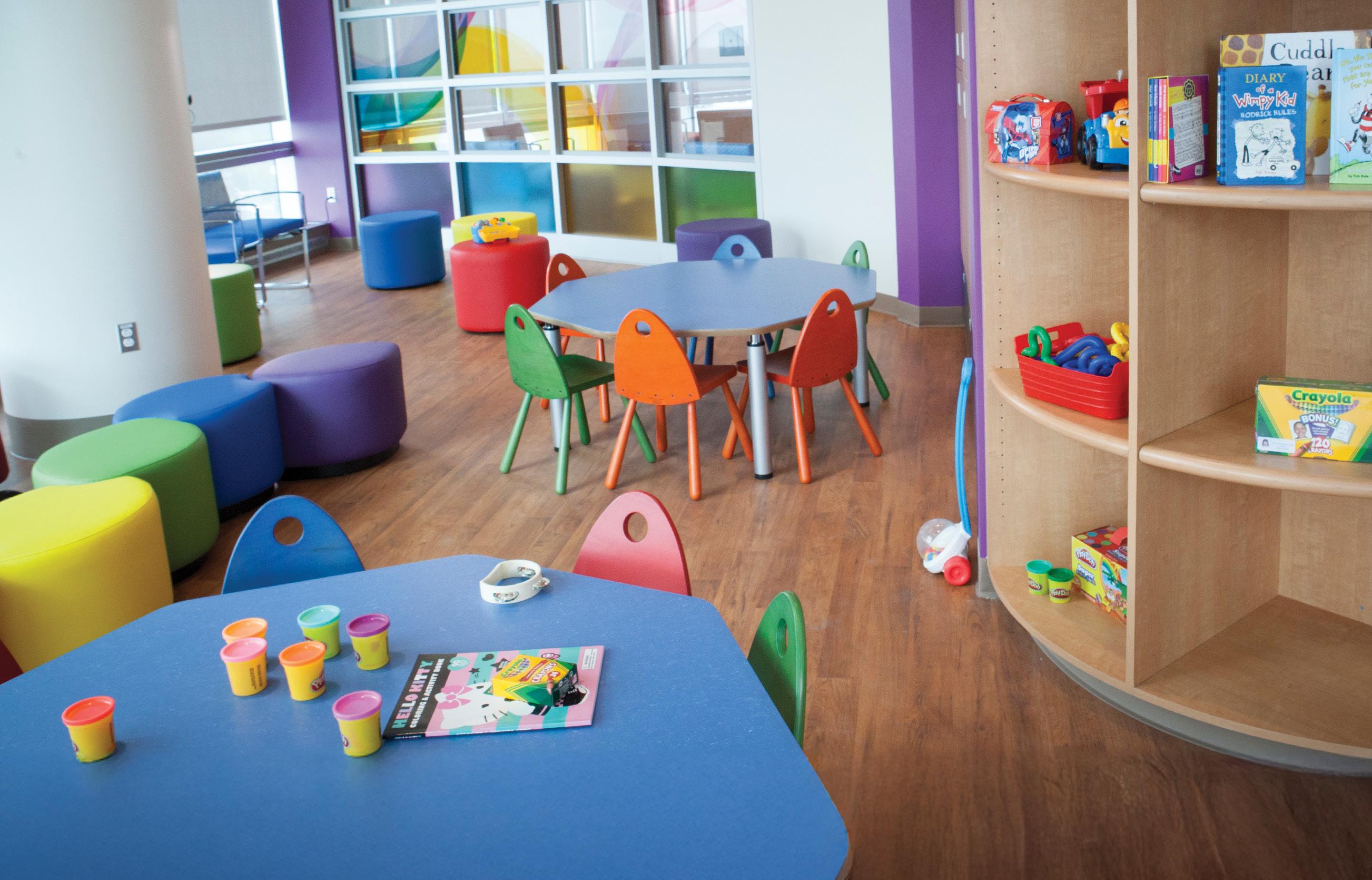
Playing with Purpose
This year, FACS celebrates 30 years of its joint child life program with Augusta University.
In addition to earning a bachelor’s degree in human development and family science with an emphasis in child life, undergrads in the program also complete all the necessary coursework and clinical requirements to take the child life certification exam. And they spend 600 hours interning at Wellstar Children’s Hospital of Georgia in Augusta.
“What students are getting out of this partnership is almost full-time clinical experience,” says Diane Bales, director of the child life program at UGA. “They experience all different areas of the hospital, rotating under multiple child life specialists.”
Child life internships are extremely competitive, and this partnership gives UGA students a leg up by building experiential learning into the course requirements.
Bales also leads the master’s program in child life, which includes a 100-hour practicum, shadowing child life specialists in the field at Children’s Healthcare of Atlanta and several other facilities.
Although she fell into the specialty by accident, filling a void when the previous child life program director at UGA retired, Bales already knew its value.
When Bales was 3, she was hospitalized with a ruptured appendix.
“There was a nice lady who brought me toys and took me down to the playroom,” Bales remembers. “I was in one of the hospitals that originated child life, and I suspect that she was an early child life specialist that I had.”
But it’s not all toys, games, and play time.
“My education is in play theory, family systems theory, grief and loss theory, and child development,” says Sydney Beene MS ’22, who graduated from the program and now works as a certified child life specialist at Duke University Health System. “I combine all of those with a major understanding of the nuances of hospitalization to be able to support kids and families through some of the hardest days of their lives.”
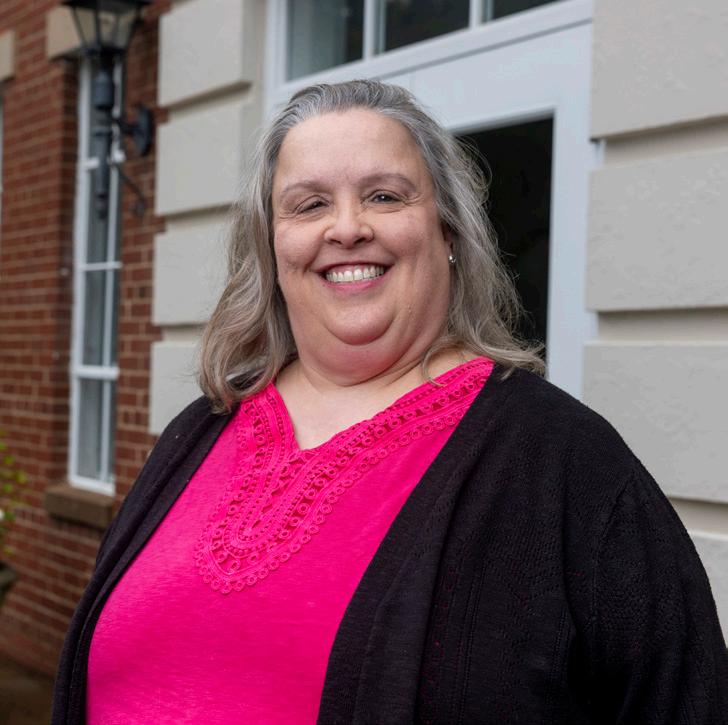
Inova Children’s Hospital offers a variety of toys and activities to make young patients feel more comfortable in a frequently uncomfortable setting.
PETERFREY
Diane Bales leads UGA’s child life program.
Nathaniel Patton knows firsthand what it’s like to be a scared child in a health care setting, and he’s determined to make it a little less intimidating for future generations.
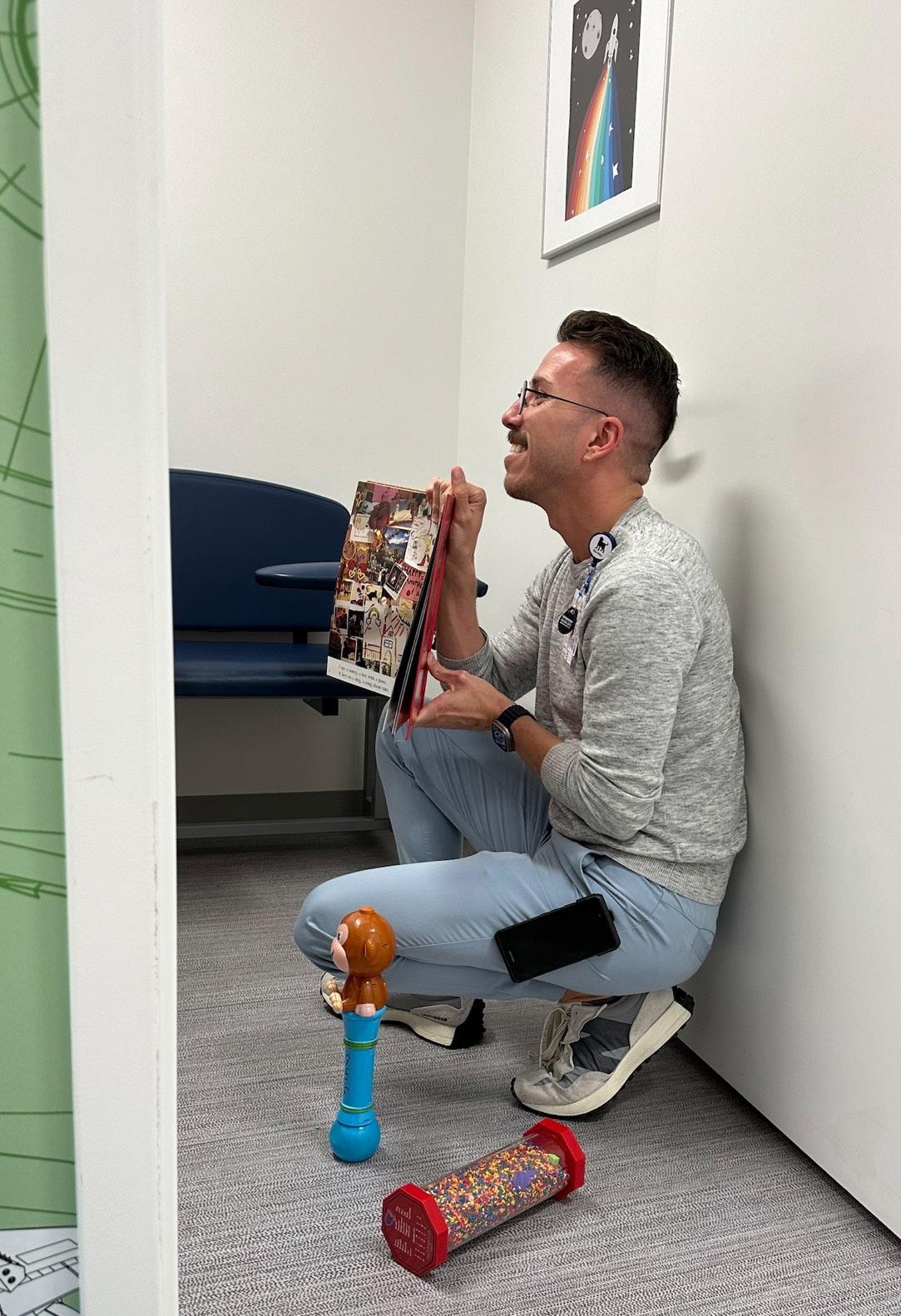
A Hand to Hold. A Neck to Hug.
Child life specialists enter a heavy but incredibly rewarding field.
“I have potential students who come to me and say, ‘I just love kids, and I love playing with kids. I think I should be a child life specialist,’” Bales says. “One of my jobs is saying, ‘That’s great. But are you prepared to have a child throw up on you? Are you prepared to sit next to a child who’s had their arm amputated in an accident and get them through that while the doctors examine them? Are you prepared to sit and hold a child’s hand when they die?’”
For some like Patton, that answer was yes.
During his time in the emergency department at Children’s Hospital of Philadelphia, Patton and one other child life specialist responded to every single death in the hospital after 5 p.m.
They offered grieving families hand molds or prints, locks of hair, and recordings of the last heartbeats of their deceased loved ones.
Patton lost count of the number of bear hugs he’s been wrapped into, often followed
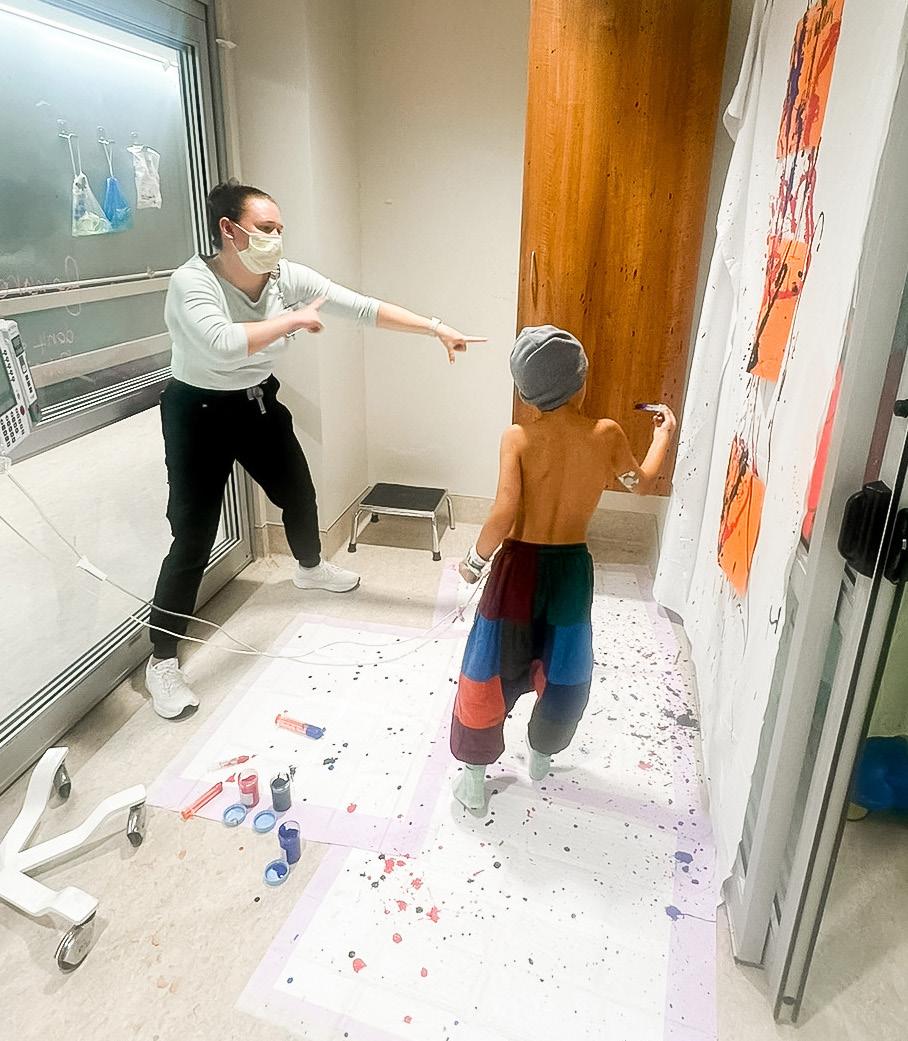
by a family member saying, “We don’t know how to do this.”
And that’s where it comes full circle for Patton.
“Having lost my sisters and not having that kind of support, we were lost,” he says. “There is no playbook on grieving and loss, but being able to provide that support, that guidance, it’s an honor.
“I remember every face. I remember every single name.”
One little girl in particular stands out.
She has a rare genetic disorder, and the prognosis isn’t good. Her parents were scared. So was she.
During Patton’s first meeting with the family, the girl silently hid behind mom and dad and understandably freaked out when the doctors needed to draw blood.
“She wanted absolutely nothing to do with me,” Patton remembers. “I was like, ‘That’s totally fine.’ We validate that choice.”
When she came back the next week for more tests, Patton tried again.
No dice.
But slowly, as she returned every week, she started opening up. “Yes, we can color together.” “Yes, we can play and watch Bluey together.”
“Then one day she came in, and she jumped into my arms,” Patton says. “It was just that light bulb moment. Mom told me, ‘She couldn’t wait to come back, and she wanted to pick the pink Play-Doh.’”
The little girl finally felt safe.
“When that little girl comes into the hospital, she even says it. ‘I’m safe here.’”
And she is. Her condition is improving too. She’s getting better.
The little girl is 5 now, and Patton still sees her as the hospital staff manages her condition. She’s gone from weekly infusions to monthly ones.
They don’t watch Bluey anymore, though. And they no longer use numbing spray before her blood draws. Now, the two just chit chat. GM

Sydney Beene, a certified child life specialist at Duke University Health System, uses syringes to paint with a patient. This activity makes the regularly used hospital tool a little less scary.
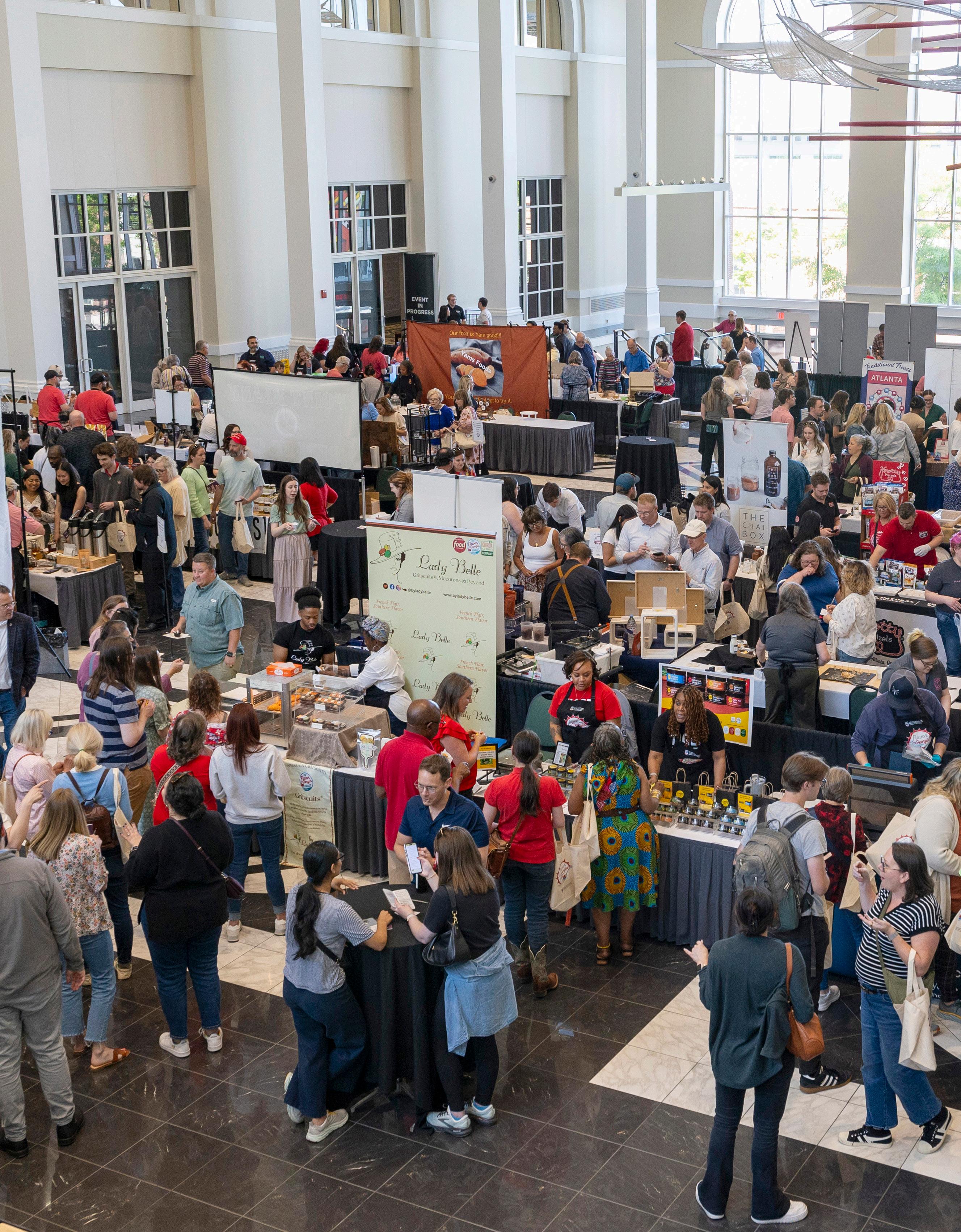
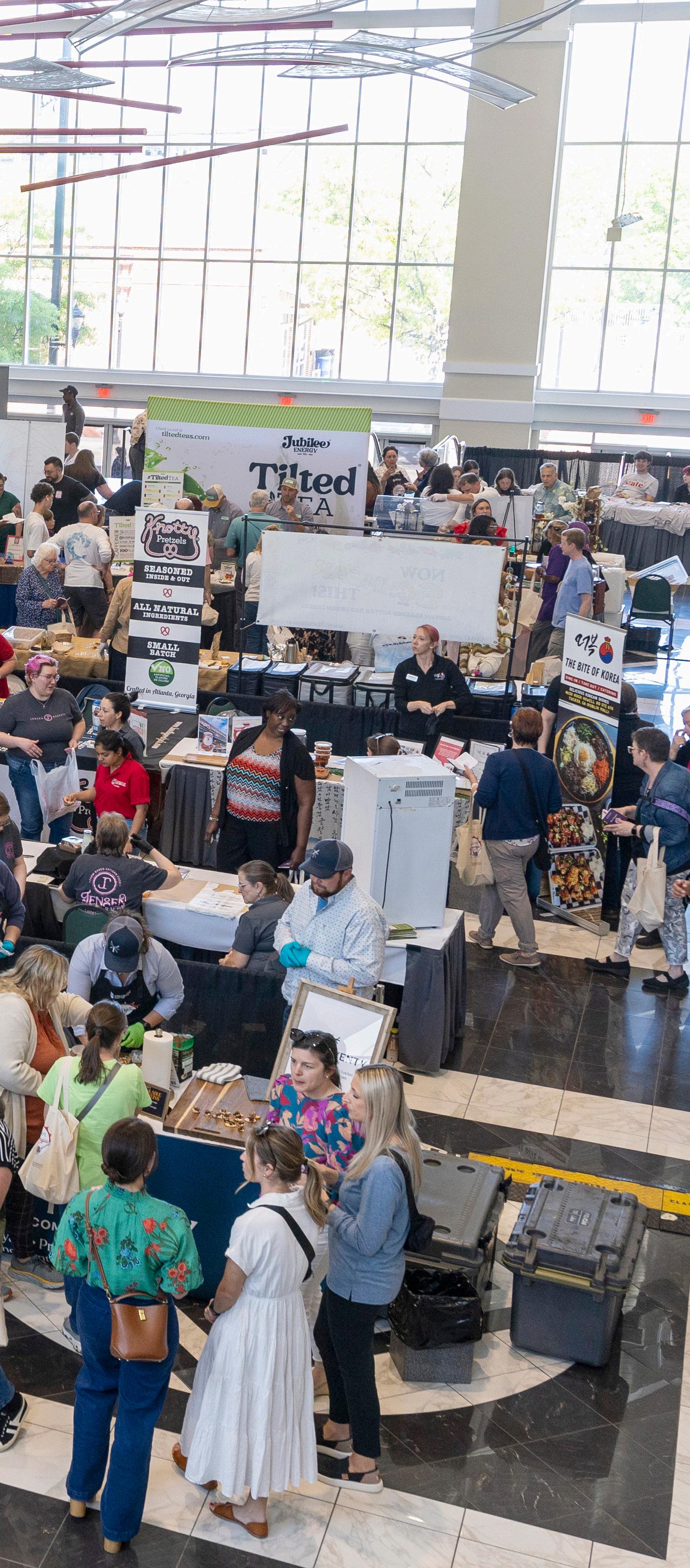
The Taste of Success
UGA’s Flavor of Georgia competition brings together food innovation and old-fashioned entrepreneurship.
WRITTEN BY COLE SOSEBEE BSA ’19, MA ’25
The Flavor of Georgia competition, hosted by the University of Georgia College of Agricultural and Environmental Sciences, has been a launching pad for local food entrepreneurs since 2007. It’s where recipes passed down through generations—or born in late-night kitchen huddles—claim the spotlight, helping small Georgia-based businesses gain traction in a competitive market.
Although trophies and titles are coveted, the contest is about much more than that. Flavor of Georgia is an annual chance for makers across the state to share their products, gain feedback, and build valuable relationships with consumers, distributors, and fellow food innovators.
In 2025, Flavor of Georgia once again opened its doors to the public with a new event: Savor the State, a tasting experience that brought together food fans, families, and flavor fanatics of all kinds.
“Our mission with Flavor of Georgia is simple,” said Manpreet Singh, department head and professor of food science and technology. “We aim to showcase the ingenuity of Georgia’s food entrepreneurs and small business owners, and Savor the State is the real-life embodiment of our goals behind this competition.”
A feast for the senses, Savor the State draws a hungry crowd to the Classic Center for Georgia’s tastiest competition yet.
Savor the State
On April 17, the scents of barbecue sauce, lemon zest, and fresh-baked goods rolled through the grand halls of The Classic Center in downtown Athens, signaling the return of Flavor of Georgia’s muchanticipated finale. Passport-style tasting cards in hand, attendees wound their way through rows of vendor booths offering everything from small-batch jams and spicy sauces to artisan cheeses and handmade pound cakes. With every bite, they scribbled flavor notes.
“Cinnamon-forward.” “Bright heat.” “Surprisingly creamy.”
Guests thoughtfully filled the pages of their tasting guide before casting votes for the coveted People’s Choice award.
With informative demos and inspiring conversations between curious guests and proud producers happening at nearly every booth, the sense of pride for all the work that goes into these passionate livelihoods was clear. For many of these small business owners, this was their biggest audience, filled with decision-makers and devoted food lovers alike.
Even UGA President Jere W. Morehead JD ’80 joined in the feast, touring the tasting floor to sample Georgia- and alumni-made products. His presence served as a reminder of UGA’s role in nurturing food entrepreneurs from idea to enterprise and was a moment of pride for vendors with UGA ties.
The event was more than a showcase. It was a sensory tour of Georgia’s food future—and a celebration of the people, places, and passion driving it forward.
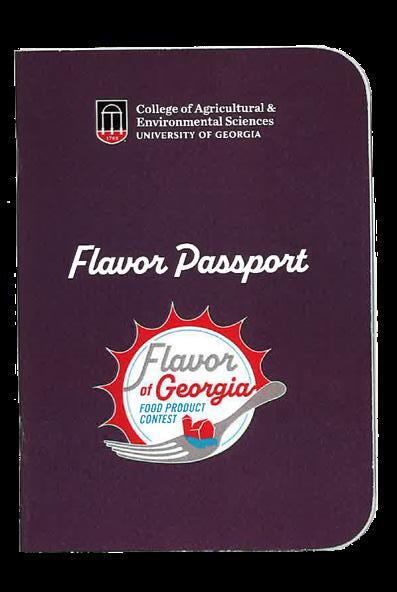
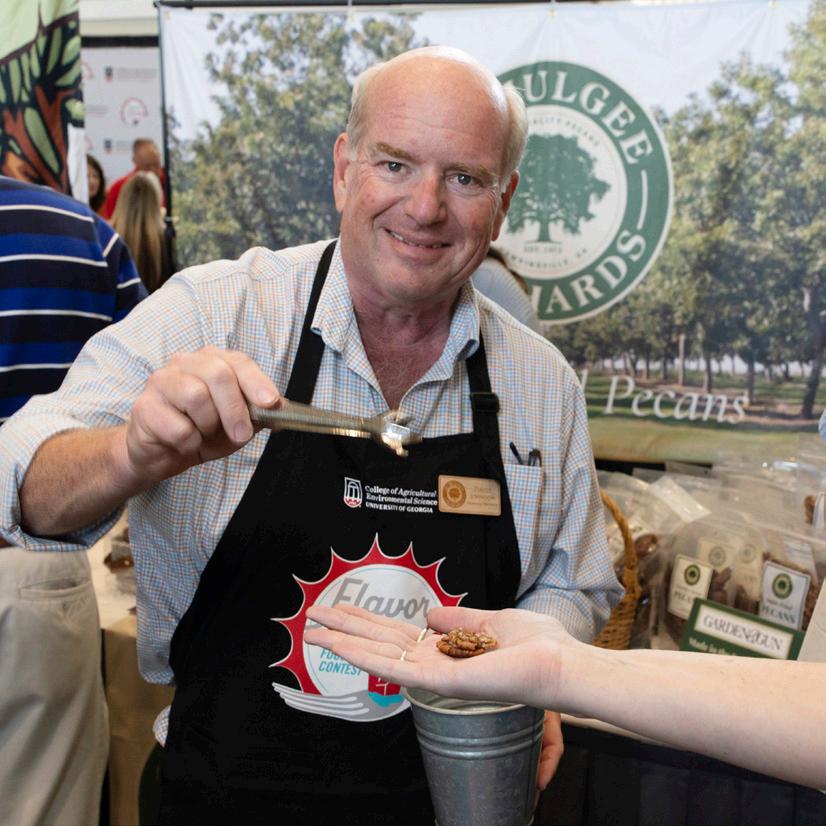
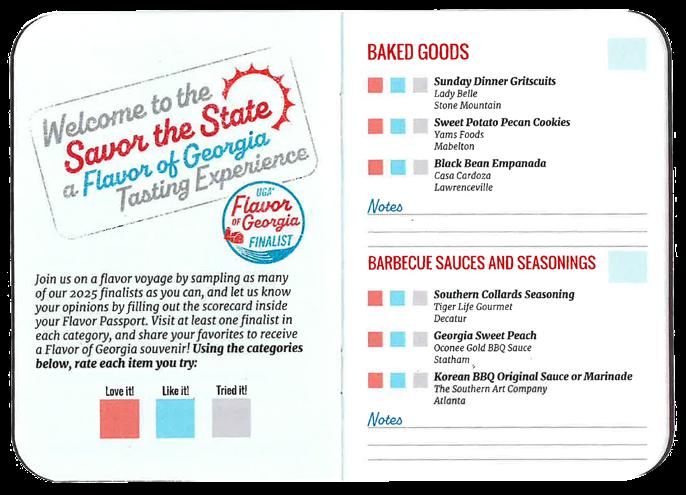
Left: David Johnson is one of the owners of Ocmulgee Orchards, which took home the People’s Choice award with a sweet Southern crowd-pleaser: sugar-fried pecans.
Below: Vendors and tasters connect over bold bites and hometown flavors, each sample a small glimpse into Georgia’s rich food culture.
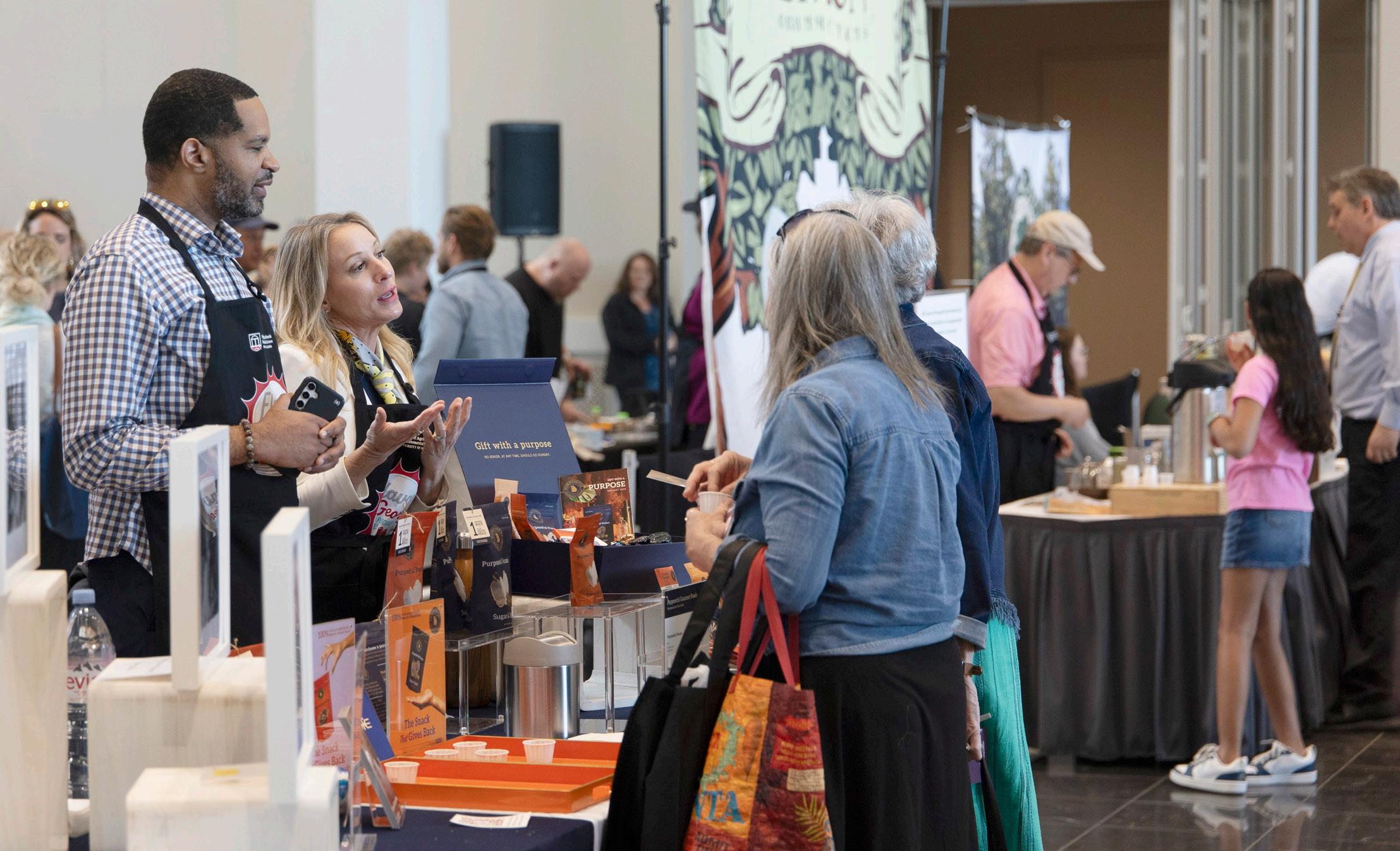
PETERFREY
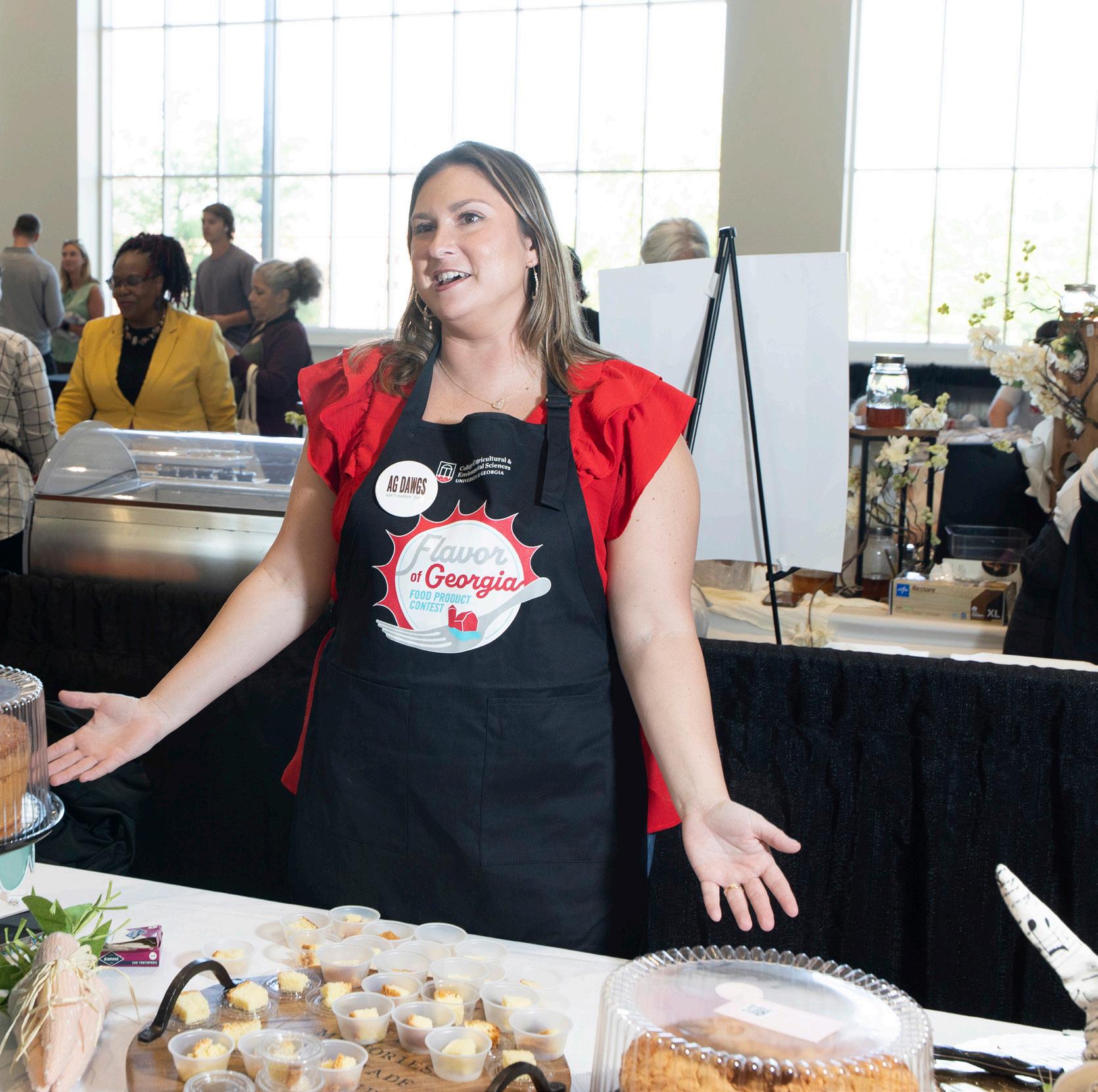
The Rookies
Natalie’s Baked Goods
Natalie Hall BSA ’22 didn’t plan on launching a bakery. But after losing her job during the pandemic, she returned to her roots with family recipes including her signature pound cake. With the perfect balance of moist, dense texture and impactful flavor, her signature pound cake was a standout hit of the 2025 tasting event.
Her story embodies the resilience that Flavor of Georgia often highlights: personal pivots that lead to passion projects with purpose. For Natalie, the contest was also a homecoming to bring her product back to Athens, where her journey started.
“Back in college, my boyfriend—now my husband—and his roommates were
Left: Natalie Hall’s handcrafted pound cakes blend family tradition with fresh ambition, each slice a sweet step in her small business journey.
owners Drew Buckner (left) and Craig Garvin won the Beverage category. Their Tilted Tea taps into the growing trend of functional beverages: drinks designed to offer more than hydration, with ingredients aimed at boosting energy or wellness.

Tilted Tea
basically my unofficial taste-testers,” Hall laughed. “Anytime I had a baking itch or a cancellation, I’d send over pound cake or something new I was experimenting with. They’d joke I was the reason they needed gym memberships! My own roommates didn’t mind either. Our apartment always smelled amazing, and they liked to say I used the oven more than both of them combined.”
Tilted Tea, a beverage startup tapping into the booming trend of functional drinks, also joined the competition. Their plant-based, energizing tea blend stood out for its clean flavor and sleek branding, earning them the 2025 Flavor of Georgia Beverage category win.
Despite being first-time entrants, the team behind Tilted Tea came in with a clear strategy to connect with conscious consumers looking for something refreshing yet purposeful. They wanted a product that was genuine and simple, 100% natural, healthy, and enjoyable. Flavor of Georgia offered a platform not just for exposure but also for learning what resonates.
Below: Jubilee Energy Company
PETERFREY
PETER FREY
The Veterans
White Oak Pastures
Will Harris BSA ’76 has transformed his family’s Bluffton farm into a nationally recognized model for regenerative agriculture. Under his leadership, White Oak Pastures has shifted from conventional methods to a vertically integrated, zerowaste operation that prioritizes humane animal management and environmental stewardship.
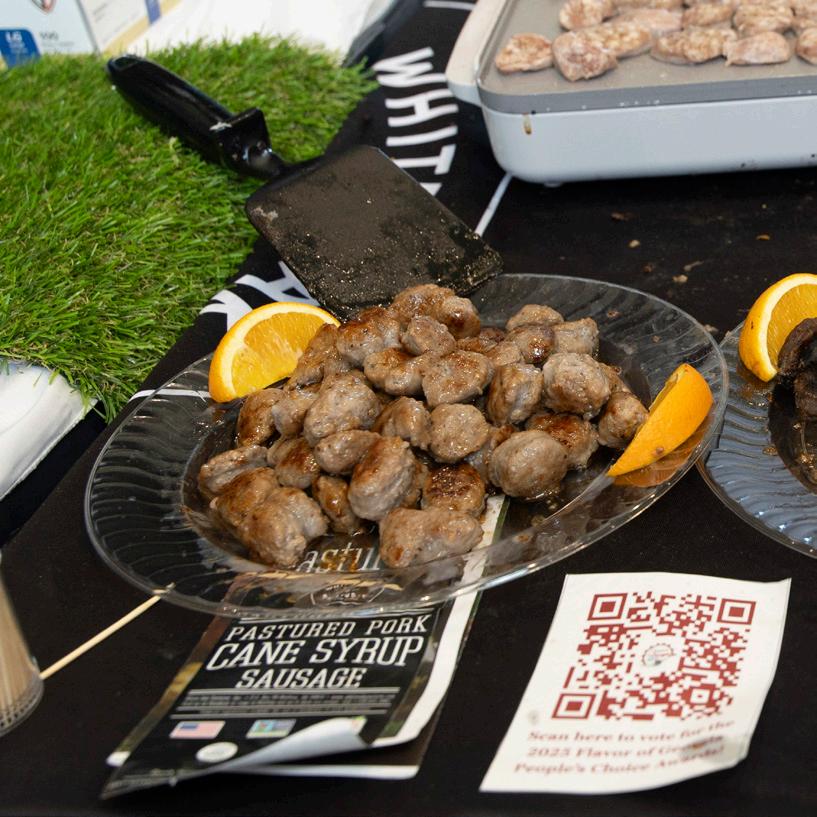
This year, the farm took home a win in the Meat & Seafood category with their Pastured Pork Cane Syrup Sausage, a sweet, vintage-inspired breakfast sausage made from Georgia-raised pork and infused with cane syrup for a nostalgic Southern twist. With simple, high-quality ingredients, the product reflects the farm’s mission to honor tradition while pushing sustainable food forward.
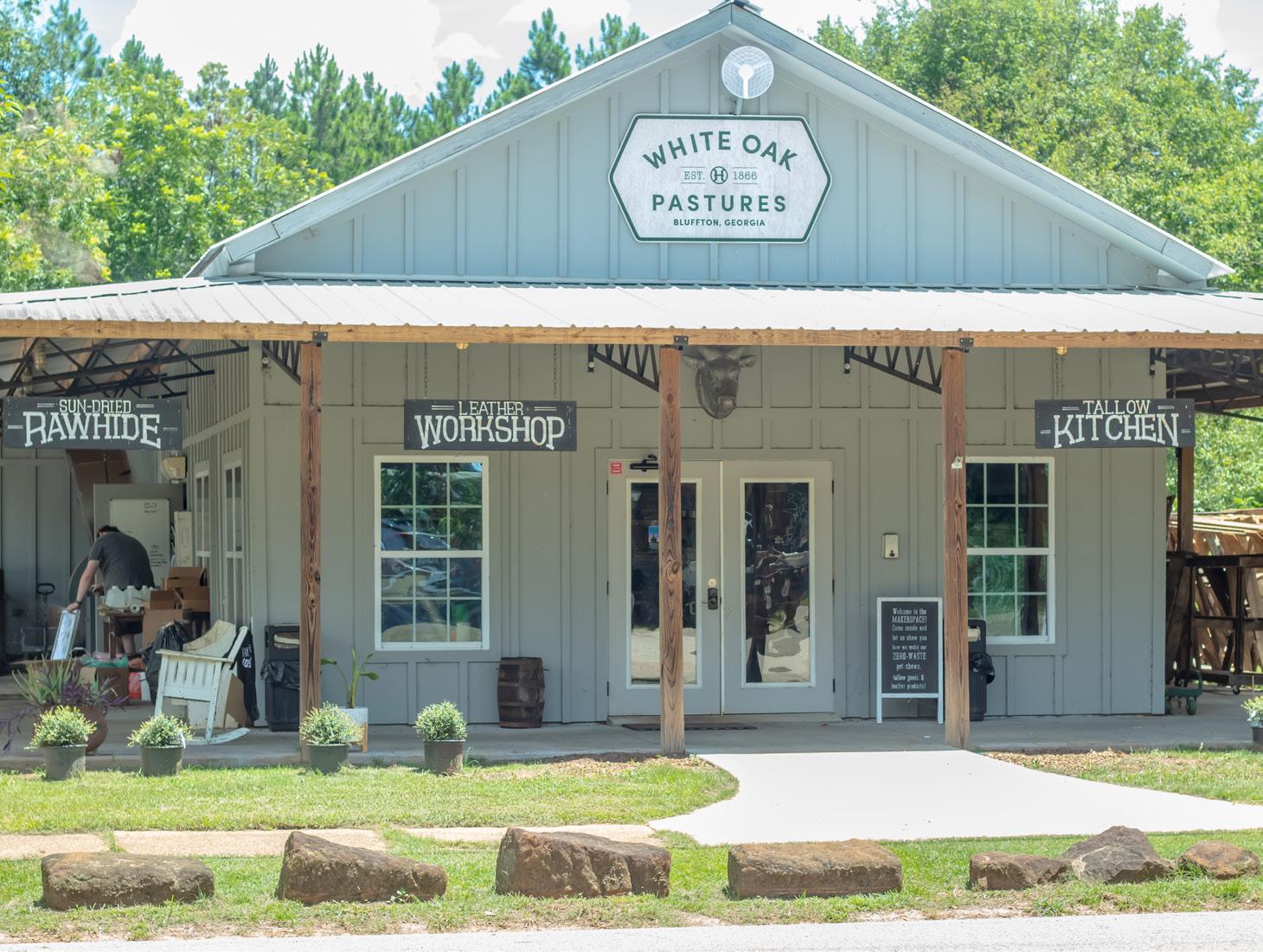
and craftsmanship
Sweet Grass Dairy
Though they’ve competed before without winning a title, Sweet Grass Dairy returned to the 2025 competition with a standout product: Georgia Gouda, a creamy, rich cheese made from the milk of pasture-raised cows in Thomasville. The dairy was founded in 2000 by Al BSA ’79 and Desiree Wehner BSA ’81, a couple who met at UGA and moved to south Georgia to pursue sustainable agriculture. Since then, Sweet Grass has grown into a staple of the state’s artisan food scene.
Their commitment to quality continued into the next generation. In 2005, the Wehners passed the cheesemaking side of the business to their daughter, Jessica, and son-in-law, Jeremy Little. Since then, the Littles have raised four sons, opened a restaurant in downtown Thomasville, and grown Sweet Grass Dairy into a nationally recognized brand. Their cheeses have earned more than 75 awards, including this year’s Flavor of Georgia win in the Dairy category.
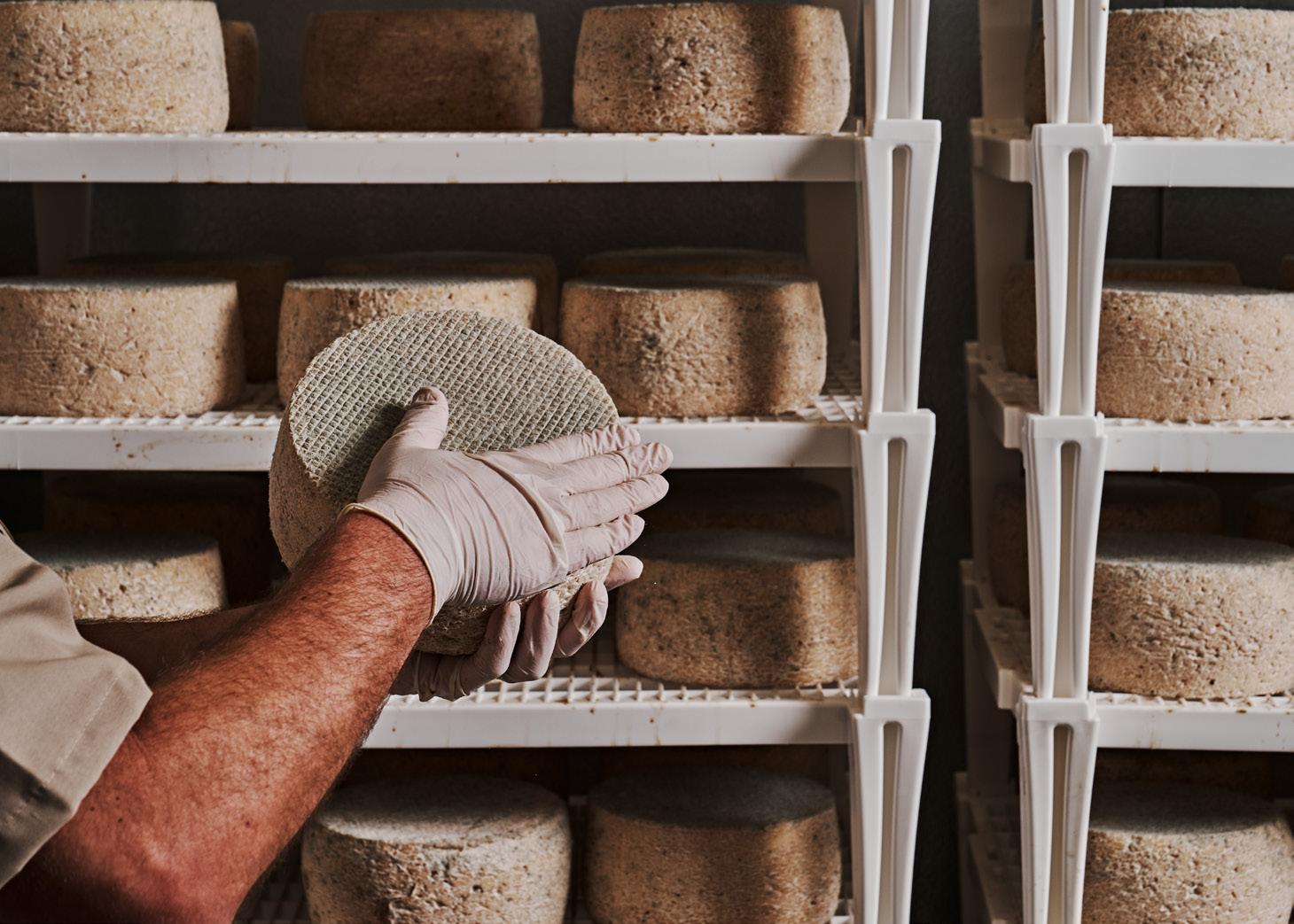
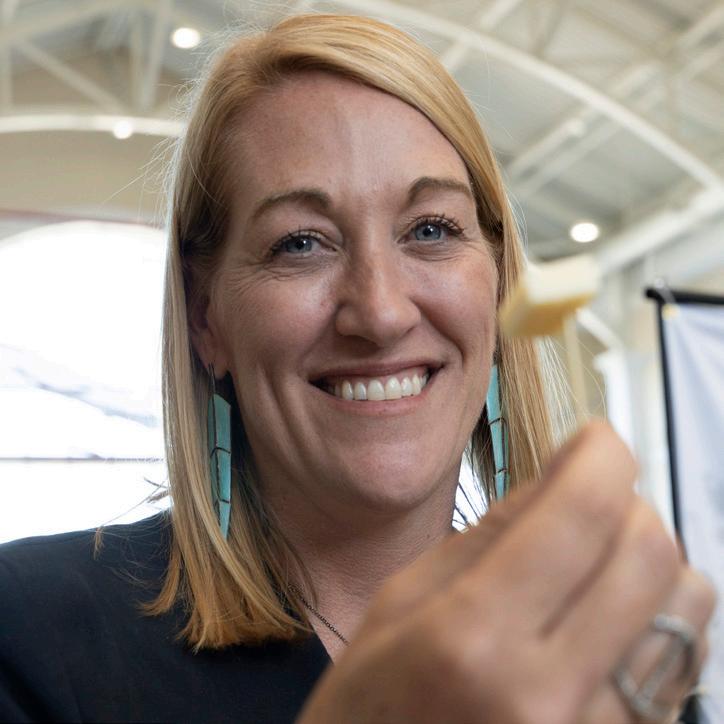
Sweet Grass Dairy showcases its commitment to quality
with Georgia Gouda, a smooth, tangy cheese made in Thomasville from pastureraised milk and decades of family expertise. Al and Desiree Wheeler, both UGA alumni, founded the dairy 25 years ago. Their daughter, Jessica Little, is now leading the business.
Bluffton-based White Oak Pastures’ cane syrup sausage (left) brings heritage flavor to the breakfast table. The dish took home a win in the Meat & Seafood category.
PETERFREY
PETERFREY
Oconee Gold BBQ Sauce
Oconee Gold BBQ Sauce made waves in 2023 with their White Gold sauce. In 2025, they returned with a new contender: Georgia Sweet Peach, a tangy, fruitforward twist that earned Oconee Gold the title in the Sauce category for the second year in a row.
The story of Oconee Gold is one steeped in smoke, family, and Southern tradition. Founder James Argo first learned the art of barbecue from his father, Big Jim, who mastered the pit in Welcome, North Carolina. After moving to Georgia at age 11, James began crafting a signature sauce that combined his Carolina roots with local flavors. What began as a sidekick to his smoked pork at cookouts and tailgates slowly built a cult following, first among friends, then neighbors, and eventually across the region.
In 2020, encouraged by friends at a pool party, Argo officially bottled and named his sauce. From mason jars sold by word of mouth to shelves in local stores, Oconee Gold quickly became a household name in barbecue circles.
For owner James Argo, this year’s repeat win validated not only the brand’s flavor chops but also its ability to keep innovating.
“Every step of this journey has been grounded in the support of my family and friends. From backyard cookouts to store shelves, their belief in what we’re building with Oconee Gold has never wavered.”
JAMES ARGO, FOUNDER OF OCONEE GOLD BBQ SAUCE

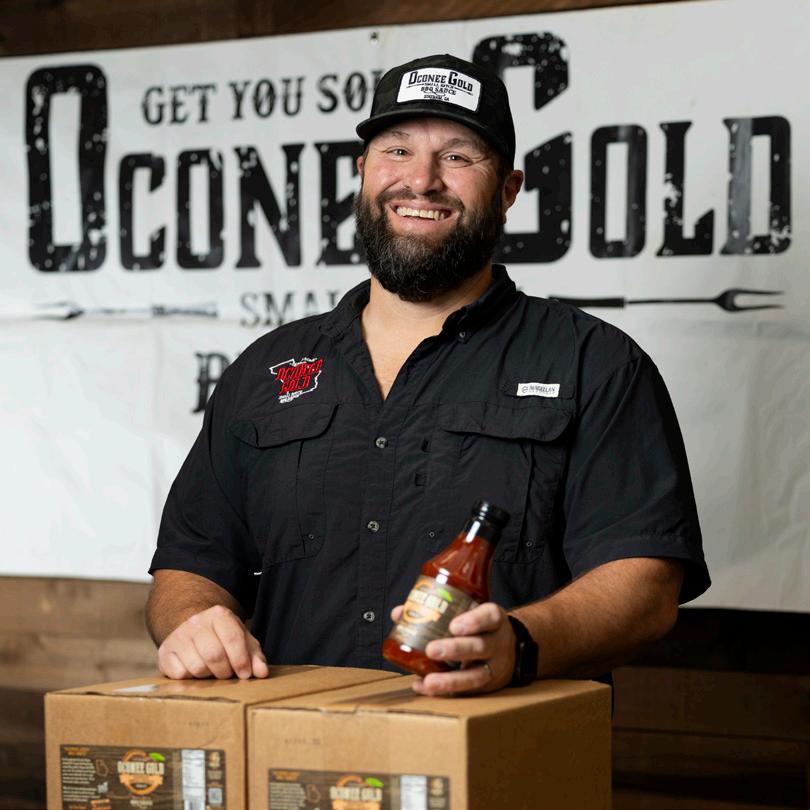
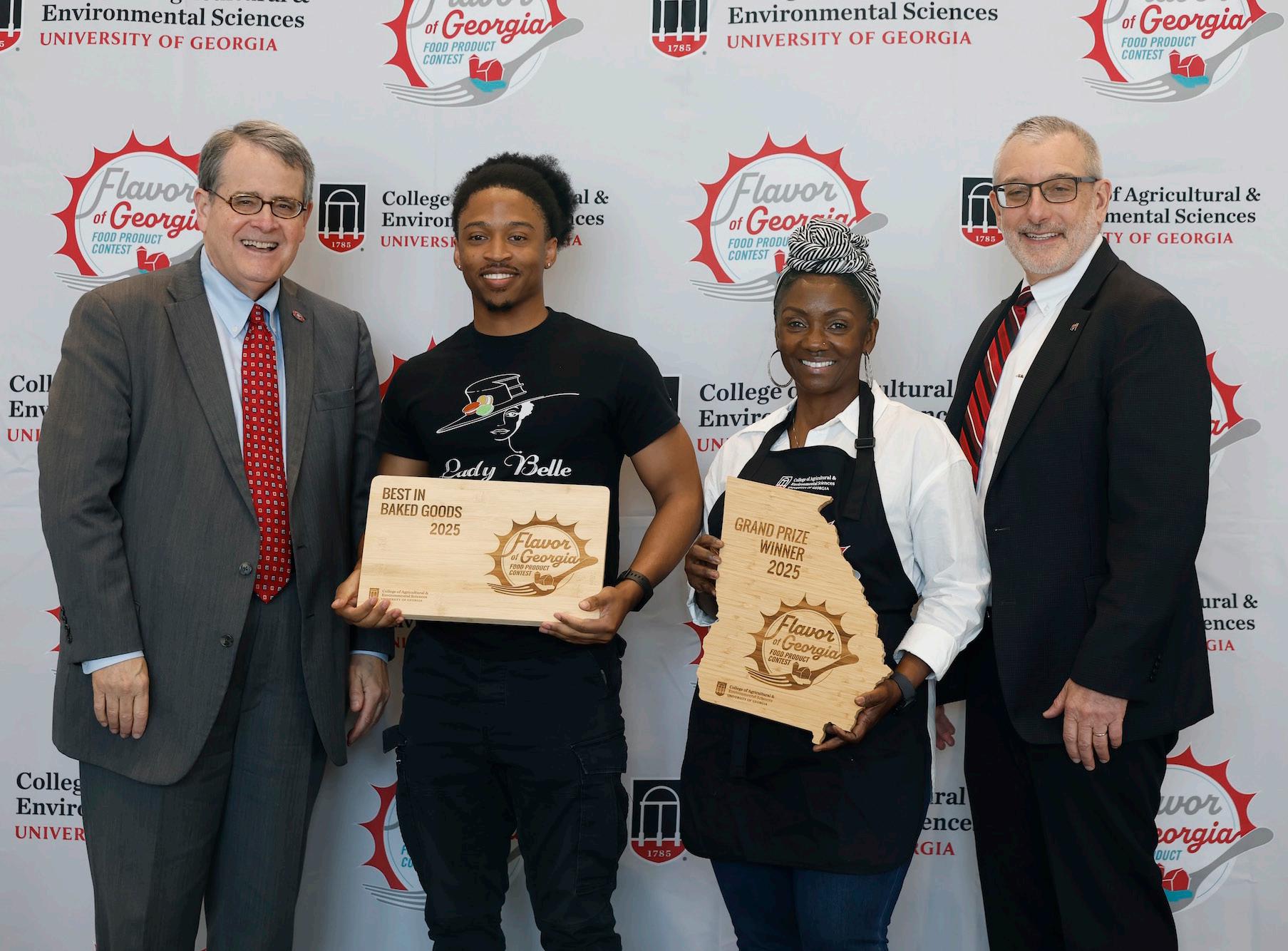
As Flavor of Georgia continues to evolve, events like Savor the State are creating new ways to connect Georgians with the products made in their own backyards. Whether you’re a first-time baker sharing a dream or a seasoned pro fine-tuning your next big product, the competition proves there’s room at the table for everyone.
“Each year, it’s inspiring to see both new and established entrepreneurs come together to celebrate Georgia’s rich agricultural and culinary landscape and to get a glimpse of the future,” says Nick T. Place, dean and director of the UGA College of Agricultural and Environmental Sciences. “We’re proud to play a role in highlighting how food not only nourishes us but connects us to our communities and to each other.” GM
Lady Belle founder Charlette Bell accepts the grand prize for her Sunday Dinner Gritscuits from UGA President Jere W. Morehead and CAES Dean Nick T. Place. Her French-Southern fusion creation—a cheese puff filled with mac and cheese grits, collards, and smoked turkey—earned top honors for flavor and creativity. Looking Forward ANDREWDAVISTUCKER
PETER FREY



Lucky DAWGS
For their Maymester adventure, a dozen UGA students explored Ireland, where they learned a lot about Irish history, culture, sports medicine, and—most importantly—a bit about themselves.
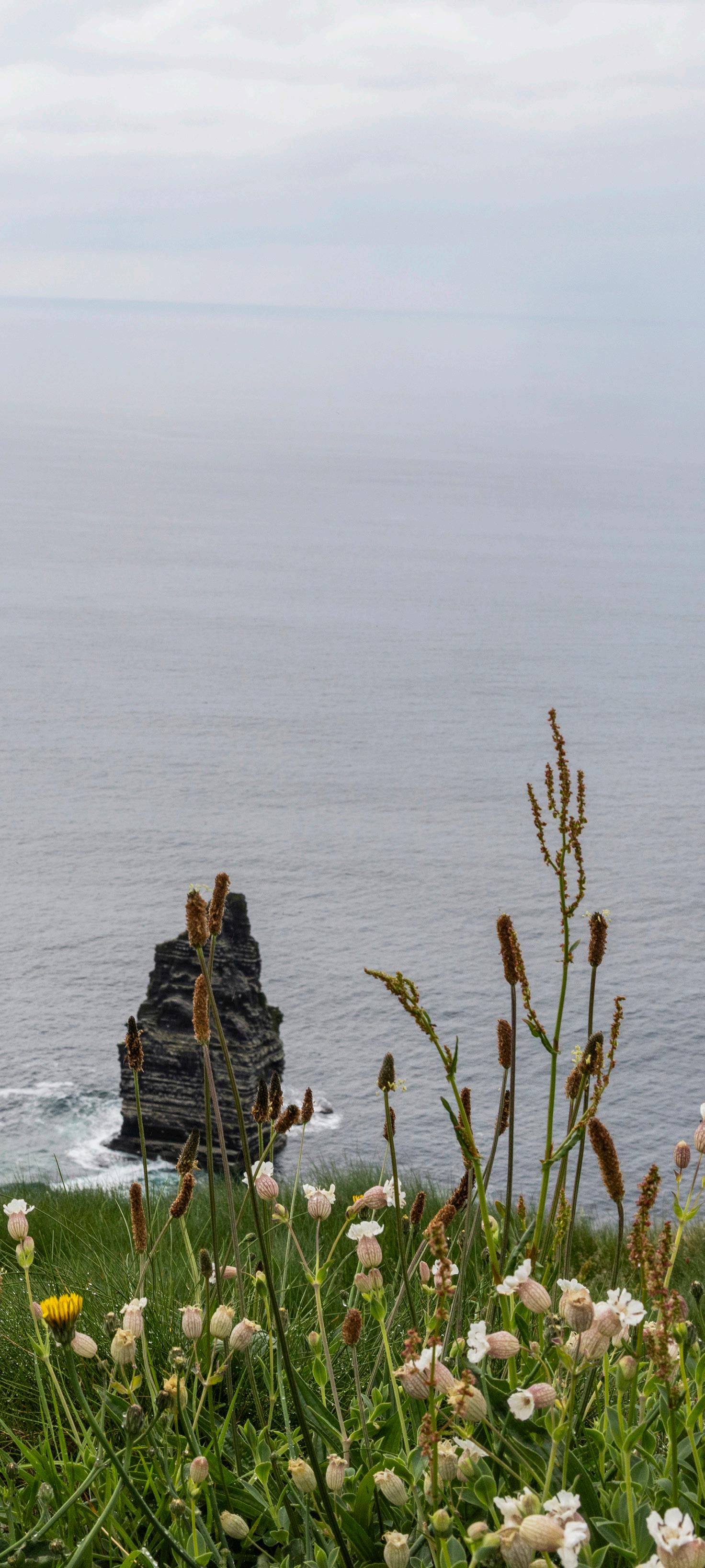
Ireland.
“It looks like a quilt with all the different shades of green,” says Anna Foster, a third-year exercise and sport science major from Macon. Foster was one of 12 University of Georgia students spending their two-week Maymester crisscrossing the Emerald Isle.
“It’s like patchwork. And it’s beautiful.”
Foster previously visited Ireland, so she knew a bit about what to expect. She’d even traveled to the Cliffs of Moher, a jewel of Ireland’s west coast and one of the Maymester’s mid-trip highlights.
The first time she saw the cliffs, the sun shone as though Moher was posing for a postcard.
On this trip, Foster and her fellow Bulldogs left a gray but dry Galway, arrived in Moher amid steady rain, and—before heading back to Dublin through a misty drizzle—watched the sun break through once more.
It was as authentically Irish as anything else they experienced.
And these students experienced a lot during UGA’s Sports Medicine and Physical Performance Maymester program in Ireland. From completely unfamiliar sports in Dublin to conversations and clinics with coaches and athletes in Galway to deep dives into Irish history and culture all over the country, this summer, UGA students’ eyes were definitely smiling.
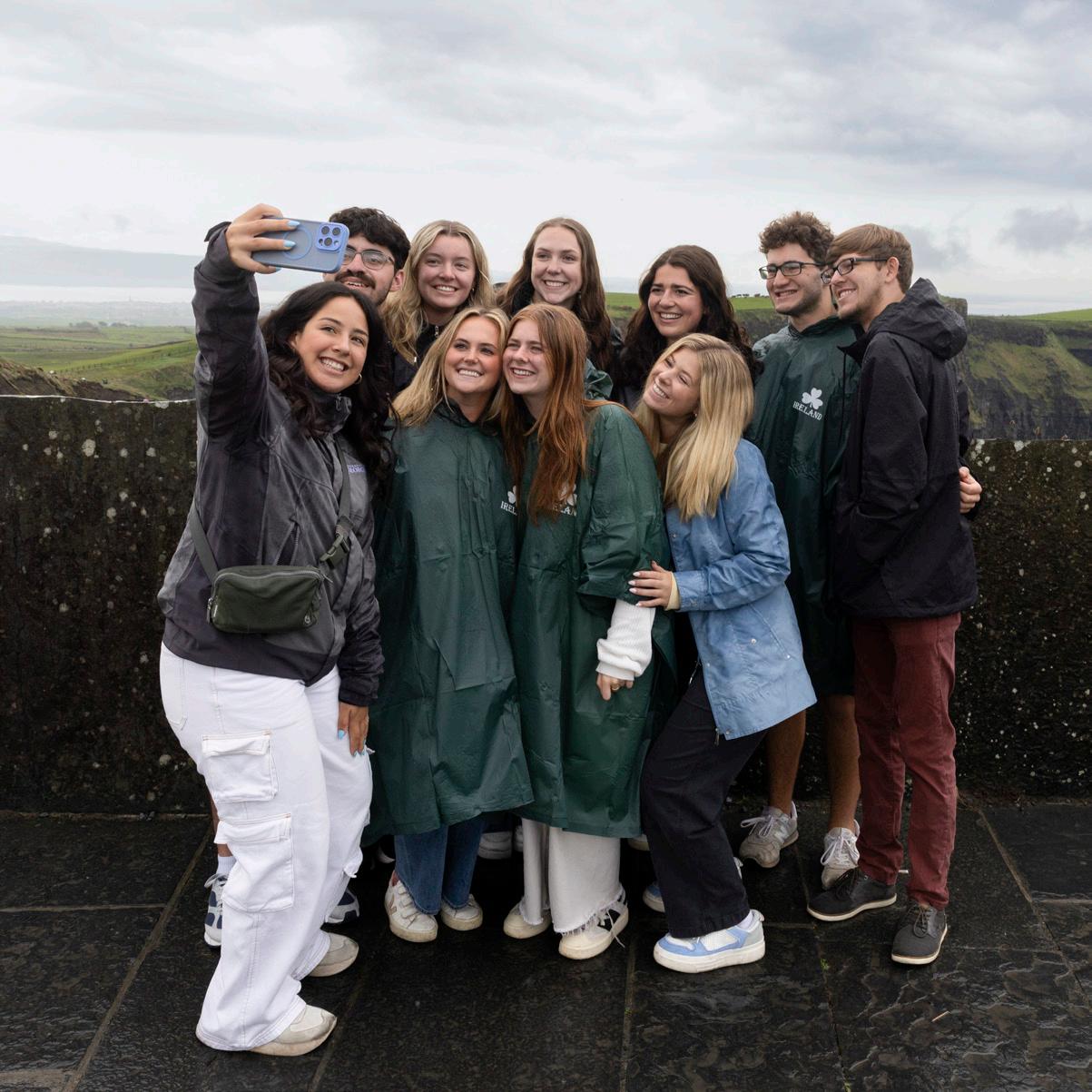
The Cliffs of Moher on Ireland’s west coast are one of the country’s most picturesque spots even when the weather isn’t always lovely—not that UGA’s Sports Medicine and Physical Performance in Ireland study away group minds all that much.
WRITTEN BY ERIC RANGUS MA ’94
PHOTOS BY CHAMBERLAIN SMITH ABJ ’18
Community Sports
Bryan McCullick PhD ’98 visited Ireland for the first time in 2002. Like millions of American travelers, he and his wife, Alison MPA ’99, were tourists. And they fell in love with the country.
Over the next 10 years, McCullick returned several times. In 2008, he served as visiting faculty at University College, Cork, on Ireland’s southern coast. In 2012, McCullick, a professor in the Mary Frances Early College of Education, earned a Fulbright and spent the summer working with the Gaelic Athletic Association (GAA) in Dublin.
“There is something special about this organization,” says McCullick, a faculty member since 1998 whose expertise lies in physical education, and teacher and coach education. “What it means for the country, what they’re doing. It’s important.”
Ireland’s rich sports tradition had all but disappeared in the decades after the 1840s Great Famine. The Gaelic Athletic Association was founded in 1884 to revive classic pastimes of hurling, Gaelic football, and handball.
Today, those sports thrive, with Gaelic sports regularly selling out 80,000-seat stadiums, the party atmosphere surrounding
them rivaling any fall Saturday in the South.
But beyond sports, the GAA is a cornerstone of Irish society. What’s one of the first things travelers see when they disembark at Dublin Airport? Framed GAA jerseys celebrating the island’s 32 counties, including those in Northern Ireland.
“My family was brought up in the GAA,” says Sarah Lavin, a coach at Sport Ireland in Dublin and a guide during the students’ visit to the facility that serves as Ireland’s Olympic training center. It was one of many Irish sports venues on the itinerary.
Lavin is a multisport athlete who plays Gaelic football for her club in Kilcock, west of the city, and camogie for county Kildare—all of that in her spare time, like every other GAA athlete.
“The GAA is part of the reason why communities stay communities,” she says. “And it’s the glue that holds the small ones together.”
McCullick

and Bud
from the Mary Frances
College
are the faculty leads. McCullick puts together the itinerary, incorporating two decades of personal experiences in Ireland as well as friendships he’s made along the way. Prior to coming to Ireland, Cooper led similar study away trips in Scotland and Taiwan and also provides expertise in athletic training.

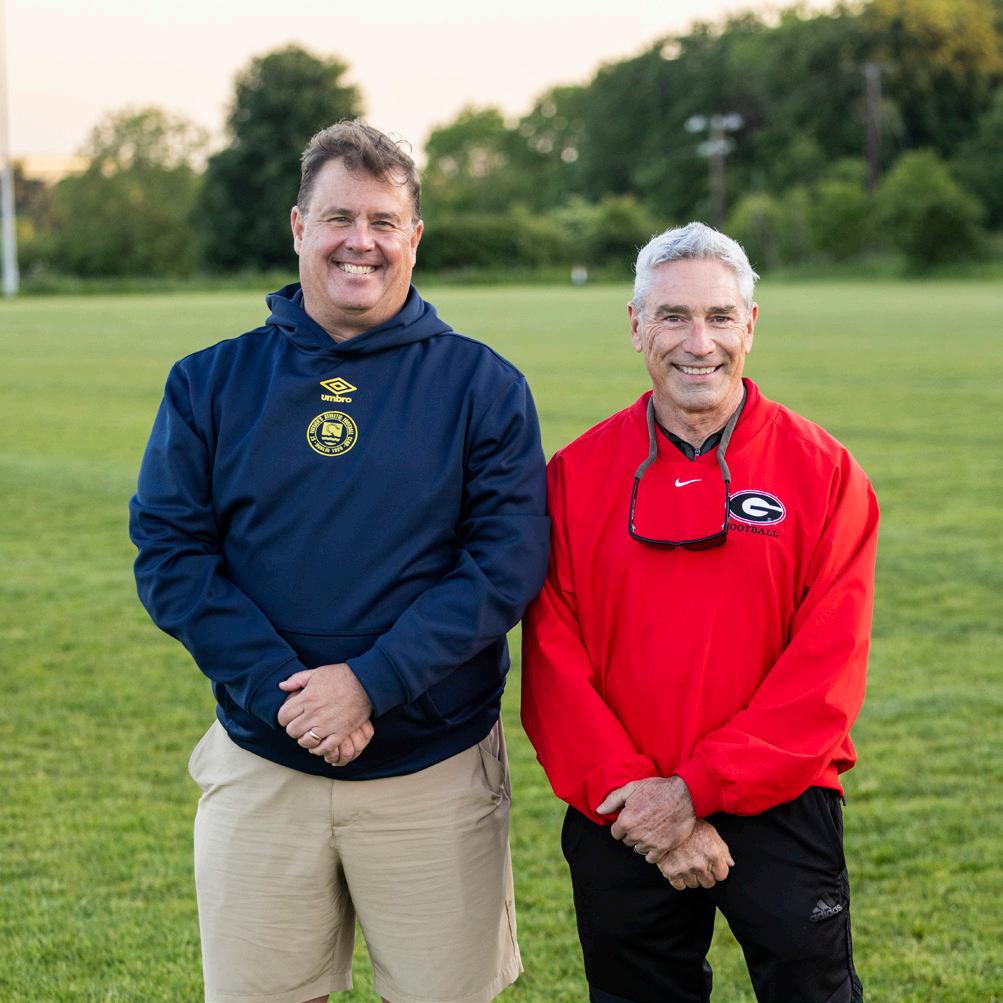

Dublin’s Temple Bar District is popular for its pubs and reverence toward its GAA athletes, as this mural demonstrates.
Bryan
(left)
Cooper,
Early
of Education,
The skywalk at Croke Park, one of Europe’s most storied sports venues, offers visitors an aerial view of Dublin.
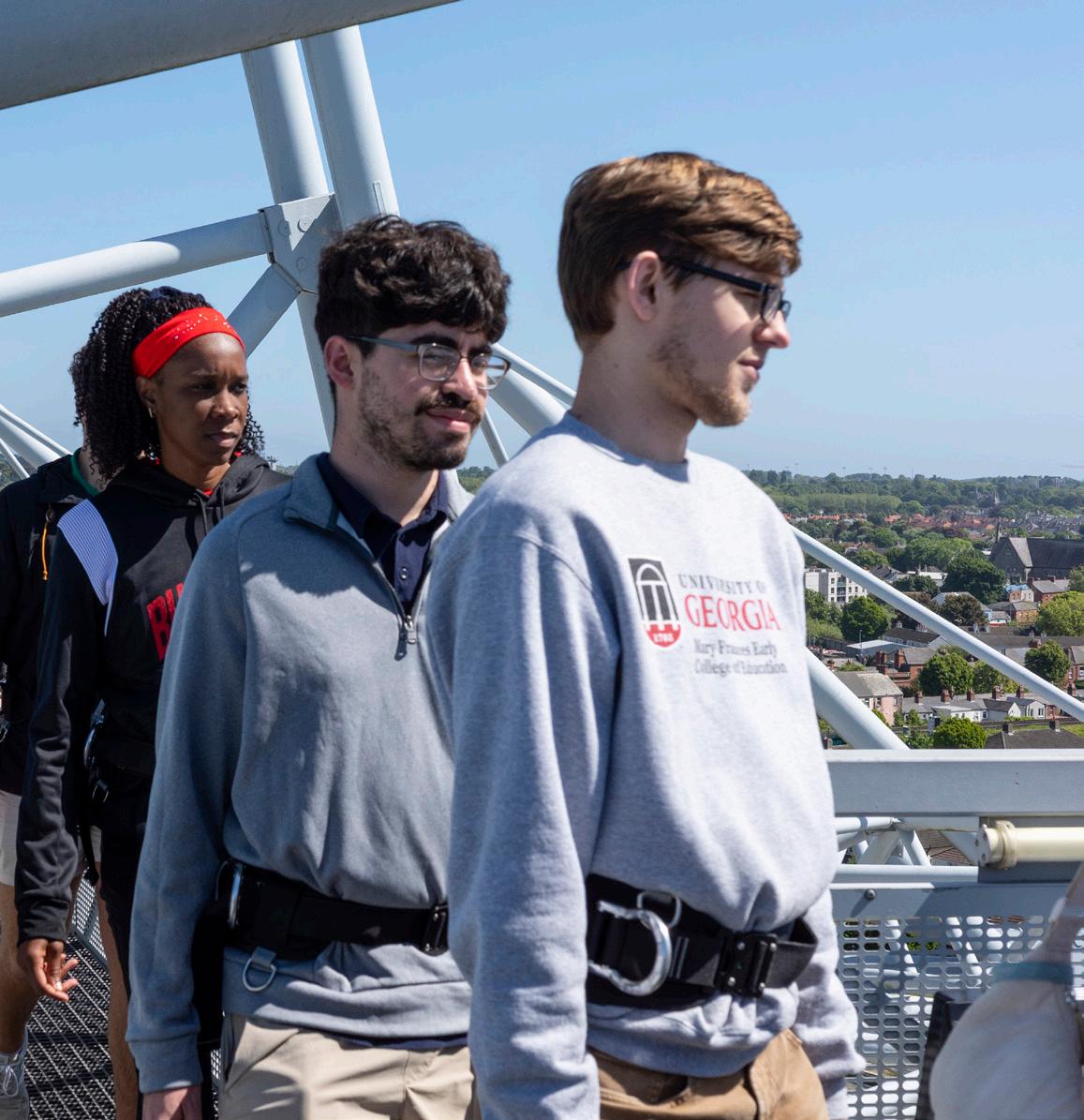
GAELIC SPORTS AT A GLANCE
The GAA was founded in 1884, but Gaelic sports have origins that reach back much further. There are more than 2,000 GAA clubs in Ireland, and none of the players or coaches, even at the highest levels, is paid. Injury treatment and prevention with this population is a relatively new area of study.
While Gaelic sports are played outside of Ireland— Atlanta has had a club since 1996—it’s in Ireland where they are an essential part of the culture. These are the five sports that make up the GAA.
Gaelic football: A form of football that includes elements of rugby and is played with a ball that most resembles a volleyball.
Understanding the Place
McCullick didn’t consider a study away trip to Ireland until about three years ago. The idea arose from his conversations with colleague Bud Cooper, who led previous study away trips to Taiwan and Scotland focused on athletic training and sports performance.
“The field of athletic training is only recognized by three countries: the United States, Canada, and Ireland, so this was a wonderful opportunity to introduce students to a country where athletic training is recognized,” says Cooper, who retired in September 2024 and is now an emeritus faculty member. Prior to coming to UGA, he served as head athletic trainer at the 1996 Paralympics among other high-profile roles.
To laypeople, the differences between athletic training—those who work with athletes to minimize and treat injuries—and physiotherapists—whose work and patients are more wideranging—is subtle.
But among the UGA students, whose career interests include that full scope as well as physical and occupational therapy, health and wellness, and exercise science, the opportunity to learn firsthand about Ireland’s community-based sports infrastructure and how its athletes—almost all of whom are amateur—stay healthy is unmatched.
But the program couldn’t be just that. At least not if McCullick and Cooper wanted the students to have a full experience.
“What are we here for?” McCullick says. “OK, so Ireland has trainers. But you have to have the context to understand this

Hurling: Played on the same pitch and with the same scoring system as Gaelic football, hurling is distinct for its wooden, paddle-like hurleys. Hurling includes the best elements of field hockey, lacrosse, and soccer.
Camogie: A version of hurling played by women and girls.
Handball: An indoor sport that is basically racquetball without the racquet.
Rounders: A bat and ball game that includes elements of baseball and cricket.
So, McCullick front-loaded the students’ schedule with cultural content. Over the first two days, they visited historic sites across Dublin, including the 82,300-seat Croke Park, one of the largest stadiums in Europe, and museums related to Ireland’s early 20th century war for independence.
In Ireland, sports, medicine, culture, and history are intertwined. To ignore one means that you can’t see the whole picture. And learning about sports through a different cultural lens gives students a more informed perspective about their careers.
“Sports over here is different, but the injuries, the performance and recovery, and the injury prevention, that’s the same as in the U.S.,” McCullick says. “And the students are meeting the Irish people. They are accommodating and very happy to have us here.”

Katy Krumrey (facing) and Kylie Horgan dance to the rhythm of Galway’s buskers.
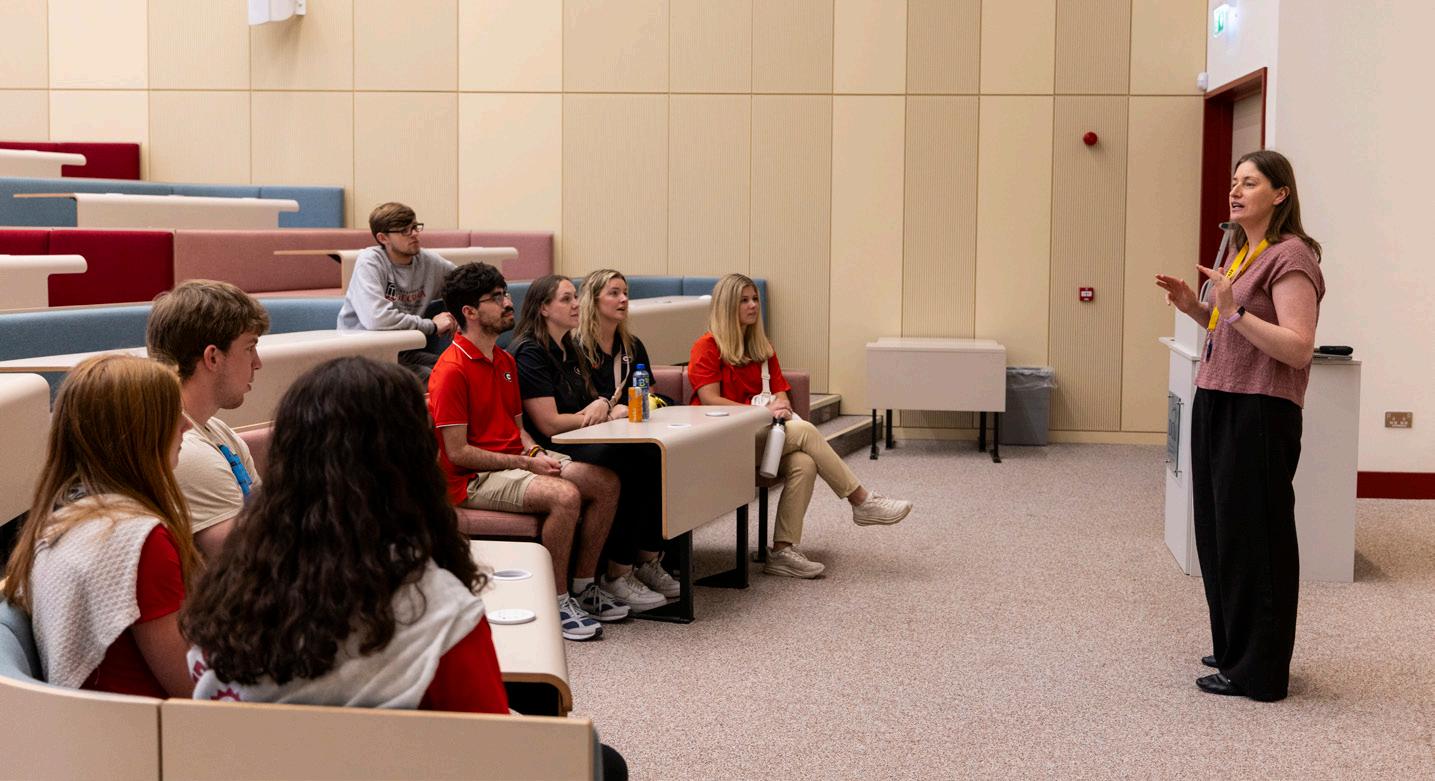

A Group Becomes One
The Ireland travel group included nine undergraduate students and three graduate students, all of them from UGA and 11 of the 12 in the College of Education. Yet, most didn’t know each other.
“It started in the airport,” says Kylie Horgan BSEd ’24, one of the three graduate students. “It was unspoken, almost. We found each other, and we all just kind of clicked. You don’t see that very often.”
Even during free time, the group traveled everywhere together. A dozen students walking the streets of Galway as one, stopping for ice cream (they did sample
different flavors) or listening (and occasionally dancing) to buskers.
During his many visits to Ireland, McCullick has collected a lot of friends. He spent the trip introducing the students to them.
Peter Horgan, the GAA’s strategy, insights, and innovation manager (no relation to Kylie), was a constant source of information and storytelling. Jack Cooney, also with the GAA and a former player and manager at the county level for Gaelic football, helped introduce the association to the students in Dublin and also met up with them across the country in Galway. Des Ryan, director of sport and wellbeing at the University of Galway, delivered a lecture there and then saw the students again following a hurling match in Kilkenny.
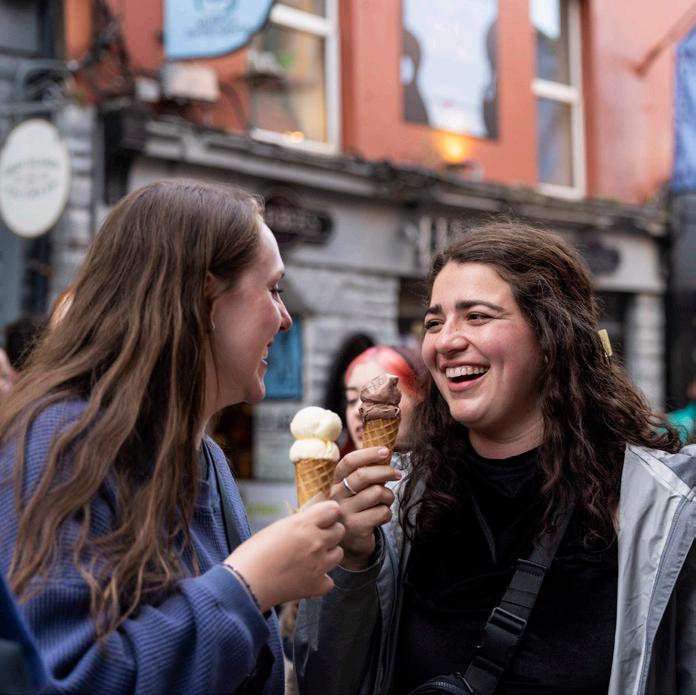
Hearing the stories first-hand brought the Irish sports experience to life.
“It’s been really interesting from an athlete’s point of view to learn about the different aspects of sport here in Ireland,” says Susanna Yonk, a Dance Dawg—UGA’s athletic dance team—and a fourth-year exercise and sport science major from Cumming.
“I could definitely see myself coaching in the future,” she continues. “So when I hear different perspectives about how to run a team and how to support athletes physically and emotionally, I definitely can see sports from an occupational perspective.”
Dublin City University faculty members Siobhan O’Connor and Sinead O’Keeffe spoke on injury prevention and athlete mental health, respectively. That hit home for students in lots of ways.
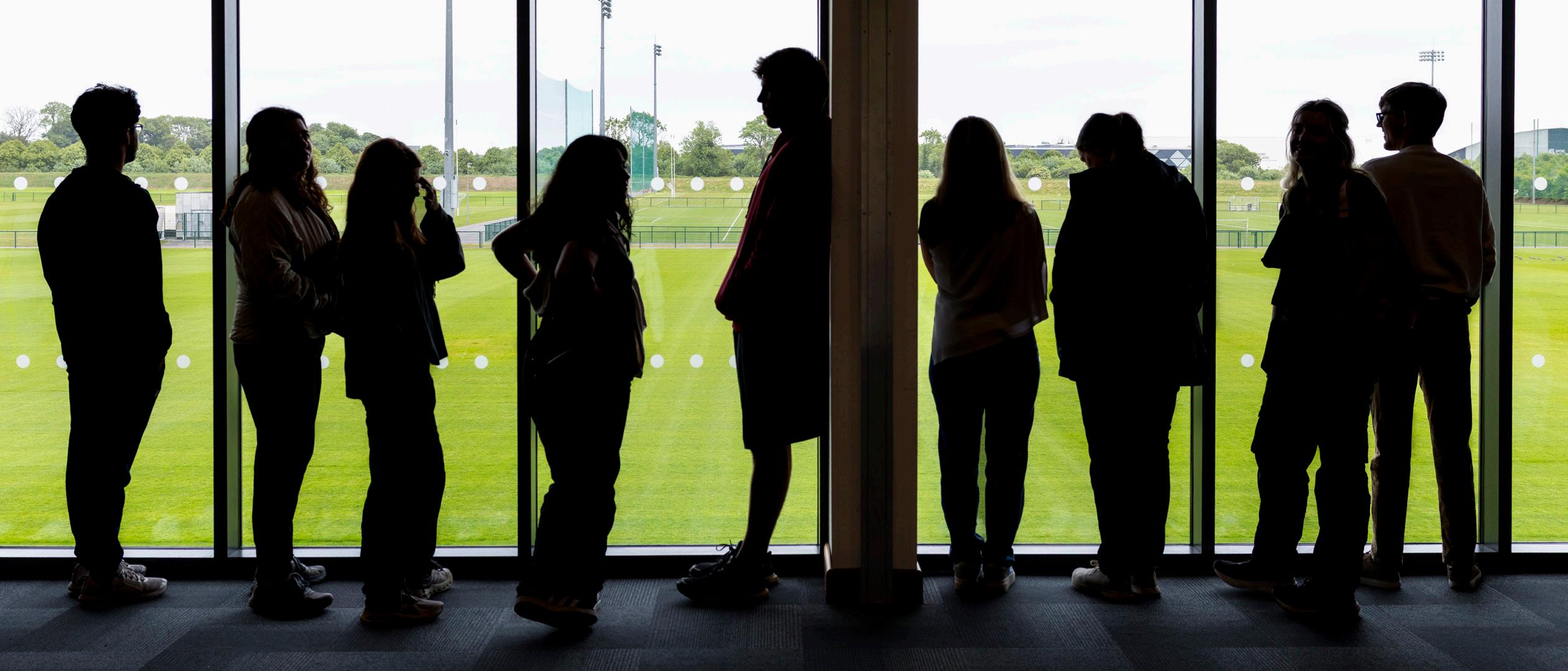
“It was unspoken, almost. We found each other, and we all just kind of clicked. You don’t see that very often.”
KYLIE HORGAN, GRADUATE STUDENT, ATHLETIC TRAINING
Work and play. The students learned about Gaelic sports and Irish sports medicine directly from athletes and academics, including Siobhan O’Connor, an associate professor in the School of Health and Human Performance at Dublin City University. They also sampled Gaelic sports like handball (right) themselves.
Left: Harper Brown and Madison Huss enjoy their just desserts in Galway. Below: The practice fields at GAA Development Center outside Dublin are a sight to see.
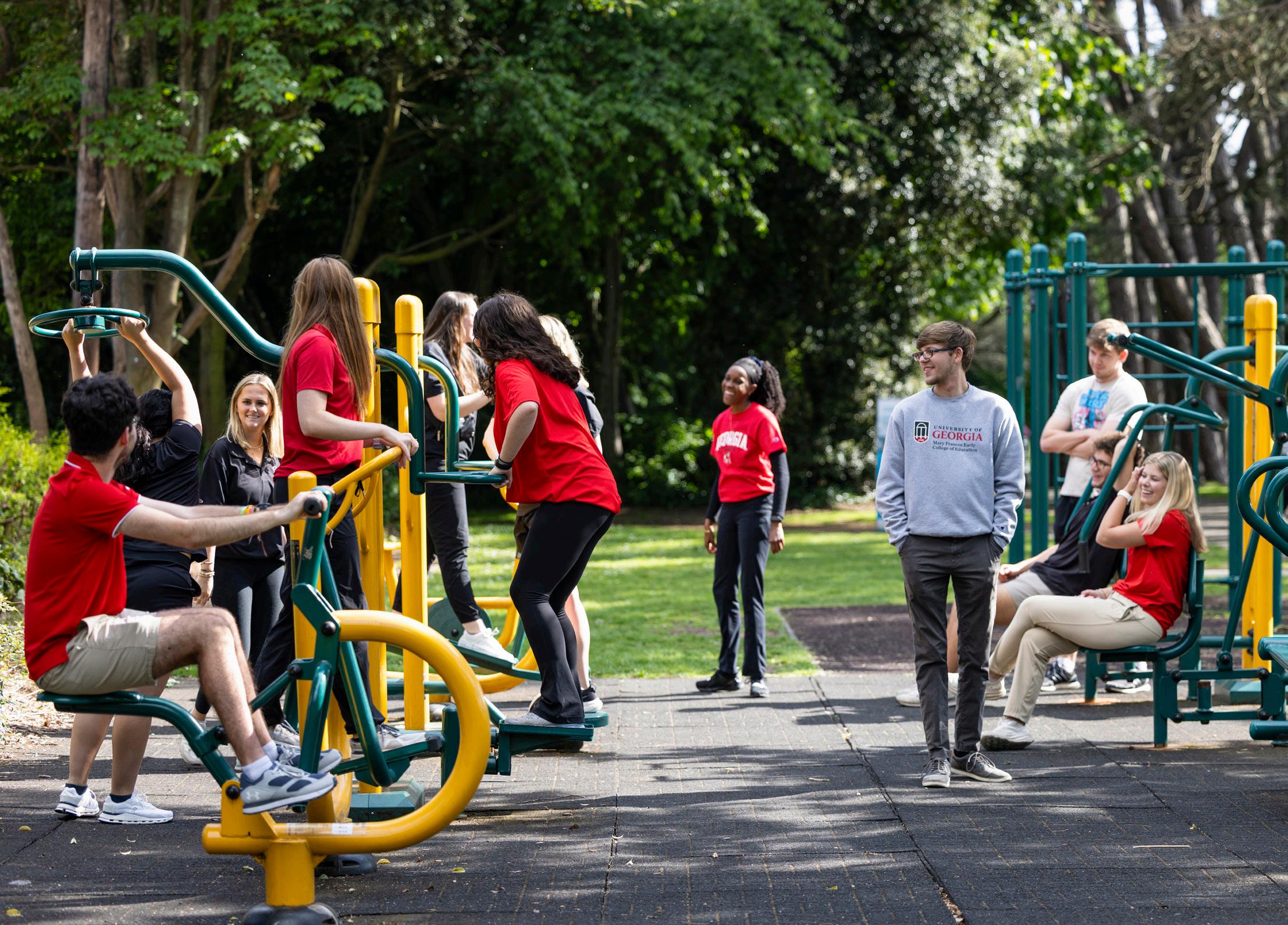
“I know in Ireland they try to be tough too, but sometimes you just have to look out for your body and yourself,” says Landon Kardian, a fourth-year sports marketing major.
O’Connor’s presentation included statistics on the underreporting of concussions in athletics. While in high school, Kardian suffered three concussions, and while he was treated for them, he hasn’t forgotten the struggle.
“If you don’t feel right, then you need to get checked out,” he says. “It’s good that more people are speaking up now.”
There were times when it seemed like McCullick knew half the country’s population. On the Dublin City campus, out of nowhere, he’d walk past strangers on the stairs and greet them.
“Mika! Congratulations on the new baby!”
It was Mika Manninen PhD ’19, an assistant professor of physical education at DCU and a UGA alumnus. So not exactly a stranger.
“That’s the thing about Ireland,” McCullick says. “You just go up and talk to people.”
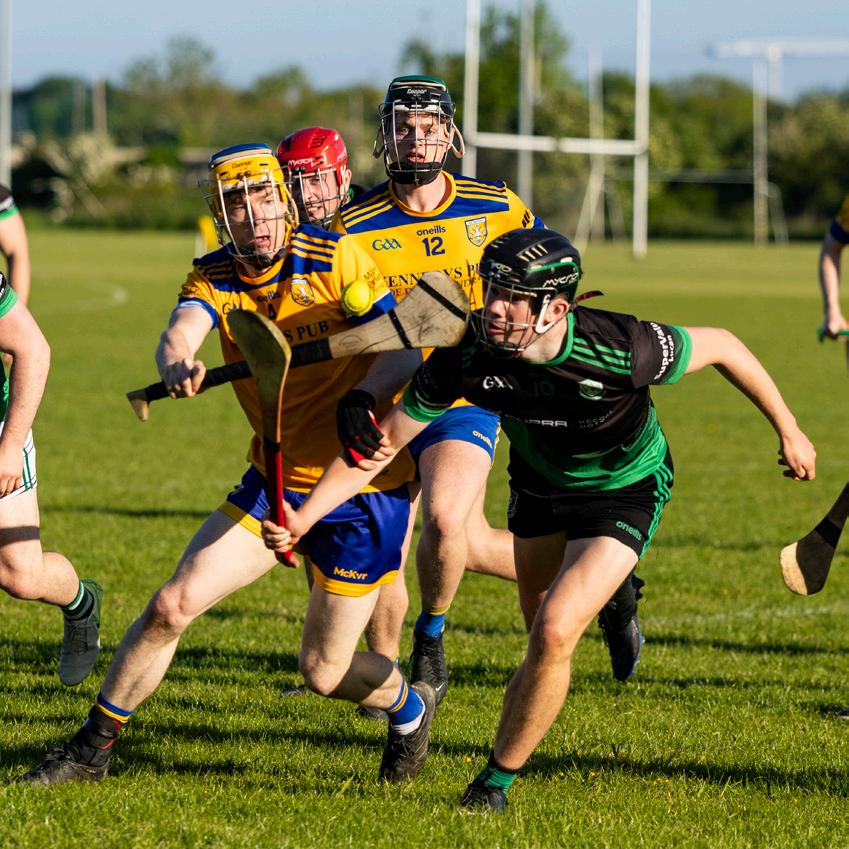

Over their two weeks in Ireland, the students explored the country coast to coast. They even took an overnight trip to Belfast, Northern Ireland, which included a visit to the Titanic Museum, a tour of the city, and conversations with local GAA clubs.
The students’ living quarters at Dublin City University provided all sorts of distractions.
Dublin
Kilkenny
Belfast
Galway Cliffs of Moher
One of the GAA’s five sports, hurling (right), incorporates the best parts of field hockey, lacrosse, and soccer to create something that’s distinctly Irish.
One of the trip’s highlights was a visit to the Sport Ireland Campus on the outskirts of Dublin. The campus spans 520 acres, and its world-class facilities include the National Aquatic Center, the National Indoor Arena, and the headquarters of the Olympic Federation of Ireland, seen here.


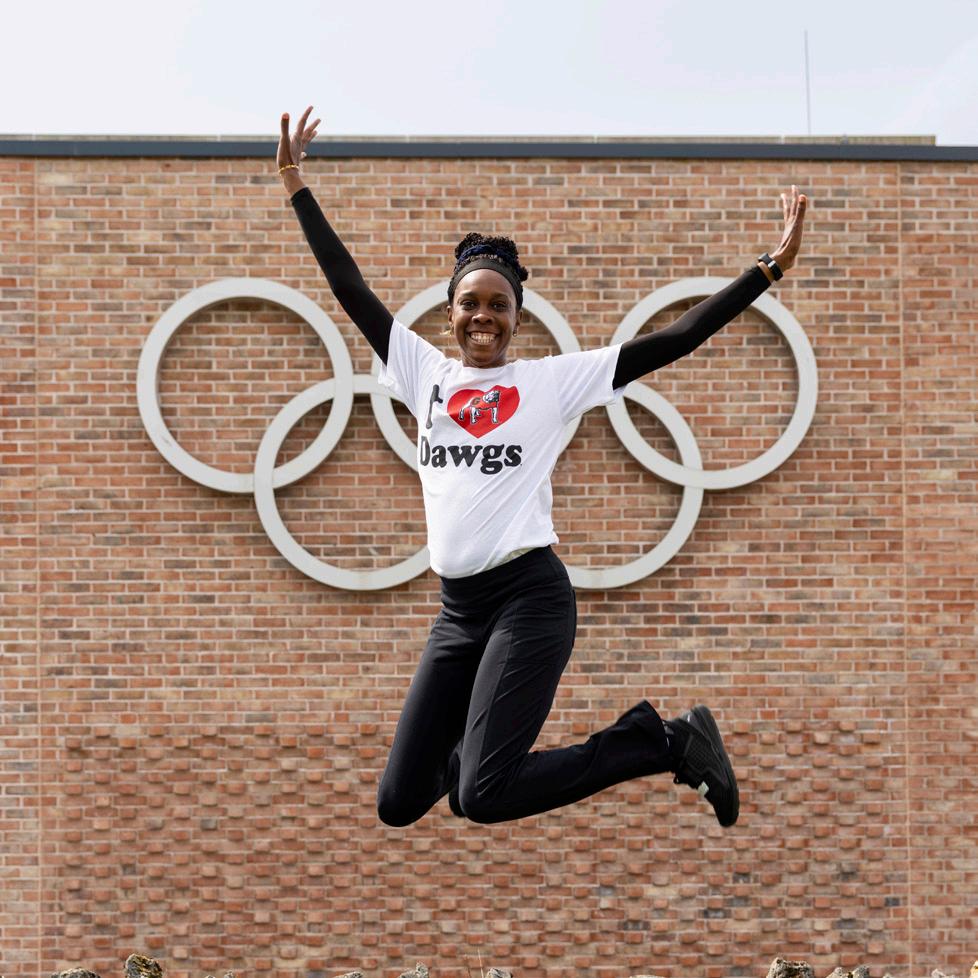
A Legend in Her Time
Levern Spencer is a national hero.
A world-class high jumper from the Caribbean island nation of St. Lucia, Spencer BSHP ’08 won two outdoor SEC titles and one indoor competing in college for the University of Georgia. She was a four-time All-American, and the university’s outdoor high jump record she set in 2007 lasted for 14 years.
On the larger stage, Spencer has carried St. Lucia’s flag at every international competition she’s entered, including four Summer Olympics.
Her two golds at the Pan American Games and additional gold at the Commonwealth Games were the first-ever won by a St. Lucian athlete in any sport. And earlier this year, she received the Saint Lucia Cross, the country’s second highest civil honor.
Spencer’s fellow student travelers knew none of this.
Not until McCullick casually mentioned it at lunch on the trip’s second day.
Many, many questions followed. What athletes do you know? Which Olympics was your favorite? What’s your top memory?
Spencer took it all in stride and spent much of the meal flipping through Olympics-themed photos on her phone, including several of her very impressive Olympic pin collection.
Spencer retired from competition in 2021 following the Tokyo Olympics. She worked as a wellness instructor for a time, and then she decided to return to UGA to pursue a master’s in kinesiology. She is also interning with the UGA Athletics Association and working with the Olympic sports program.
“There were a lot of things I wanted to do that I didn’t because I felt like if I was competing professionally while going to school, something would suffer,” she says.
“Now that I’m retired, I can focus solely on school.”
Spencer found out about the Ireland trip from Cooper, who discussed it in one of her classes.
On the first day during the group’s tour of Croke Park in Dublin, she made sure to get a selfie with the Olympic torch sculpture atop the stadium. It was from the 2012 games in London.
She waited for most of the others to move on before chronicling the moment.
“I was there.”
Levern Spencer is a four-time Olympic high jumper. She retired after the Tokyo games and returned to UGA for grad school. As an undergraduate, she starred on the women’s track and field team.
Crossing the Finish Line
“Putting your body on the line is really something we’ve only seen in the Olympics when you see a whole nation come together,” says Harper Brown, a graduate student in athletic training. “But in Ireland, it’s an everyday thing when the entire community comes together for every single game.”
Learning the lessons of keeping those everyday athletes healthy, as well as the underlying motivations that inspire them to give so much of themselves for their communities, were themes that the UGA students fully embraced.
“I didn’t know anything about Irish history before I got here, and I loved learning about it,” says Madison Huss, a fourth-year exercise and sport science major from Evans. “Now I have a full understanding why Gaelic sports are so important.”
For Jackson Dollar, a fourth-year exercise and sport science major from Dublin—the one in Georgia—the experience was so meaningful that he’s considering returning to Ireland for a rotation after he enters physical therapy school. “It’s good to explore different cultures and see how life can be different in other places,” he says.
Dollar credits McCullick and Cooper for making the experience a memorable one.
“They were laid back and chill,” he says. “They wanted us to have a good time and enjoy the learning process.”
Cooper ate almost as much ice cream as the students, and the self-effacing McCullick, who spent most of his time at the front of the group, remained approachable. For instance, students didn’t hesitate to tease him about his driving—understandable, given that Ireland’s narrow, winding rural roads aren’t for the faint of heart— or his eclectic taste in music.
“The students are fun, that’s what I love about them,” McCullick says. “A lot of them would be friends with my daughter, who’s almost 20. And as a group, they are very inquisitive. They have been wonderful.”
Now as the summer moves toward fall and the new semester begins, the travelers are still posting to their vibrant group chat.
“If I had been here by myself, I don’t know how much I would have enjoyed it,” says Val Suarez, a fourth-year exercise and sport science major from Dacula. “But if you are with people and you enjoy their company, you’ll try a lot of new things, and it makes it that much better.” GM

Meet all 12 of our Ireland Maymester students at: T.UGA.EDU/IRELANDSPORTSMED
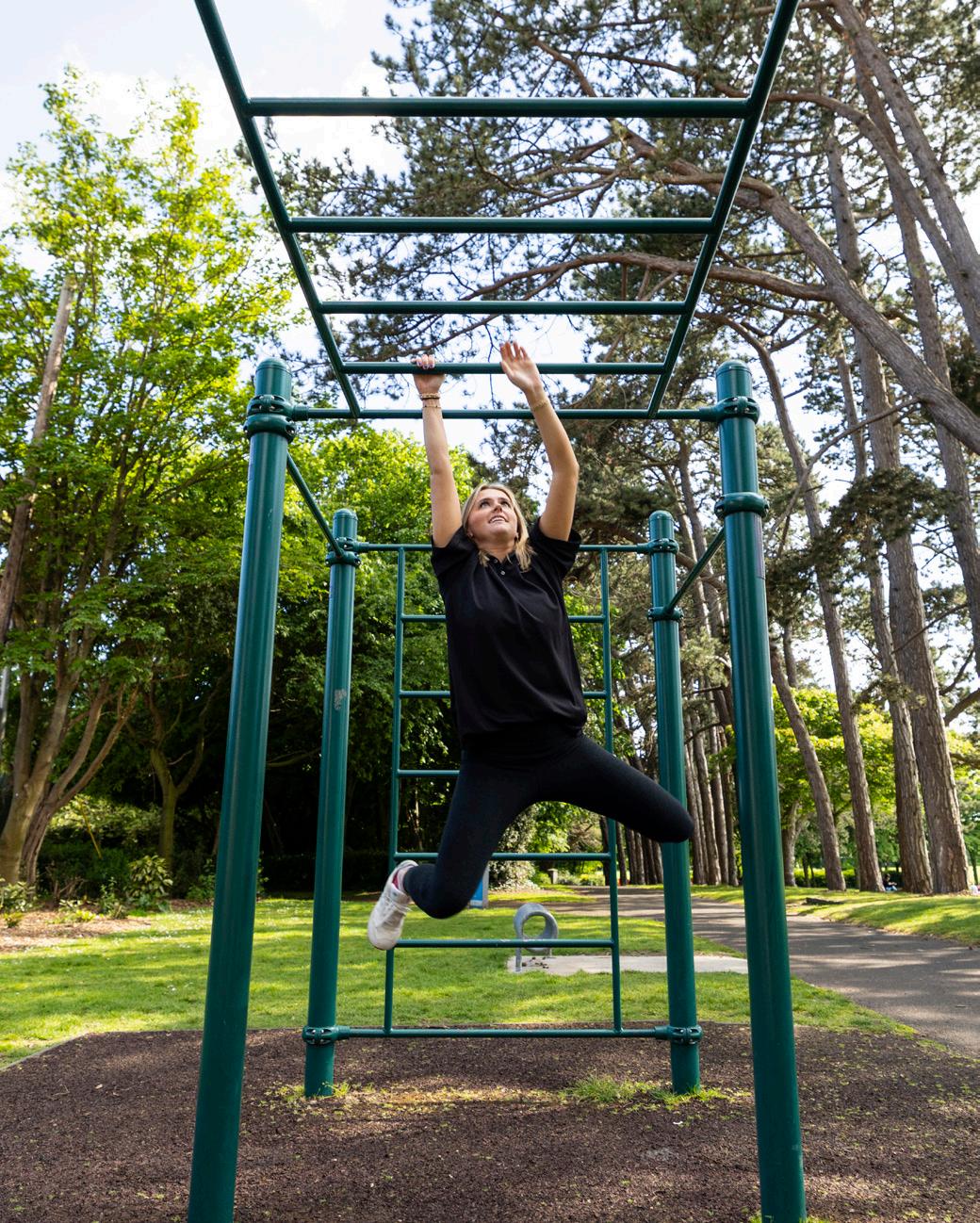
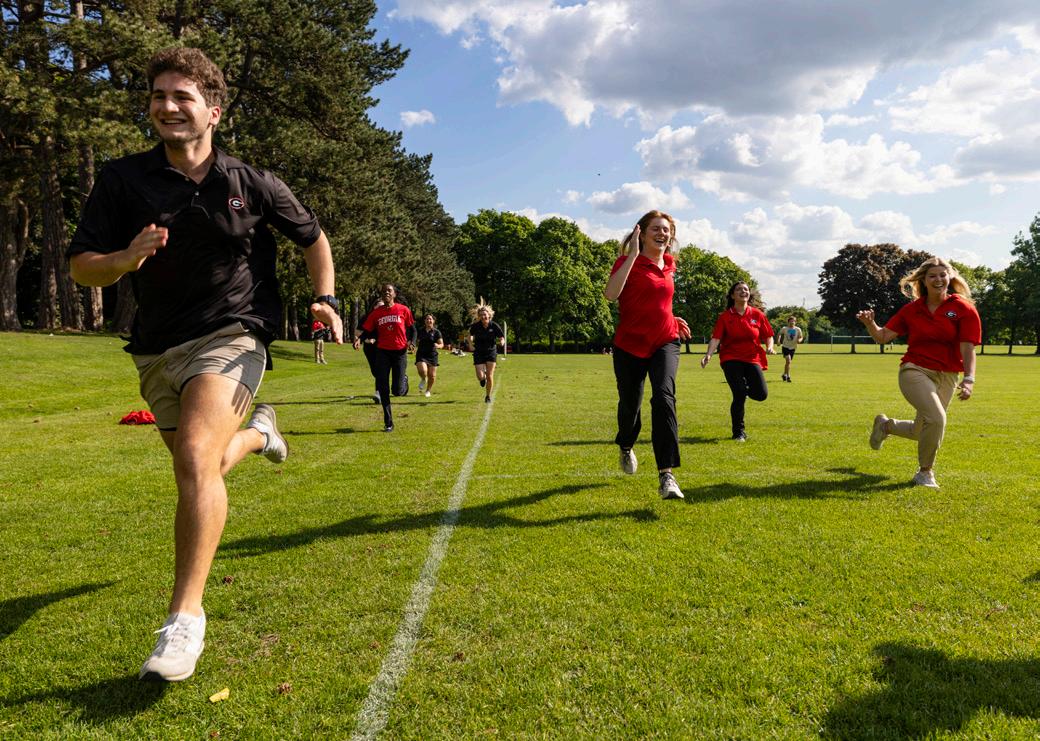
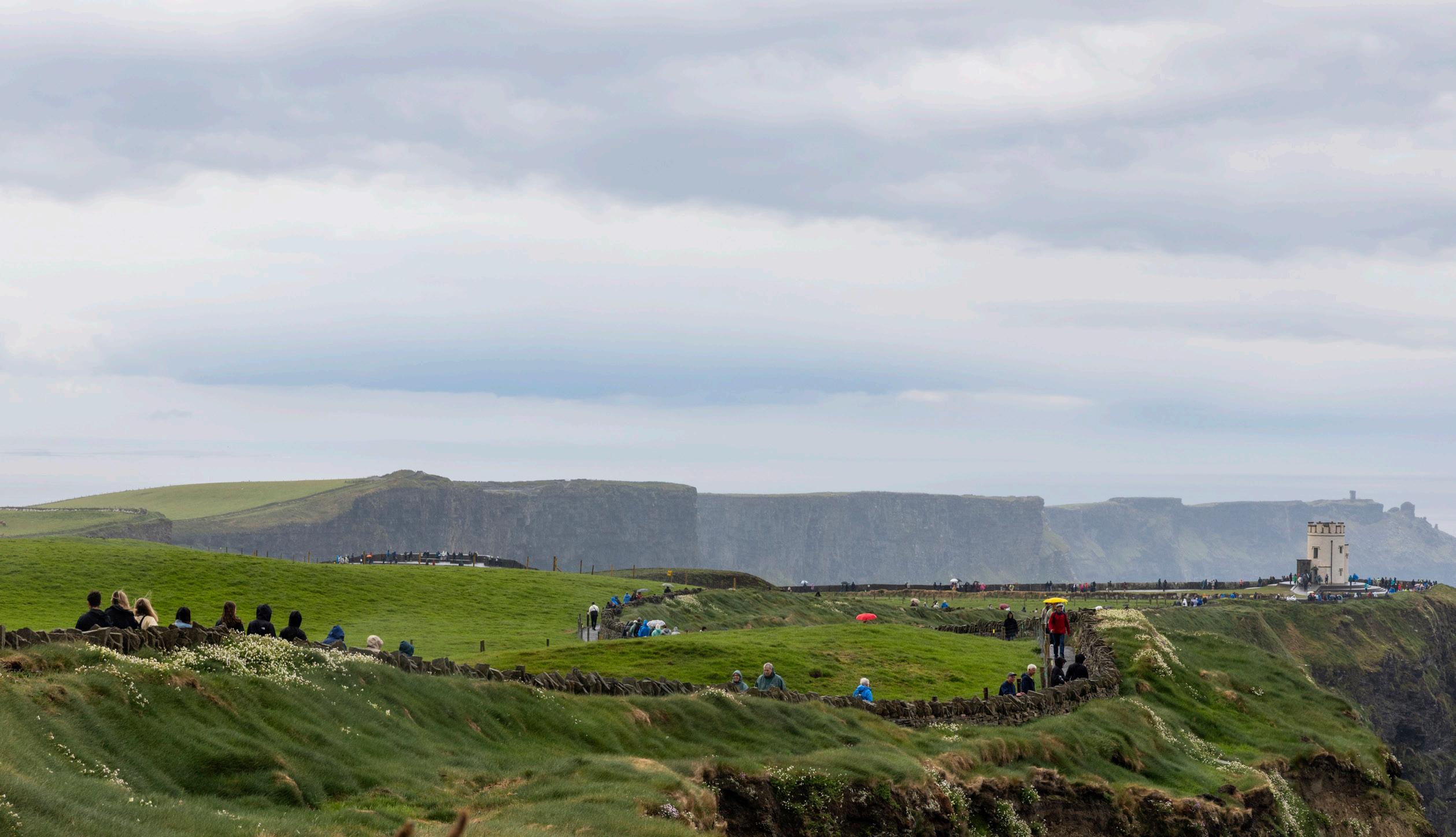
“I didn’t know anything about Irish history before I got here, and I loved learning about it. Now I have a full understanding why Gaelic sports are so important.”
MADISON HUSS, FOURTH-YEAR UNDERGRADUATE, EXERCISE AND SPORT SCIENCE
Luke Whitehead leads the way.
No obstacle is too tough for Anna Foster.
Capturing Georgia’s Coast
Jekyll Island transforms into an open-air classroom for UGA students to hone their artistic skills.
WRITTEN BY HANNAH GALLANT
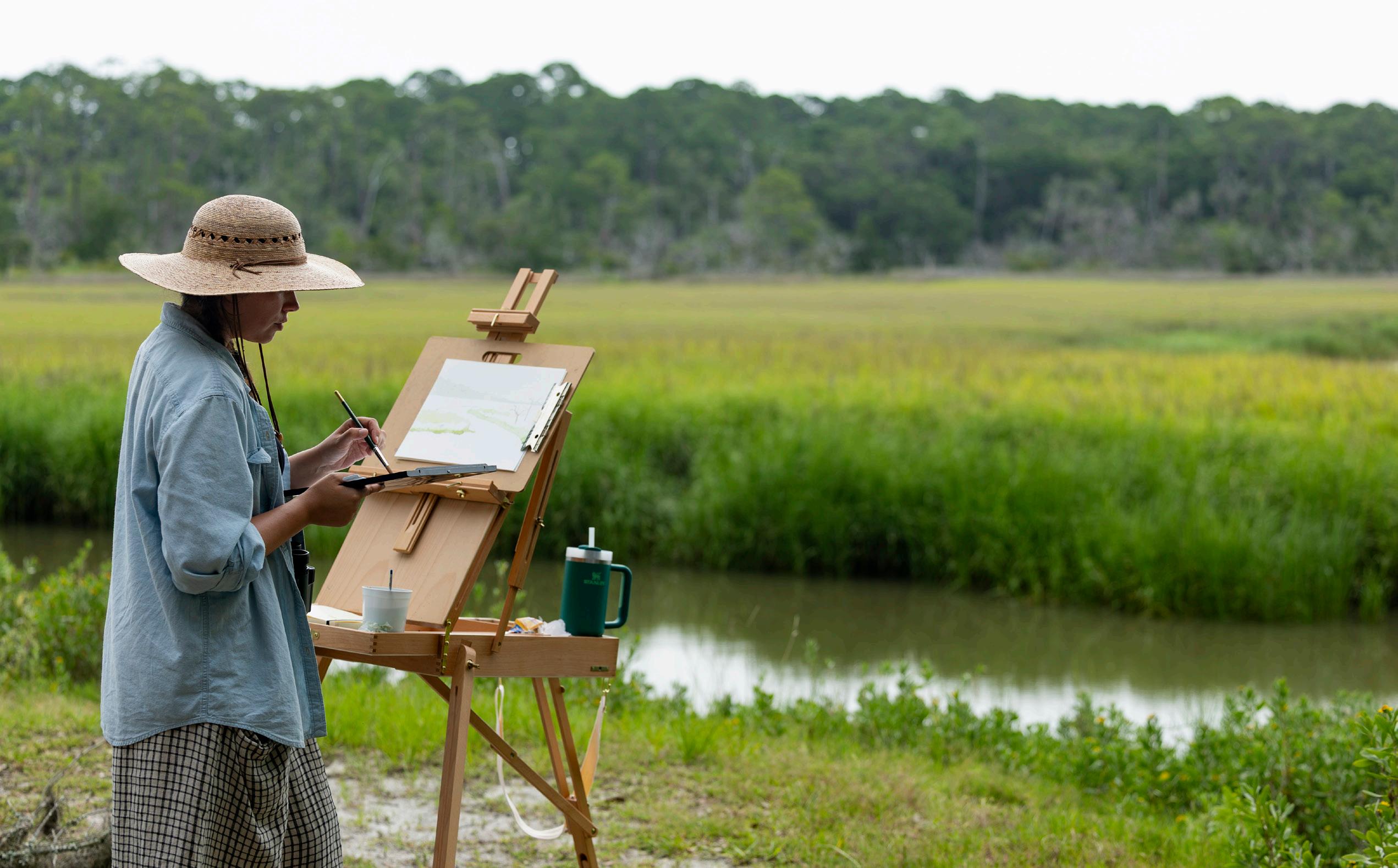
For two weeks this summer, 11 University of Georgia landscape architecture students took to the outdoors with their easels, pencils, pens, and paints for a field sketching and watercolor course.
They started locally, practicing drawing and painting fundamentals with scenes from the Founders Garden, downtown Athens, and the historic Elder Mill Covered Bridge before traveling to Jekyll Island for a week in the coastal Georgia air. There, they set up their easels each morning immersed in a new landscape. Crane Cottage in the island’s historic district. Clam Creek Marsh. Sunrise at Driftwood Beach. And even a day trip from Jekyll to the Dungeness ruins and wild horses on Cumberland Island.
At each location, the students settled in for four to five hours at their easels. Brad Davis, the course instructor and the Dan B. Franklin Distinguished Professor in the College of Environment and Design, walked among the easels to coach each student and offer demonstrations. They all ended each day gathered around their works for a group critique of positive
comments and constructive feedback.
Most of the six undergraduates and five graduate students in this year’s class were completely new to watercolor. And many also had limited experience with drawing. Each day brought new opportunities to sketch a little faster, fine-tune their ability to capture the right perspective, and take more risks with colors.
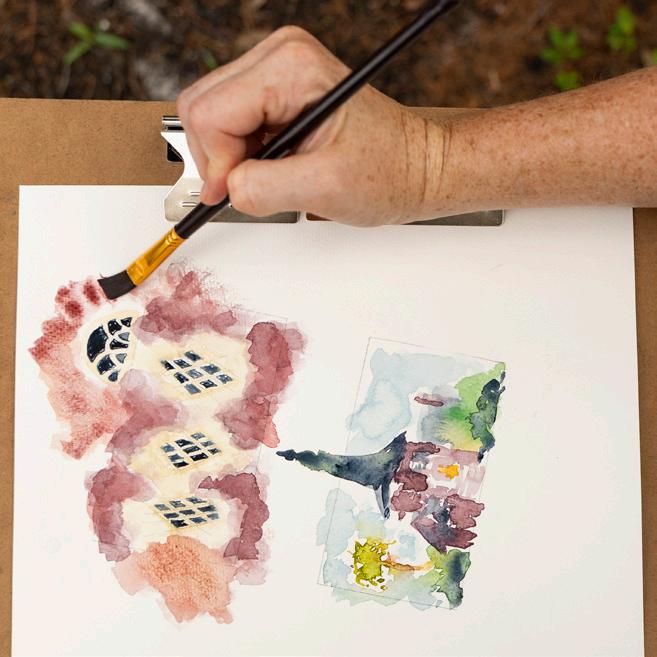
“It takes time to get it right. But when you get it right, it’s really satisfying,” says third-year landscape architecture undergraduate Andrew Dickson.
When away from their easels, the students continued to learn from each other as they shared group dinners, fished on the beach, took late-night Dairy Queen Blizzard runs, and trekked out on birdsighting walks.
“When you’re riffing off other people, it’s such a more enriching experience,” says second-year landscape architecture graduate student Samantha Harper. “That’s the best thing about this program and the whole experience: It’s the people.”
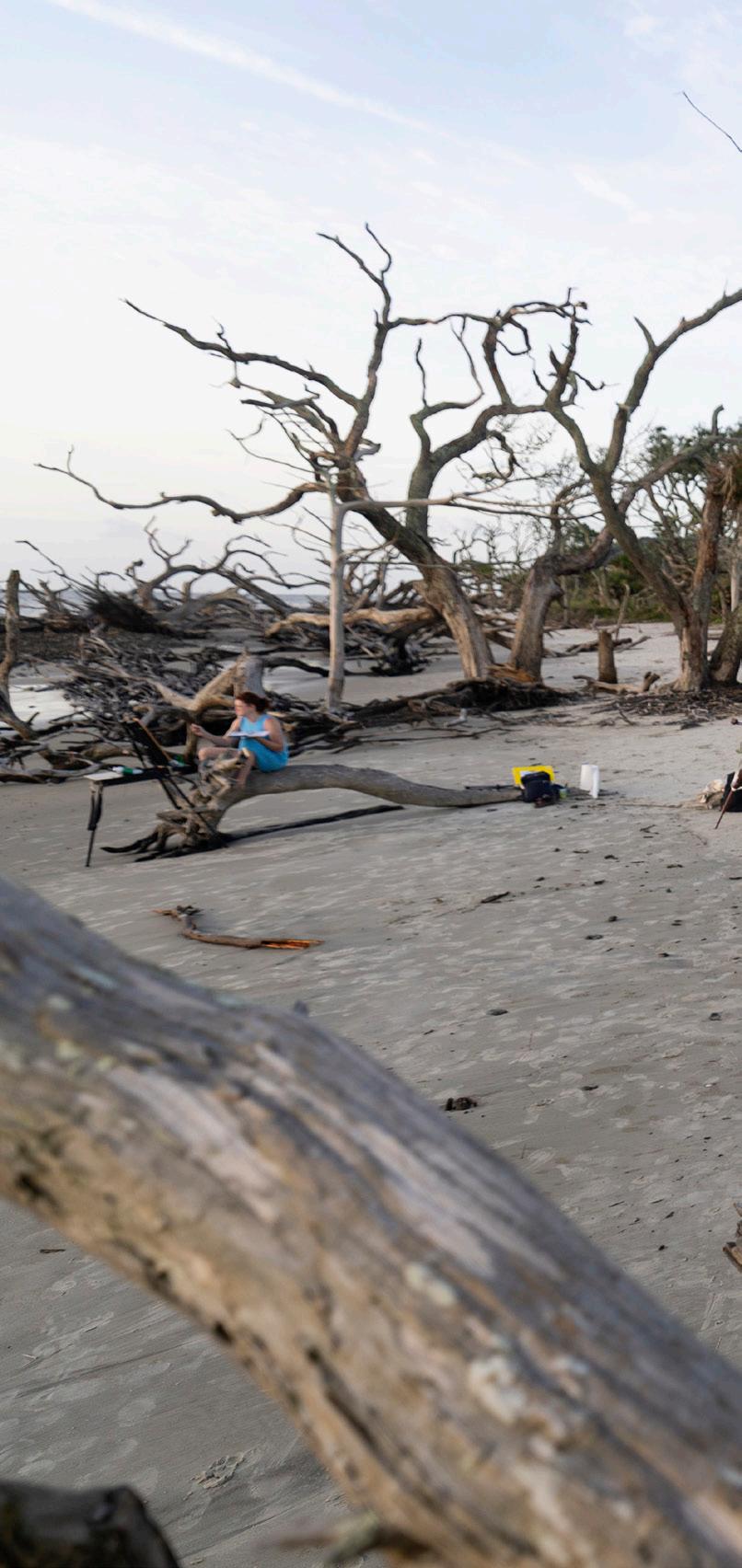
PHOTOS BY ANDREW DAVIS TUCKER

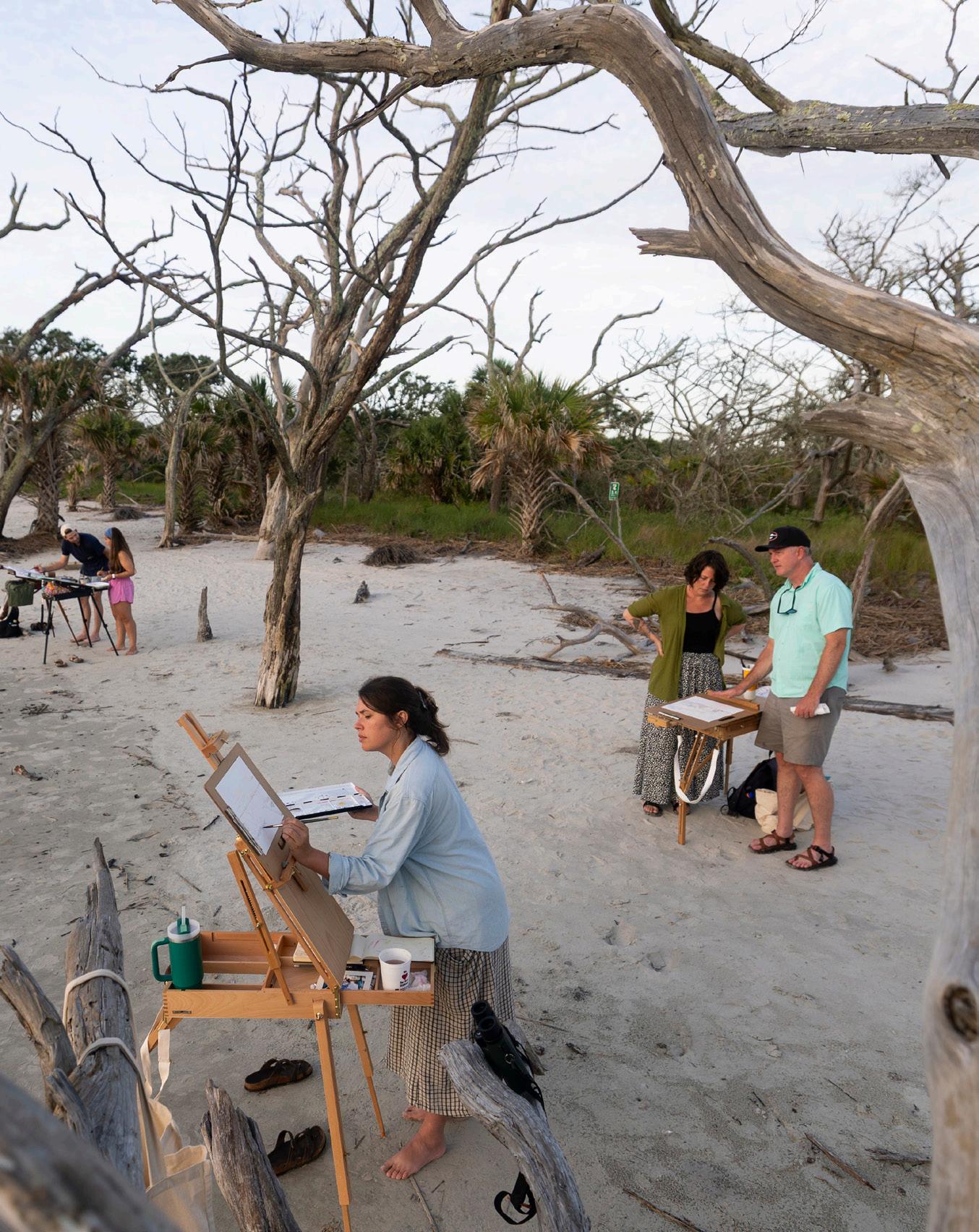
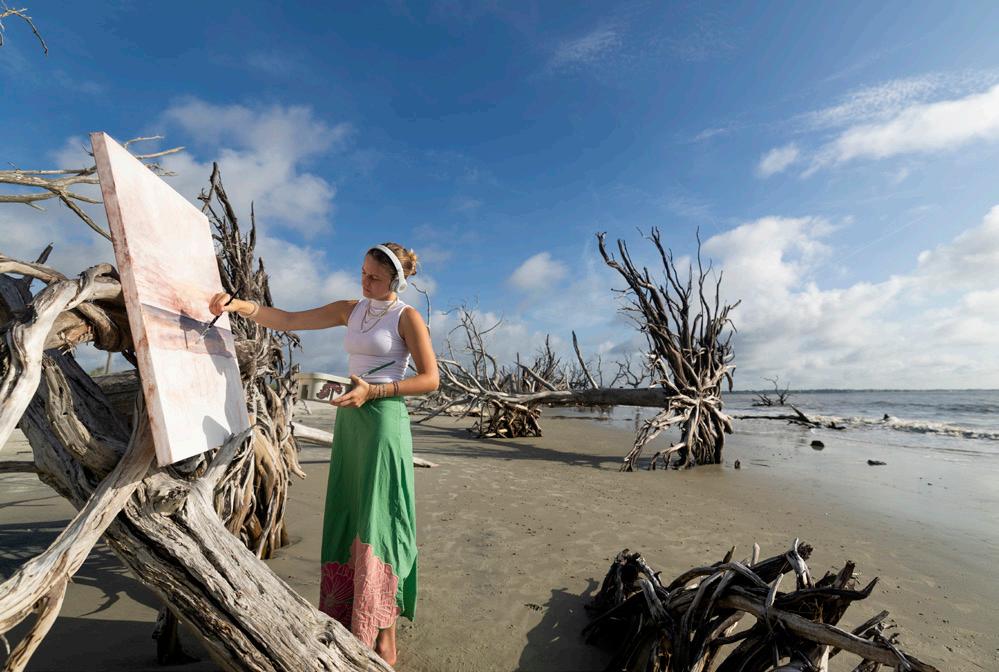
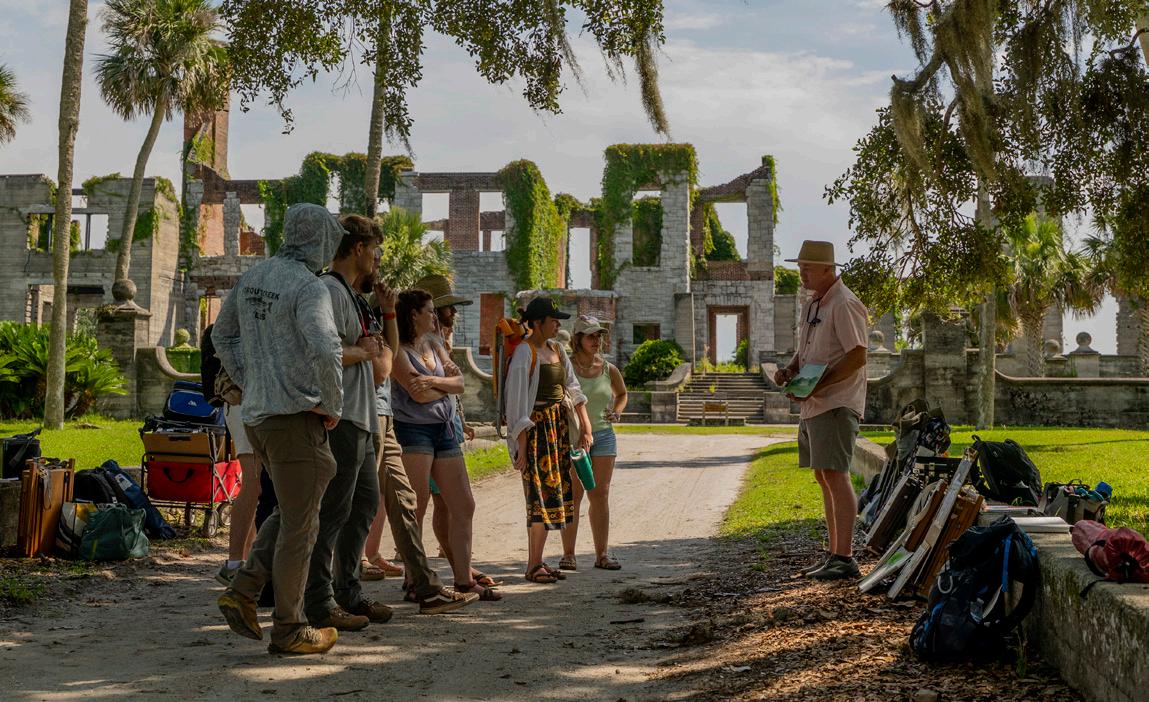
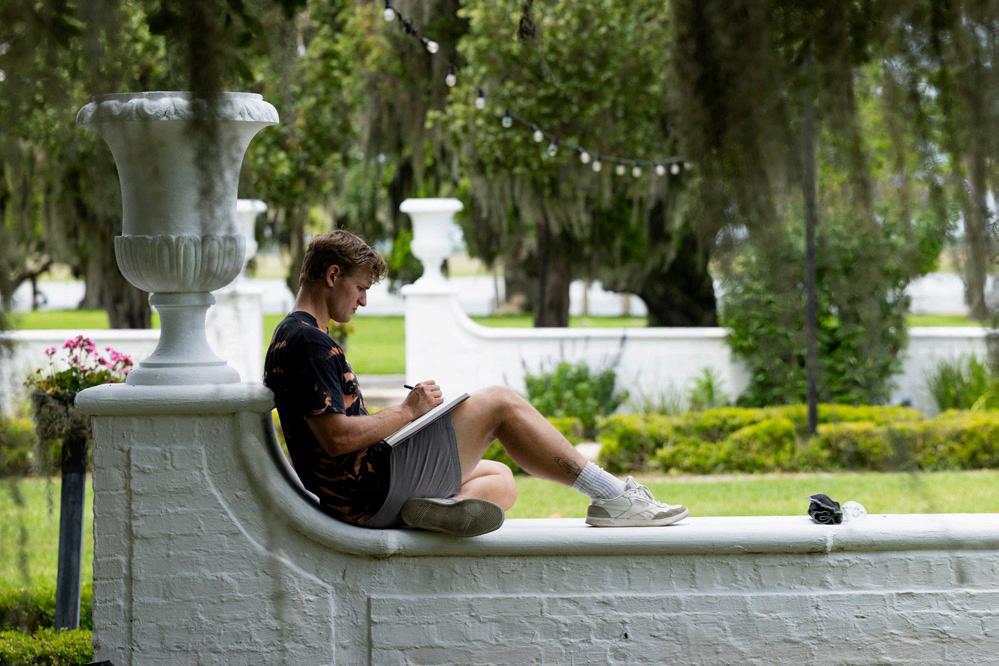
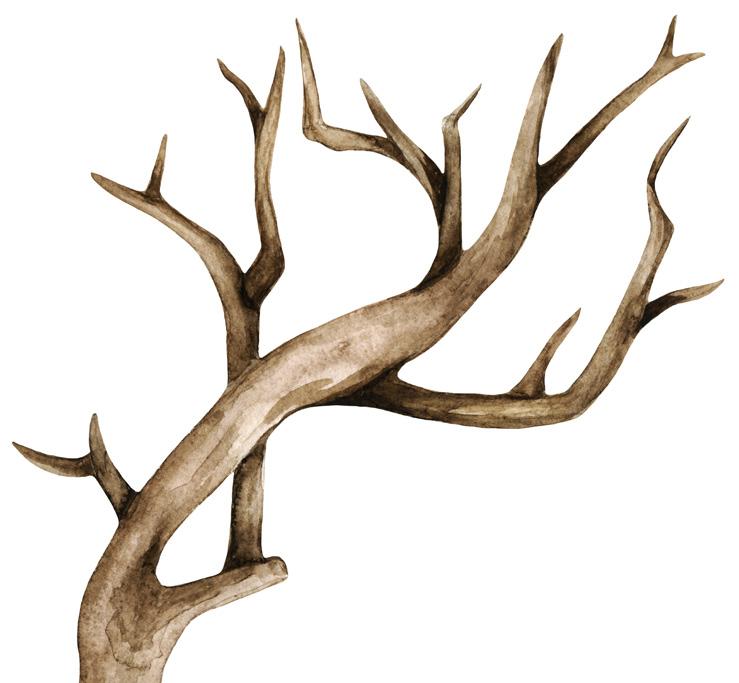
Pictured clockwise from top left: Laura Binford at Clam Creek Marsh; course instructor Brad Davis and students among the trees; Loren O’Steen at Driftwood Beach; the class visits Dungeness Ruins; Miles Miccichi settles in aside the Crane Cottage garden; a sunrise session at Driftwood Beach; and a watercolor rendition of Faith Chapel by Caitlyn Hentenaar.

dATES TO REMEMBER
FALL GAME-WATCHING PARTIES
Alumni chapters around the world host gamewatching parties for local Bulldogs throughout football season. Find your watch party at alumni. uga.edu/gamewatching and update your contact information with UGA to ensure you’re invited. It takes two minutes at alumni.uga.edu/update

HOMECOMING
October 4
Alumni are invited to return to Athens for 2025 Homecoming festivities hosted by many schools, colleges, and other campus groups. All alumni are welcome to join in the celebration on Myers Quad three hours prior to kickoff. Festivities end at game time when UGA hosts Kentucky. Details at alumni.uga.edu
2025 PRESIDENTS CLUB RECEPTION
October 17
Among UGA’s most committed supporters are members of the Presidents Club, those who contribute $1,500 or more during a fiscal year (July 1 to June 30). Each fall, President Jere W. Morehead JD ’80 thanks these supporters for their generosity during an on-campus reception, and this year’s gathering will take place the Friday before the UGA vs. Ole Miss game. Interested in joining the UGA Presidents Club? Visit give.uga.edu/presidentsclub.
UGA CELEBRATES OUTSTANDING YOUNG ALUMNI
The 40 Under 40 Class of 2025 was revealed in July and will be celebrated on campus in September. This group of outstanding young alumni under the age of 40 are among the university’s most passionate and successful graduates, personally and professionally. Check out who made this year’s list on page 6 or online at alumni.uga.edu/40u40.

chapter spotlight

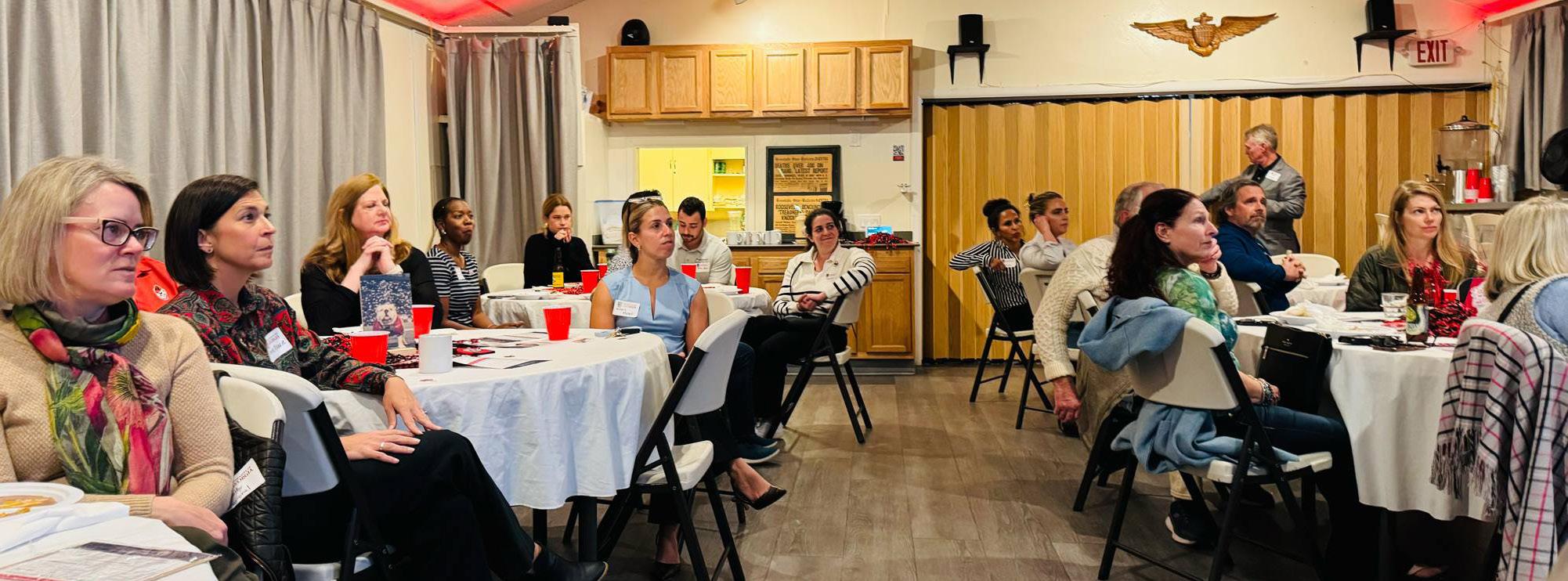
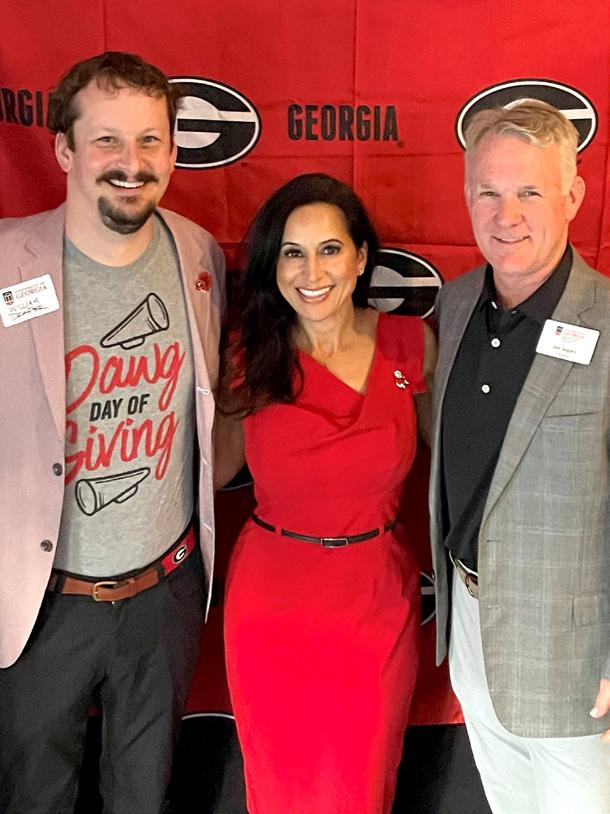
From left: UGA Student Affairs Associate Director of Development William Draper, San Diego Chapter President Tara Shah, and SVRC Director Jon Segars helped to host alumni for a networking event in California.
SAN DIEGO CHAPTER
Chapter President: Tara Shah AB ’98
Number of Local Alumni: 1,082
The San Diego Chapter maintains strong ties to Athens despite the 2,200 miles that separate them. Local alumni host events throughout the year to connect San Diego Bulldogs to each other and to the great developments taking place across campus. In March, the chapter partnered with the SVRC to host former CIA Deputy Director of Counterterrorism Darrell Blocker BS '86 (below) for a networking event at VFW Pacific Beach Post 5985. Blocker discussed the ethics of espionage, and he shared insights into his professional journey and how UGA prepared him for a high-profile government career.
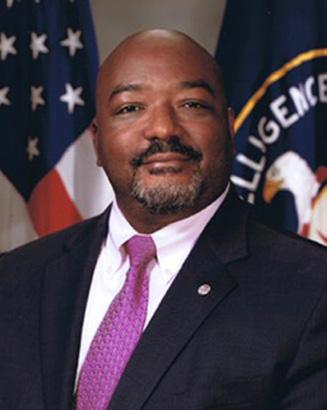
UGA HOSTS FIRST ADVANCING THE ARCH CONFERENCE
The 2025 Advancing the Arch Volunteer Leadership Conference in May brought together 100+ alumni volunteers from boards and councils across campus to enjoy updates from UGA leaders and gain skills and inspiration to help grow the Bulldog network in their communities. Are you interested in sharing your time as a UGA ambassador for a school, college, alumni chapter, or affinity group leadership council? Visit alumni.uga.edu/volunteer-signup.
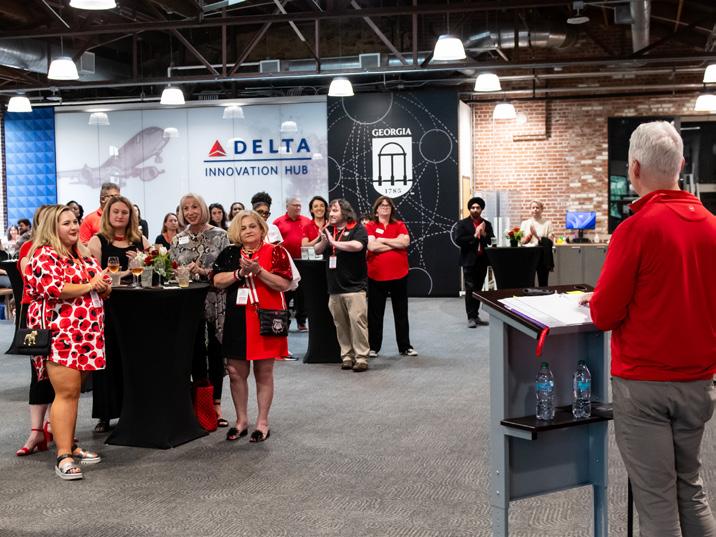
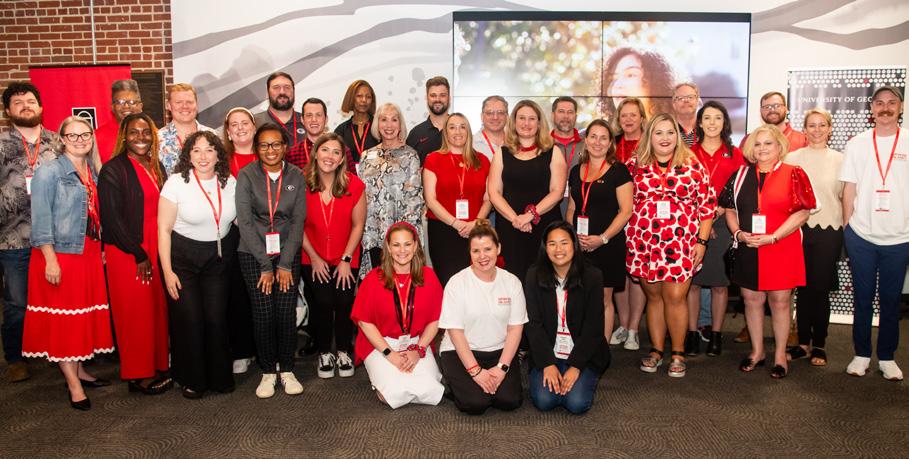
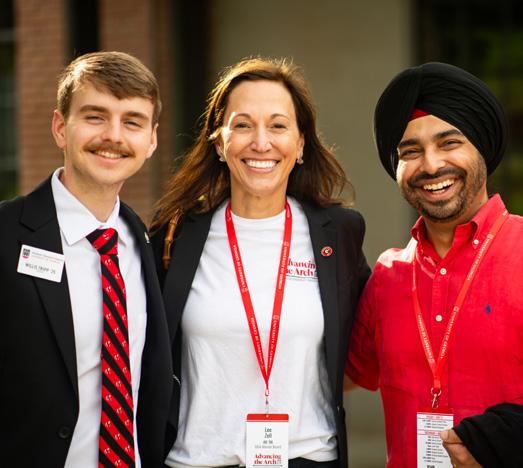
SUPPORT A STUDENT VETERAN THIS FALL
One-third of UGA’s student veterans have limited or no GI Bill education benefits, and many face unique challenges as they pursue a college education following their military service. The Student Veterans Resource Center (SVRC) supports these Bulldogs with transition resources, career readiness, and networking opportunities. The UGA community can assist these students and their families by giving to the SVRC Excellence Fund at give.uga.edu/svrc. Your gift will provide programmatic and student travel support, scholarships, and others awards to these hard-working Bulldogs.
HOST AN INTERN FOR A DAY
“Intern For a Day” is a job shadowing opportunity that allows UGA students to explore a career field by experiencing a typical day on the job. Coordinated by the UGA Career Center, there are virtual and in-person shadowing opportunities and either half- or fullday shadows. Get your company involved at career.uga.edu/hireuga/ifad. Not looking to hire an intern? You can still guide a student by becoming a UGA mentor at mentor.uga.edu.

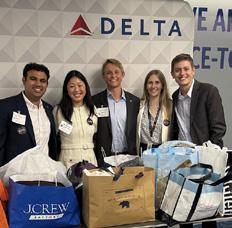

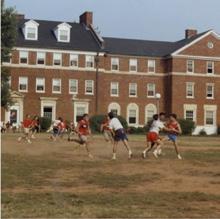
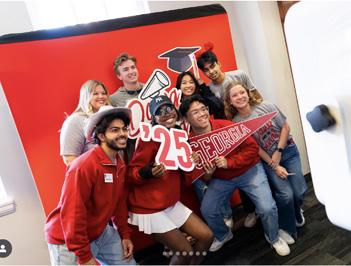
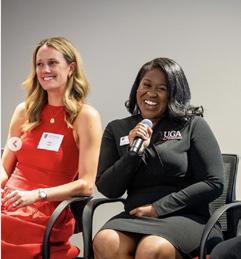
Check out what’s going on for alumni and update your email or mailing address with UGA.


PHOTOS BY JUSTIN EVANS
Bulldogs from across the country gathered in Athens for the first Advancing the Arch Volunteer Leadership Conference. Far right: Attendees like Jaideep Sidhu got to meet student leaders like Student Alumni Council President Willis Tripp and UGA Alumni Board President Lee Zell.
class notes
Compiled by Caroline Newbern and Maura Rutledge
ALUMNI PROFILE
A Dire Response
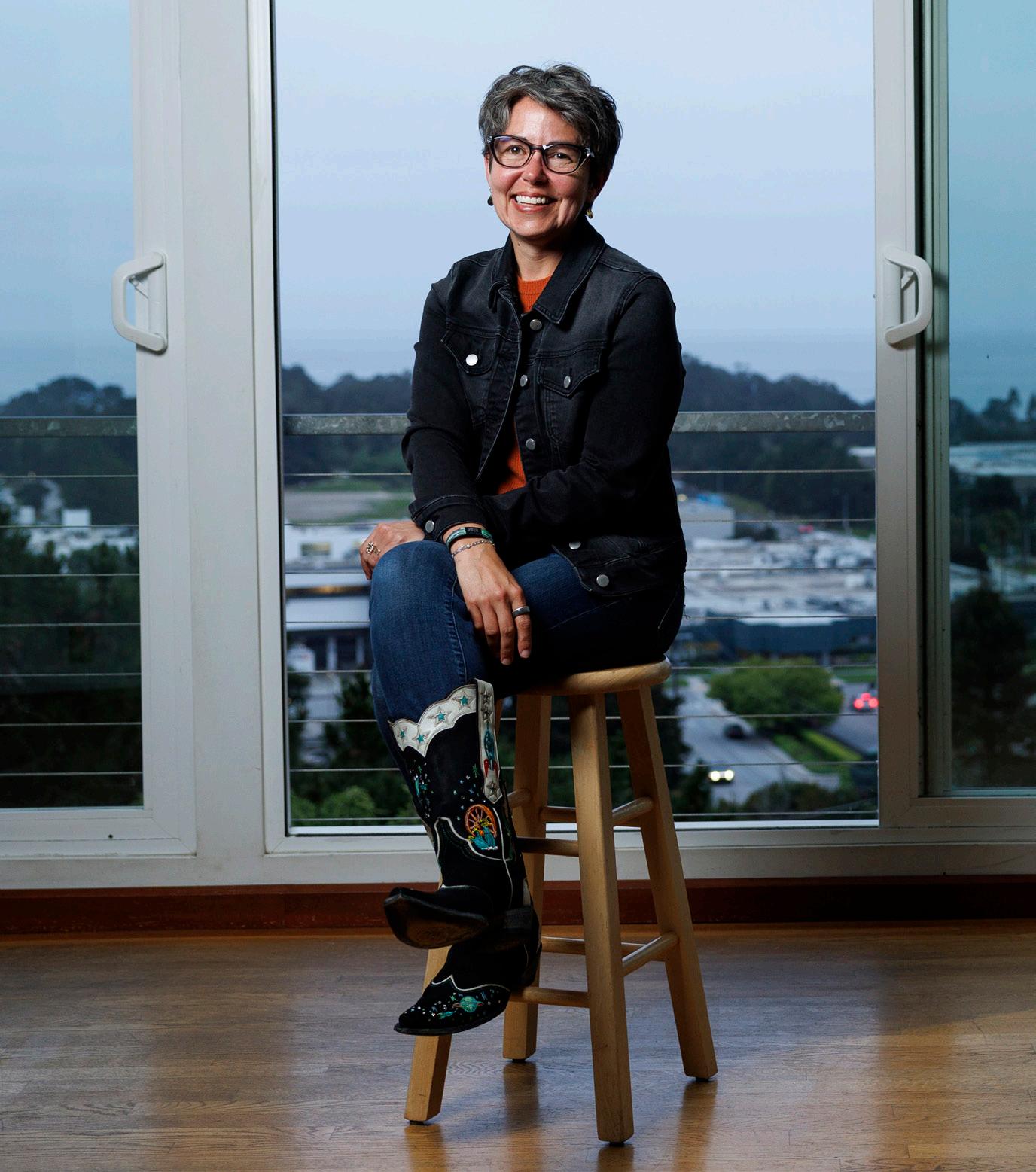
Extinct species are brought back all the time through museum exhibits, the magic of moviemaking, and even the pages of an illustrated book.
But imagine petting the massive, hairy trunk of a woolly mammoth or staring into the peculiar eyes of a dodo.
Beth Shapiro has touched the fur of a living, breathing dire wolf, a species that died off in North America 10,000 years ago. Shapiro BS ’99, MS ’99, the chief science officer of the “de-extinction” startup Colossal Biosciences, helped bring three dire wolf pups into the world
in late 2024 and early 2025 by editing the genes of the gray wolf.
The mammoth, the dodo, and the Tasmanian tiger may be next.
The resurrection, or de-extinction, of long-lost species raises questions. Is it ethical? Is it safe?
For her part, Shapiro addressed these questions in her 2015 book How to Clone a Mammoth, a sort of how-to manual that also considers the opportunities and pitfalls of such an endeavor.
But there is another pressing question: How did Shapiro find herself as one of the leading voices for the once fantastical idea of resurrecting extinct species?
Radio to Rhodes
Shapiro’s journey began as a freshman at the University of Georgia, bent on studying broadcast journalism. The Honors student, who came to UGA on a Foundation Fellowship, lived in the nine-story Oglethorpe House and even got a job as the news director of Magic 102, a local radio station.
It wasn’t nearly as glamorous as she had hoped.
“Let me tell you: Having to get up at 4 o’clock in the morning and go and write the news and be on the morning news show is not compatible with living in a dorm,” she says.
Her perspective on her major shifted when she joined the geology and anthropology field program (now the Interdisciplinary Field Program), an eight-week course that sends students across the contiguous U.S. to learn science onsite at national parks and natural wonders.
ANDREW DAVIS TUCKER
Beth Shapiro, an evolutionary biologist and MacArthur Fellow, helped clone the extinct dire wolf. Before that, she was a UGA Honors student who earned bachelor’s and master’s degrees in ecology.
1963-1974
Tom Johnson ABJ ’63 wrote Driven: A Life in Public Service and Journalism from LBJ to CNN, set to be published this fall, providing insight into his career as an award-winning journalist, assistant to President Lyndon
B. Johnson, and former chief executive officer of the Los Angeles Times and CNN.
1975-1979
Sandra Derrick BSHE ’76, MEd ’80 received the Dalton State
“It was genuinely a transformative experience,” she says.
She ultimately earned ecology degrees from the Franklin College of Arts and Sciences. She also was named a Rhodes Scholar with the opportunity to study at the University of Oxford.
Finding a Mission
There, she began studying ancient DNA, taking trips to Siberia to extract genetic material from the partially preserved bones of mammoths. She helped piece together how mammoths lived and their role in their ecosystems.
In 2009, she received the MacArthur Fellowship, the so-called “genius grant,” and she wrote two books, which considered how what we know about ancient extinctions could be used to curb the ongoing mass extinction, primarily caused by human activity.
In her second book, Life As We Made It (2021), Shapiro argues that humans have drastically shaped our planet and ecosystems.
She wrote, “Within the last 50,000 years, our ancestors hunted, polluted, and outcompeted hundreds of species to extinction. They turned wolves into Boston terriers, teosinte into popcorn, and wild cabbage into kale, broccoli, cauliflower, brussels sprouts, and collard greens (to name a few).”
Humans don’t just shoulder a responsibility, she says; they have an urgent incentive to protect ecosystems.
“Habitats around the world are changing at a pace that is faster than evolution can keep up,” Shapiro says.
Written by Aaron Hale MA ’16
College Inaugural Alumni Legacy Award.
Rebecca Dewald BSEd ’76, MEd ’19 serves as an instructional designer at BJU SCOPE in Greenville, SC.
Sharon Farley BSEd ’76 retired after more than 20 years in
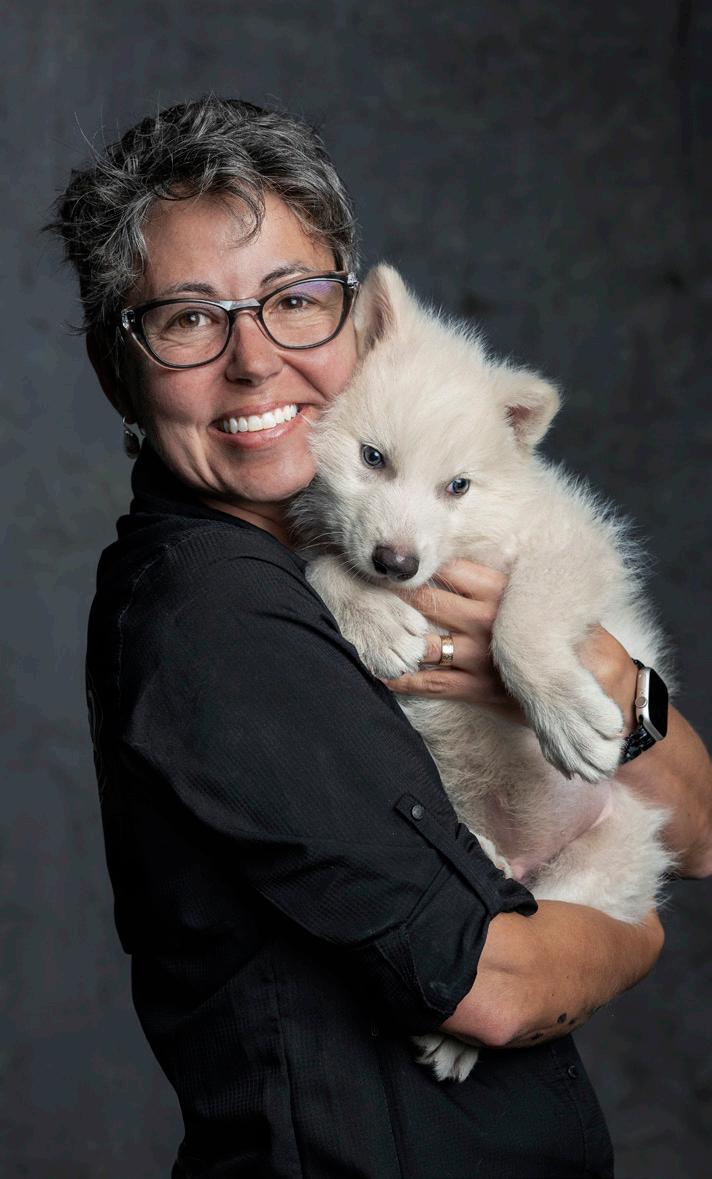
Beth Shapiro holds the third of the clone dire wolves, Khaleesi. She lives with her brothers, Romulus and Remus, in a secure, fenced wildlife preserve in North America.
“Conservation works, but it’s not enough. Our footprint is too big. What we need are new tools.”
In 2022, Shapiro joined Colossal to develop such tools on the company’s quest to clone the dire wolf, woolly mammoth, dodo, and other extinct species.
education as a dance teacher, classroom teacher, and media specialist. She has since competed in the World Poolplayers Tournament playing in the American Poolplayers Association.
The Choice
Romulus and Remus, the first dire wolves in millennia, were born in October 2024. (Technically, these pups are not 100% replicas of dire wolves but gray wolves given their extinct relative’s features.)
“When I think about de-extinction, I imagine that we are resurrecting a key component of an extinct community,” Shapiro says. The goal is to restore a critical function to the ecosystems of today: a hunter to cull species that might otherwise overpopulate or a mammoth bulldozer to tromp down brush and create rich grasslands.
“It’s never going to be possible to bring something back that is 100% identical in every way to a species that used to be alive.
“But we create versions of extinct species that can help to make present-day ecosystems more robust, more resilient in the face of whatever it is that we’re going to throw at them in the next 5,000 years.”
When news of the dire wolves broke in April, reactions ranged from celebratory to cautionary.
Shapiro welcomes the dialogue—as long as we don’t forget what’s at stake: the health of our planet. Refusing to explore the promise of de-extinction technologies, she says, is a choice.
“It is a choice that carries consequences,” she says. “We know what those consequences are: We will continue to lose species, and we will continue to lose this fight.”

Find dire wolf pup photos and a video interview with Beth Shapiro: T.UGA.EDU/DIREWOLVES
Beth Shapiro BS ’99, MS ’99

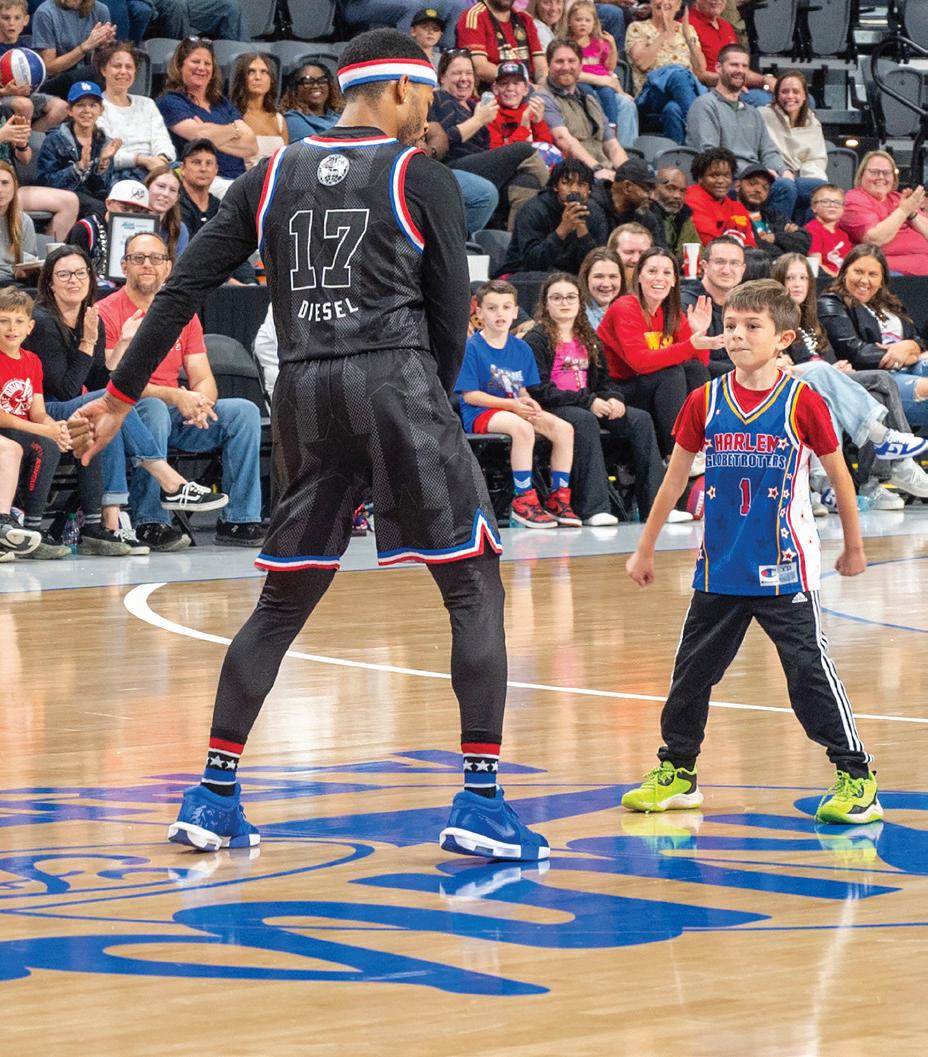
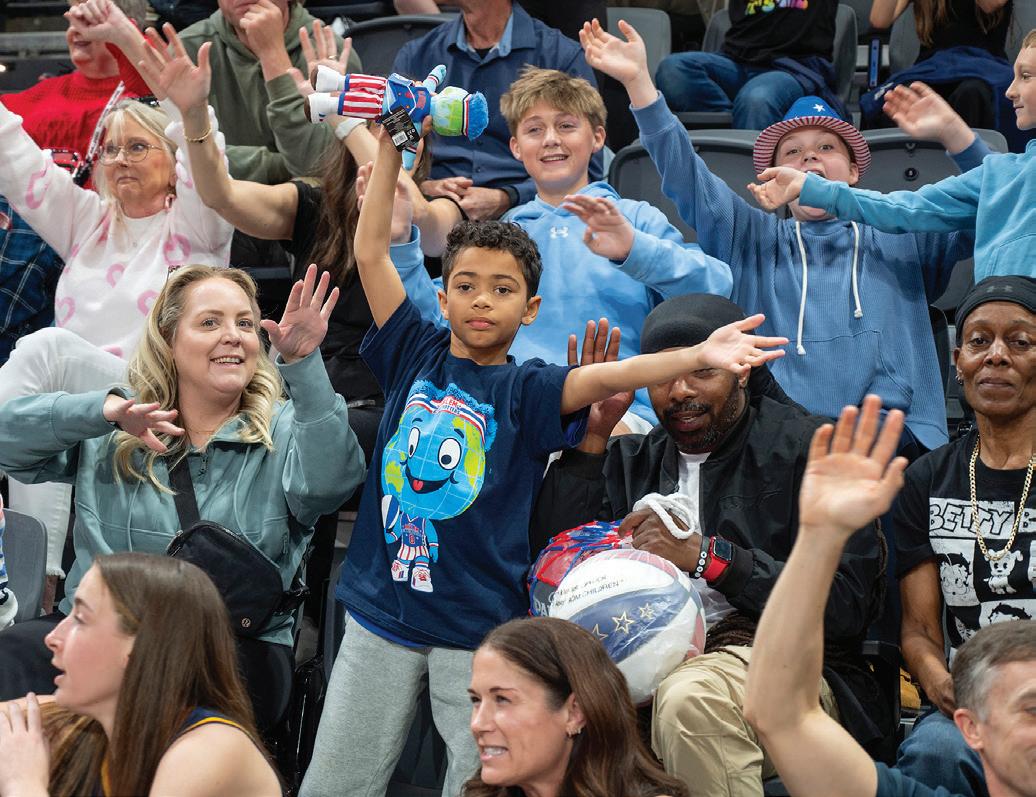
Whether you're into concerts, sporting events, or family shows, create your unforgettable moments at Akins Ford Arena in Downtown Athens, GA.



One Swing at a Time
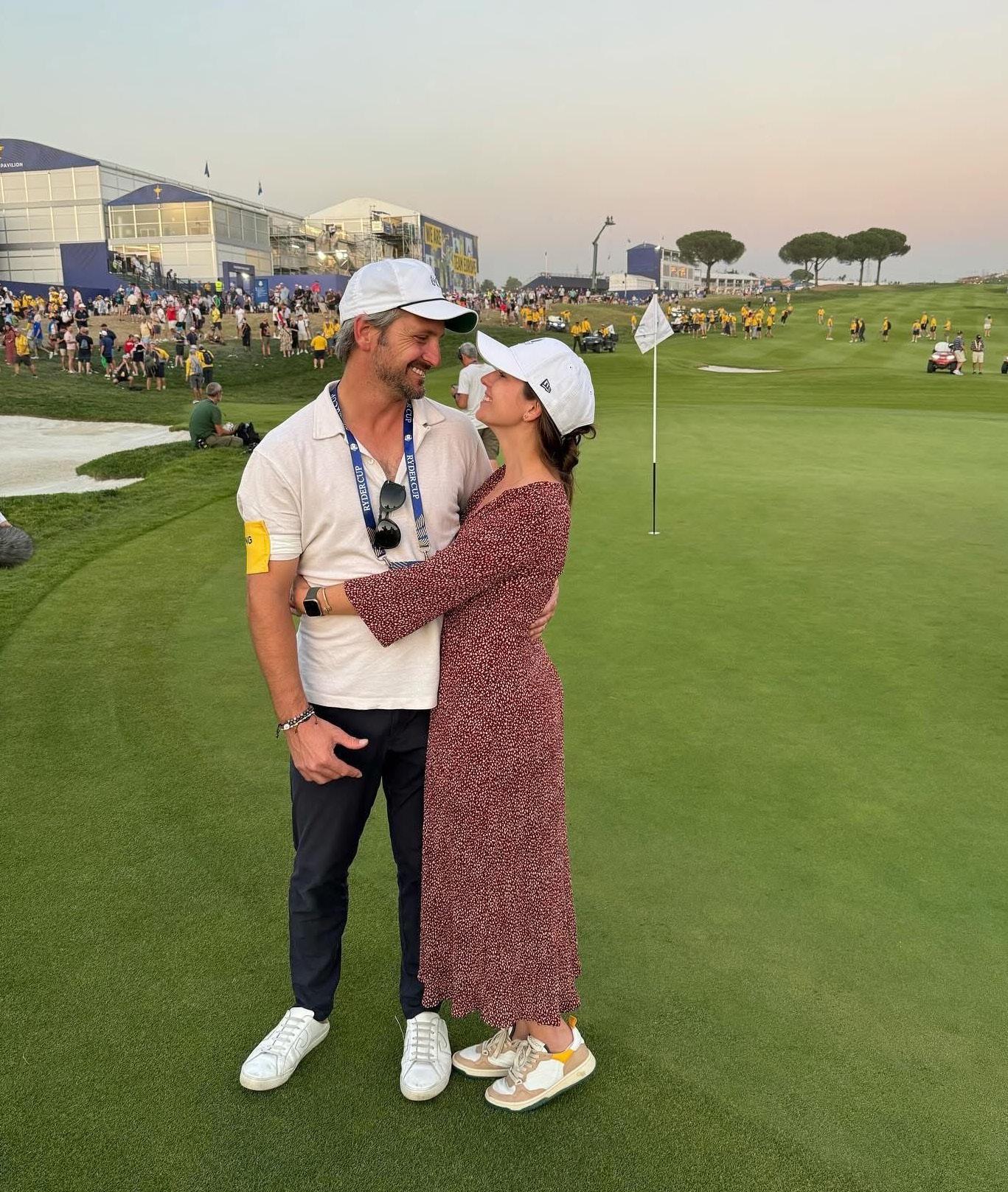

Not many people can say they’re actively working their dream job. But when Chad Mumm stands along the fairways of Augusta National, creating content with some of the best golfers in the world, he can safely declare that he is.
That’s not to say it was an easy find.
“I always wondered, ‘Am I ever going to get that breakthrough?’” Mumm says. “Career progression is a lot like climbing a staircase. You can try to skip steps, but you’ll just end up tripping yourself. Just try to step on every stair and enjoy the walk.”
In founding the golf media company Pro Shop, which produces video content for the PGA Tour and beyond, Mumm ABJ ’08 combines his two biggest passions: golf and multimedia production, something he cultivated at UGA.
“What we’re doing at Pro Shop is the culmination of all the things that I’ve learned in my career. I was always a creative person, and Grady has done an amazing job of training people to do what I do now,” he says.
When Mumm graduated, he had already started his professional career. His senior spring at UGA consisted of a daily commute to Atlanta for a full-time editing gig at Cartoon Network. So when the 2008 financial crisis hit right when he moved to New York, he already knew how to grind through tough times.
Written by Savannah Peat AB ’19
Chad Mumm
Chad Mumm never thought he’d be able to combine his passions of film and golf into a career. At times like this, when his wife Ashley can accompany him to the Ryder Cup in Rome, he still can’t believe it.
“It was hard to find work and to keep hustling my way through a bunch of little odd jobs. I always felt like I was behind everybody else,” he says. “I was looking at friends who had careers or families, and I was just doing little internet videos.”
It wasn’t until he was asked to produce AOL’s Engadget Show (like Inside the Actor’s Studio but for mid-2000s tech) that he got a big break. That Webby award-winning show launched him into the digital media world. He co-launched the technology news website The Verge, which led to the creation of Vox Media. There, after multiple roles, he became the company’s youngest vice president and eventual chief creative officer.
From iPhones to YouTube to Netflix, Mumm witnessed the rapid evolution of the technology landscape and how to adapt to it. Although he earned Emmys and the honor of being named one of Forbes’ 30 Under 30, as a longtime fan of the sport that connected his family, a project focused on golf remained in the back of his mind.
Even though he was established in the media world, Mumm still had his fair share of ideas shut down. When he moved to Los Angeles in 2015, he was reminded he couldn’t always score a hole-in-one.
“Nobody was buying my ideas, and that was a big wake-up call for me because I had put all of our energy into one project, and this company probably had 100 things on their slate,” Mumm says, “But then I got Explained on Netflix. After that, my team I built in L.A. sold another four shows in the next six months, and we were off and running.”
Some of his other TV show concepts, however, were filmed multiple times by multiple networks and never aired.
So when Netflix greenlit a golf docuseries he had always dreamed of making, Mumm was brought full circle. Full Swing goes behind the scenes of the lives of notable PGA Tour golfers.
“I just kept at it and was willing to never give it up. The fact that the show turned into such a big hit was something that I don’t think anybody was expecting,” Mumm says.
Now a producer on more than 50 TV shows, as well as the sequel to the Adam Sandler golf classic Happy Gilmore, Mumm can’t imagine a more perfect combo for him than his favorite work and his favorite sport.
And for those young content creators who think their idea will never birdie, Mumm says there’s more to learn from golf than just sand traps and polos.
“I do think about it as a great microcosm of life,” he says. “Oftentimes, you’ll get handed bad breaks. Sometimes those bad breaks are the result of your poor decision making, but sometimes it’s just a bad bounce. It’s how you recover from those that define you.”
ABJ ’08

Sally Hovis BBA ’78 and Sarah Olson AB ’08, BBA ’08 are partners in their motherdaughter jewelry design business S Carter Designs.
Pamela Shaw Miller BBA ’80 retired after 25 years as the vice president of operations and customer care for The Antigua Group in Peoria, AZ.
1980-1984
Single Family, Land, Hotels, and Vacation Homes in AL, FL, GA, NM, OK & TN

ColeyProperties.com
ColeyProperties@gmail.com
Chris Coley CEO/Founder
UGA Alumnus
Hartman Donor
Basketball Donor
Kendall Simpson BMUS ’82 is celebrating his 30th year at Emory University and serves as the dance department director and theater composer, having scored over 55 productions in Atlanta alone.
Christopher W. Phillips BSFR ’83, MFR ’85, is one of the 2025 Georgia Super Lawyers.
Dave Williams ABJ ’83 retired after a 42-year career at UGA. Williams worked for the College of Pharmacy, the Alumni Association, the Athletic Association in the Bulldog Club, ticket office, and event management offices.
Scott Sink BBA ’84 retired after 40 years working in risk management and insurance.

1985-1989
Donald Hartry BSEd ’87 was honored with the 2024 AT&T Business Diamond Club award, the highest recognition celebrating excellence in sales.
Marie Christine Daum AB ’88 was promoted to librarian associate professor at Kennesaw State University.
Jim Elrod Sr. BSA ’88, BSPH ’90 has been the owner of Dart Drugs & Surgical and the Convacare franchise in Dalton for 31 years. He also serves as the district 1-1 pharmacist for the Cherokee District Health Department.
Scott Fortson BBA ’88 is a financial advisor at U.S. Planning Group and a founding partner of Normaltown Brewing Company in Athens.
Jay Furr AB ’88 has been elected as the chair of the Richmond, VT, Selectboard for a second time.
Edward Toledano III AB ’88 is co-owner of The Gillen House, a bed and breakfast, and wedding venue in Maxeys, GA.
Chan Caudell AB ’89 has been appointed vice president and general counsel of Georgia Transmission.
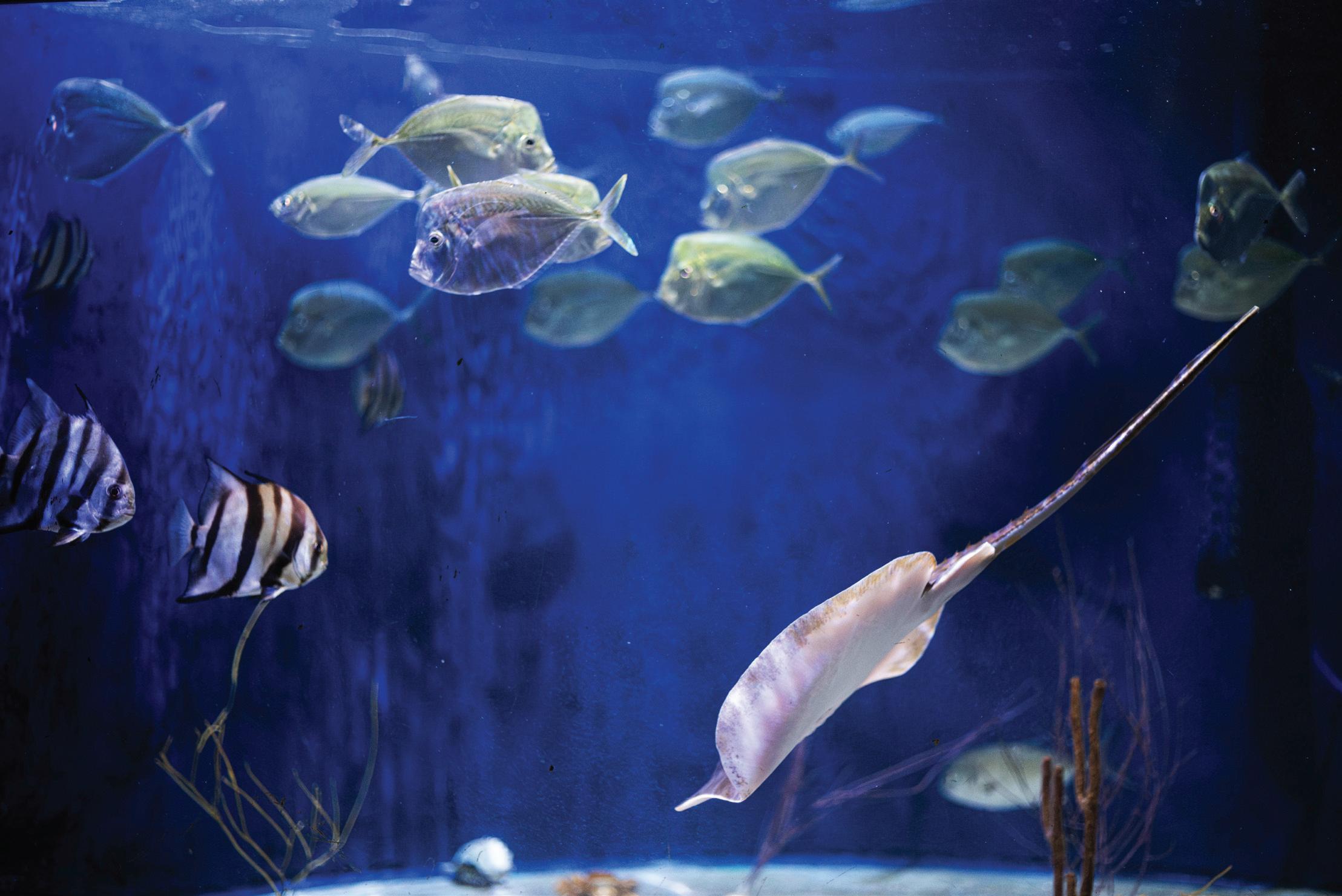
A Fight for Hope
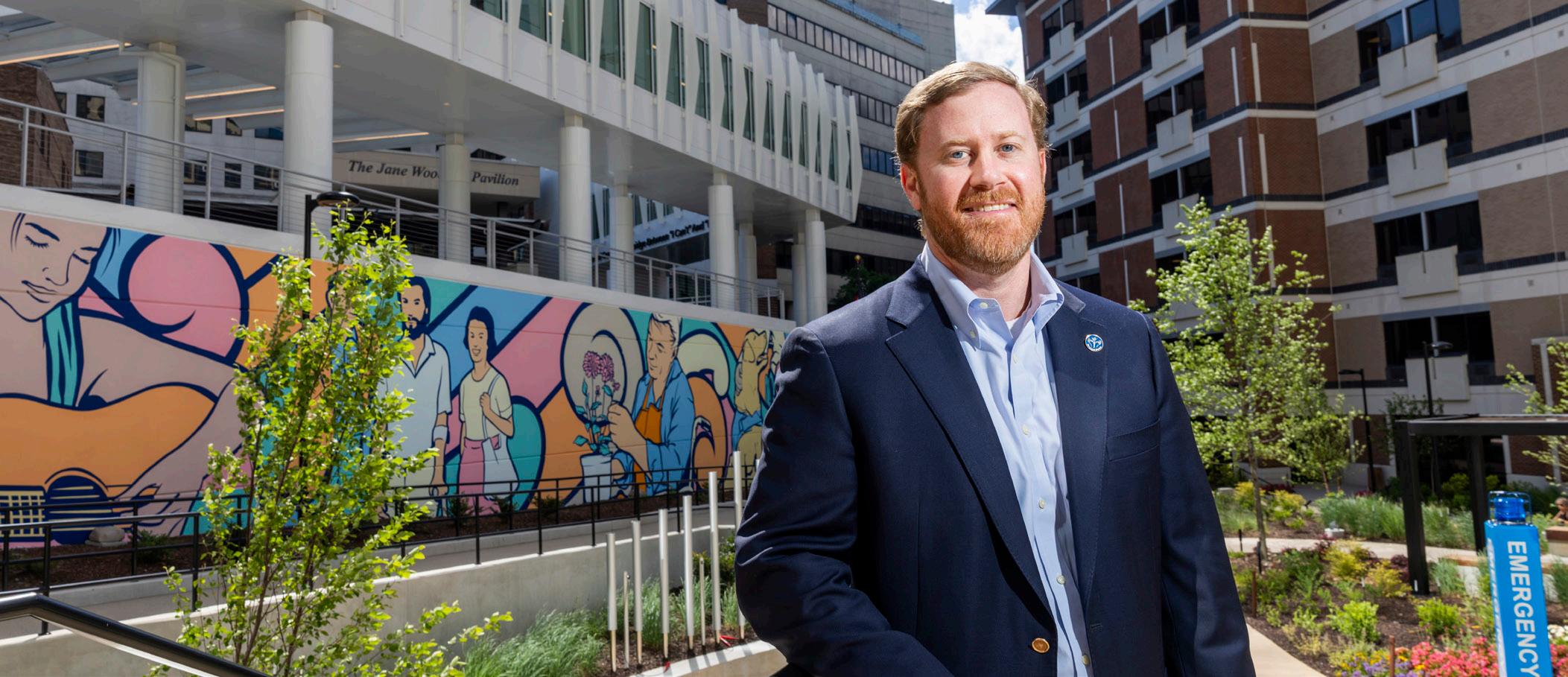
James Shepherd Jr. BBA ’73 was a great dad.
He never missed one of his son Jamie’s practices. And he took his children on adventures around the world.
James also happened to have quadriplegia. James was only 22 when he sustained a traumatic spinal cord injury while bodysurfing off the coast of Rio de Janeiro. He was paralyzed from the neck down.
“I would hear my dad call hotels and say, ‘I’m disabled. I need a special room,’” recalls Jamie Shepherd BBA ’02. “And they’d be like, ‘Oh, yeah, Mr. Shepherd, we got one.’ And we’d get to the hotel, and there’s a bathtub, no walk-in, none of the stuff that he actually needs.
“And that’s the type of struggles this population goes through on a daily basis.”
But James wasn’t alone. He had a dedicated support system—an army of advocates—pushing for better care not only for him, but for others living with life-altering injuries. Many people with similar traumatic injuries aren’t as fortunate.
James received treatment at an advanced rehab facility in Denver, defying the odds and learning to walk again with the help of a leg brace and cane. But James’s parents, Alana and
Written by Leigh Hataway MA ’17
Harold Shepherd, were shocked when they returned home to Atlanta and found care for spinal cord injuries was essentially nonexistent in the South.
The trio set out to change that, founding Shepherd Center in 1975, along with Dr. David Apple Jr. as the center’s founding medical director. What began as a six-bed unit in a local for-profit hospital quickly grew into a world-renowned neurorehabilitation hospital with 152 beds and its own intensive care unit. Over the next several years, it will expand to 200 beds.
Although Harold and James passed in 2018 and 2019, respectively, their legacy lives on through the internationally respected center, now headed by Jamie.
Inspired by his family’s dedication to making life better for people traditional health care facilities give up on, Jamie Shepherd spent the last decade in various roles at the center ranging from board member to chief operating officer.
“We’re a small, independent, not-forprofit private hospital. Patients choose to come here, and they choose to come here just because we’re excellent at what we do,” says Jamie Shepherd, who took over as president and CEO in 2024.
Named one of the best rehab hospitals by U.S. News & World Report for two
decades, the center rivals much larger hospital systems like the Mayo Clinic when it comes to both quality of care and research. Shepherd Center specializes in care for spinal cord injuries, brain injuries, stroke, trauma, chronic pain, multiple sclerosis, and other neurological injuries and illnesses.
The goal is to restore independence, improve function, and elevate quality of life for a patient population that is sometimes forgotten by larger health care systems, Shepherd says. The care the hospital provides is complex—and often costly. But Shepherd prides itself on its commitment to providing life-changing programs—like recreation therapy and animal-assisted therapy to name a few— even though they’re often unreimbursed costs.
“We fight for hope here. You may not walk out. Your life may look a little different. But it’s still very much a life worth living and worth fighting for,” Shepherd says. “You can still graduate from high school, graduate from college, be a husband, wife, father, son, whatever you want. You can live a meaningful life.
“And it can be fun even if your life now looks a little different than you expected.”
DOROTHY KOZLOWSKI
Jamie Shepherd started out in the construction business, building bridges throughout the state of Georgia, before joining Shepherd Center and eventually becoming its president and CEO in 2024. Shepherd’s father and grandfather helped found the cnter in 1975.
Jamie Shepherd BBA ’02 ALUMNI
1990-1994
Wesley Wicker EdD ’90 aided in the publication of My Baseball Story: The Game’s Influence On America, a commemorative book sharing more than 150 fan stories.
Valerie J. Frey MFA ’92, MAED ’95, a Georgia archivist, wrote Georgia’s Historical Recipes: Seeking Our State’s Oldest Written Foodways and the Stories behind Them, an exploration of the state’s recipes from the antebellum period through World War II.
Heather Majors BFA ’92 illustrated the children’s book Bully Proof
Stacy S. Jensen ABJ ’93 released her debut picture book Before I Lived Here
1995-1999
Eric Bradley BSEH ’95 was elected vice president of region four of the Board of the National Environmental Health Association. Bradley is also the division chief of environmental health with the Douglas County Health Department in Omaha, NE, and serves as the executive secretary and treasurer for the board of directors of the American Academy of Sanitarians.
Jacqueline Curls
year teaching in the Lee County school district in North Fort Myers, FL.
Misti Whitfield Martin BBA ’95 was named deputy commissioner of global commerce for the Georgia Department of Economic Development.
Spence Prior AB ’96, JD ’99 has joined Arkadios Capital as chief legal and corporate strategy officer.
John Wilson BS ’95 is stationed at Marine Corps Recruit Depot on Parris Island, SC. He is also on the board of trustees for the American Academy of Periodontology.
Danie Zealley BSEd ’95 created a book titled Game Day Experience: Athens, Georgia.
Nichole Kuehl AB ’96 has been promoted to chief compliance officer at Asset Advisors Investment Management in Augusta.
Jennifer De Witt BSEd ’97 recently started as a certified travel advisor with Fora.
Chareé Brown BSEd ’98, MEd ’00, MEd ’03, EdS ’07 is an administrative and events coordinator at the nonprofit Light from Light and an administrative operations coordinator, EOSL at Georgia Tech Research Institute.
Christy Griner Hulsey ABJ ’98 is the community programs coordinator at the Greater North Fulton Chamber of Commerce.
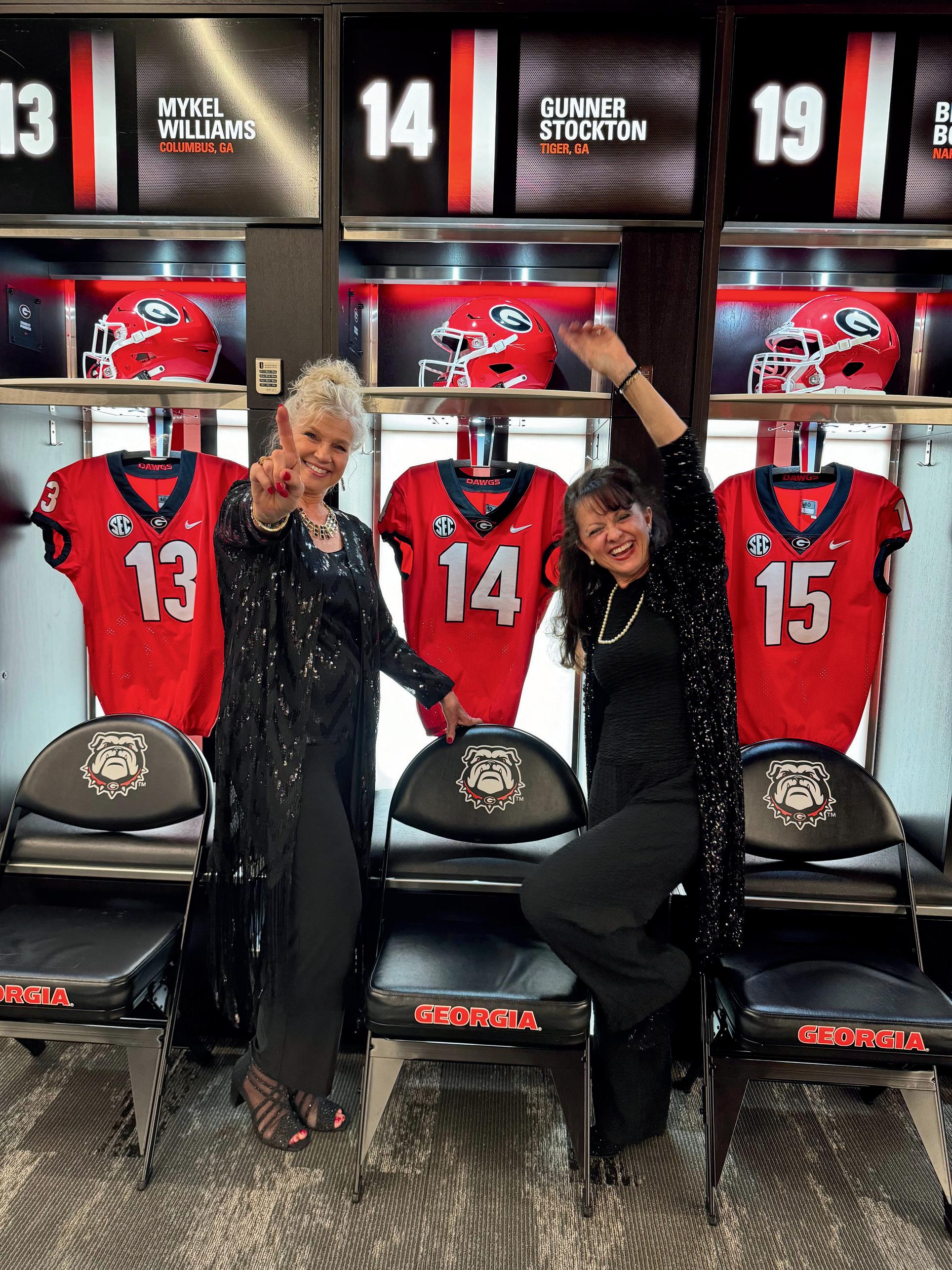
Carl Azuz ABJ ’99 hosted CNN 10 for 14 years before launching a new independent news program, The World From A to Z Robert Guy AB ’99 began his term as president of the Council of Superior Court Judges of Georgia.
2000-2004
Jigisha Pardanani BBA ’03 was selected as a national delegate to represent the Girl Scouts of Southeastern Michigan for a threeyear term.
Christopher Toma AB ’03 was promoted to senior director of distribution for Fortune Brands Innovations based in Chicago.
Evita McDaniels ABJ ’04, AB ’06 is the director of marketing for Signia by Hilton Atlanta. Laura BBA ’04 and Timothy Dominy BFA ’02 own and operate Dominy Construction Group in Norcross.
Jay McDonald BS ’04 is a pain management physician who recently opened his own practice in Southaven, MS, in partnership with Total Pain Care.
Chris Petrocco BBA ’04 serves as national sales director for Keurig Dr. Pepper.
2005-2009
Sean Goldsmith BBA ’05 is the co-founder and CEO of The Zero Proof, a company based out of Atlanta that manufactures adult nonalcoholic beverages
Douglas P. Harden AB ’05 completed the Gies College of Business Strategic Leadership and Management Specialization program at the University of Illinois Urbana-Champaign.
Erin Elizabeth Schroeder AB ’06, ABJ ’06 is the director of human resources for Indeed Flex, a subsidiary of Indeed.
Christy Barry BS ’07 works as a logistics support specialist for the United States Postal Service.
Mike Homer Jr. BSFR ’07, MS ’11 is a fisheries biologist and habitat, and Angler Access Program coordinator for Texas Parks and Wildlife Department. He is also an adjunct professor for Tarleton State University.
Kirk Shook BSEd ’07, MPA ’13, EdD ’24 was elected to the board of directors of Athens-Oconee CASA, a nonprofit organization dedicated to improving the lives of children in foster care in Clarke and Oconee counties.

Adam Kazinec BBA ’08 launched his independent financial planning and wealth management business.
Justin Willson AB ’08 accepted a position as an assistant professor of medieval worlds in the Department of the History of Art at Yale University.
MY GEORGIA COMMITMENT
Getting to know UGA’s most committed Bulldogs
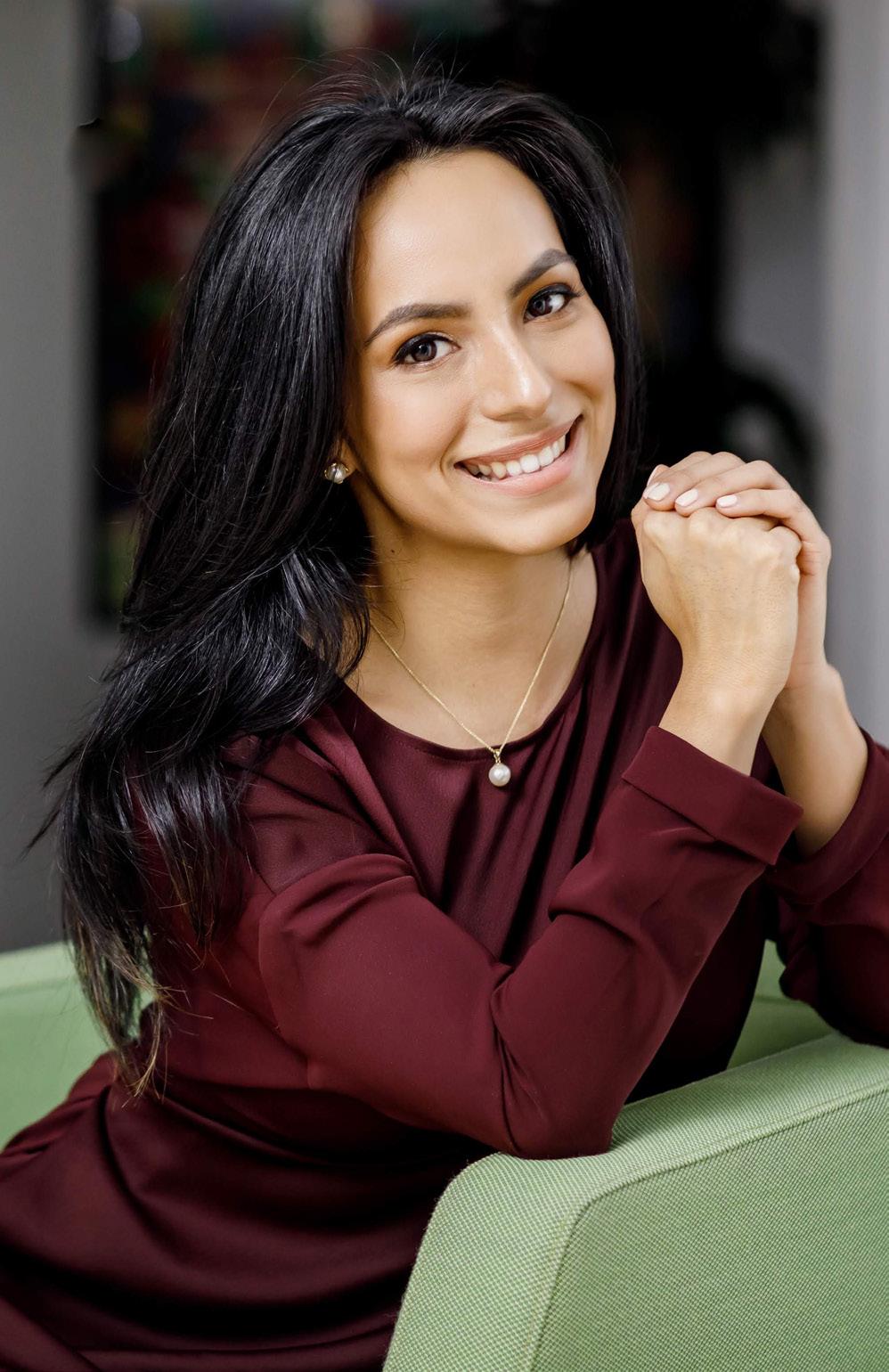
Community means everything to Lucy Pinto. As a senior marketing manager at Google, Pinto BBA ’12, who is based in New York City, spends her time coaching and leading small businesses. At her alma mater, she’s stayed involved by supporting programs and scholarships for students. Pinto’s philanthropy is intrinsically connected to her family in Athens and the friends she made while on campus.
With financial support for programs like the Terry Women’s Initiative, Sea Island Scholars, and student scholarships, she is committed to making an impact on future generations. Last spring, Pinto received the 2025 Young Alumni Award honoring her postgraduate involvement with UGA.
Q: Where does your UGA story begin?
A: My UGA story begins when I was 8 years old and my family moved to Athens from Lima, Peru. I received what we Athens locals call a “Baxter Street education,” meaning I attended elementary, middle, and high school all along Baxter Street. As you can imagine, UGA flags and Bulldogs were everywhere, so I fell in love with the vibrant community and liveliness that the university brings to the area.
Q: What’s one of your most treasured UGA memories?
A: I planned a fundraiser with my sorority, Lambda Theta Alpha, to create a one-time scholarship for students in the Athens area to attend the university. That was so important to me because, as a local, I understand the importance of these resources and using them to give back to the community that surrounds UGA. It also started my journey into philanthropy.
Q: What keeps you connected to UGA?
A: My family lives in Athens, so when I come home to visit, I always try to speak to students and get involved on campus. I feel like I grow just as much from speaking to them as I hope they do from listening to my experience.
Q: Why is giving back important to you?
A: For me, philanthropy is all about community. Everything that happens to the people around me affects me, so I want to help give people opportunities that may be otherwise unavailable to them. I’m a firm believer in “lift as you climb,” so I try to use whatever platform or influence I have to remove roadblocks or level the playing field for others. That’s what philanthropy is all about for me.
Q: What have you learned about UGA that surprised you?
A: Maybe I shouldn’t be surprised, but for the past 10 years, we Bulldogs have really stood our ground and made a name for ourselves in all sorts of industries; it’s been amazing to see us position ourselves so strongly in a relatively short amount of time.
Q: You were honored with UGA’s 2025 Young Alumni Award. What did it mean for you to be honored this way?
A: I think whenever you get involved with philanthropy or community service, there’s always this thought of, “Am I doing enough? Is there more I should be doing?” Receiving that award was so humbling because it made me feel like the university really sees value in the work I do. It was also a special day because my friends and family got to celebrate with me, and I got to bring them to campus and show them around this place that meant so much to me.
Lucy Pinto is committed to setting students up for success. The senior marketing manager at Google joined the UGA Alumni Association Board of Directors in July.
2010-2014
Lina Alvarez AB ’10 owns the pottery studio
Good Dirt LA, which was featured as one of the “10 places to pick up a new hobby taught by Latino Angelenos” in the LA Times.
Hans Appen BBA ’11 launched a community newspaper in DeKalb County called Decaturish Ink
Anna Hall BSEd ’11 has developed the privateby-default menstrual wellness app Embody.
Jilian McLendon BFA ’12 expanded Rebel Boudoir, her Atlanta-based studio, to include a second branch in Kansas City, MO. McLendon also earned her private pilot’s license and is advancing to achieve her instrument rating.
Macy Marie Holmes ABJ ’13 serves as a marketing director for travel and home at Condé Nast.
2015-2020
Dr. Brandon Fram BS ’15 is an ophthalmologist specializing in retinal surgery for Georgia Eye Institute in Savannah.
Mary Bostwick Russell AB ’15 was recognized as one of the 2025 Rising Star lawyers.
Devon Griger ABJ ’15 joined the Martin and Miller Atlanta office as an associate attorney, primarily representing clients in the construction industry.
Alex Edquist AB ’16, MA ’16, co-founder and CEO of Good Agriculture, was recognized with the Regenerative Ag Innovation Award, following her win of the Fintech South Innovation Showcase Challenge.
Taylor Dixon AB ’15 is a program safety manager for McGhee Tyson Airport in Alcoa, TN.
Clayton Collins BSFCS ’18, BSFCS ’18 is a strategic account executive at Global Healthcare Exchange.
Zachary Fram BBA ’18, MAcc ’19 is an audit and assurance manager for Deloitte and was recently accepted for a two-year work abroad program in Zurich, Switzerland.
Kalina Reini BSES ’18 joined the U.S. Cattlemen’s Association as the director of policy and public affairs.
Victoria Hood BSHP ’19 received her master’s degree in nursing from Augusta University and is a registered nurse working in the intensive care unit at Northside Hospital Atlanta.
Julia Koslowsky AB ’19 graduated from the University of St. Andrews with a Master of Letters in Medieval English in Scotland. She is now a copywriter at Insight Global in Atlanta.
Dan McCann BBA ’19 is an attorney for Swift, Currie, McGhee & Hiers in its Atlanta office.
Madeline Fairley BSHP ’20 received her master’s in nursing from Augusta University and is currently working as a registered nurse in the technology-dependent ICU at Children’s Healthcare of Atlanta.
Jordan Meaker AB ’20, AB ’20 manages the full content team at Nexus Marketing, an SEO and digital marketing agency for mission-driven brands.
Amber C. Smith AB ’20 is the public relations specialist for Henry County.
Leah Wu BSA ’20 is a senior research technician at NYU Langone Health, currently researching xenotransplantation and other organ transplant options.
2021-2024
Rebecca Brigdon BS ’21 received her doctor of physical therapy degree from Brenau University and is practicing at the Shepherd Center in Atlanta focusing on post-acute brain injury rehabilitation.
Ari Love AB ’21 is a senior management analyst at Duty First Consulting, supporting federal health care initiatives.
Carder Peck AB ’21 was promoted to an assistant vice president and deposit operations manager of Irwinton Apex Banking Company of Georgia.

Embracing the Journey
McGee Philbrick falls outside the target demographic of her audience. She knows this.
The 30-year-old is just hitting her stride as the deputy editor of the Magnolia Journal, the namesake publication of Chip and Joanna Gaines’ home and lifestyle empire.
Its audience skews female and is about 10 to 20 years Philbrick’s senior.
No matter, Philbrick is a perfect match for her job.
“I don’t think my voice is that different from Magnolia’s, which has been helpful,” she says. The Gaineses’ Magnolia brand, based in Waco, Texas, is beloved by its millions of fans and imitated by a litany of competitors.
The day before Philbrick AB ’18 graduated with a journalism degree from UGA, she accepted a job offer as a copywriter for Magnolia’s creative team and didn’t look back. By 2023, she worked her way to her current role, serving as one of the editorial leads for the quarterly publication.
“My natural writing voice is more casual and conversational,” she continues. “What’s wonderful about working for Magnolia is that the company has so much heart, and it wears its values on its sleeve.”
Philbrick could just as well be talking about herself.
The Acworth native began studying photojournalism at Grady but soon discovered that her passion was writing. She produced an impressive portfolio as an undergraduate, writing for national publications such as Runner’s World
Midway through her senior year, Philbrick responded to a social media post from Magnolia advertising a job fair for creative roles at the company. At the time, all Philbrick knew of Magnolia and the Gaineses was through their flagship show, Fixer Upper. She and her mom watched Saturday morning reruns during weekend visits home.
Philbrick was one of the 5,000 or so people who responded to the post and was among the 30 invited to Waco to interview. At the same time, she had one eye on Runner’s World to see if a role would open up there. Not knowing which path to take, she prayed to God for guidance.
“I don’t care what happens; I just need you to open the door. Whatever trail you blaze, I will follow.”
Minutes later, Magnolia called with a job offer.
Philbrick’s first writing assignments for Magnolia were emails to subscribers, advertising vases and promoting cookbooks. Her first feature for the Journal appeared in the Winter 2019 issue. It was a profile about world-class women’s middle distance runner Gabe Grunewald. Chip Gaines had met Grunewald in Central Park; she later trained him for his first marathon. Shortly after that, Grunewald was diagnosed with a rare form of cancer, and Philbrick’s profile outlined her fight.
Grunewald did not live to see her story in print. It is a moving piece, revealing Philbrick’s versatility as a writer and the depth of her publication.
“Gabe is still one of my heroes,” Philbrick says.
Written by Eric Rangus MA ’94
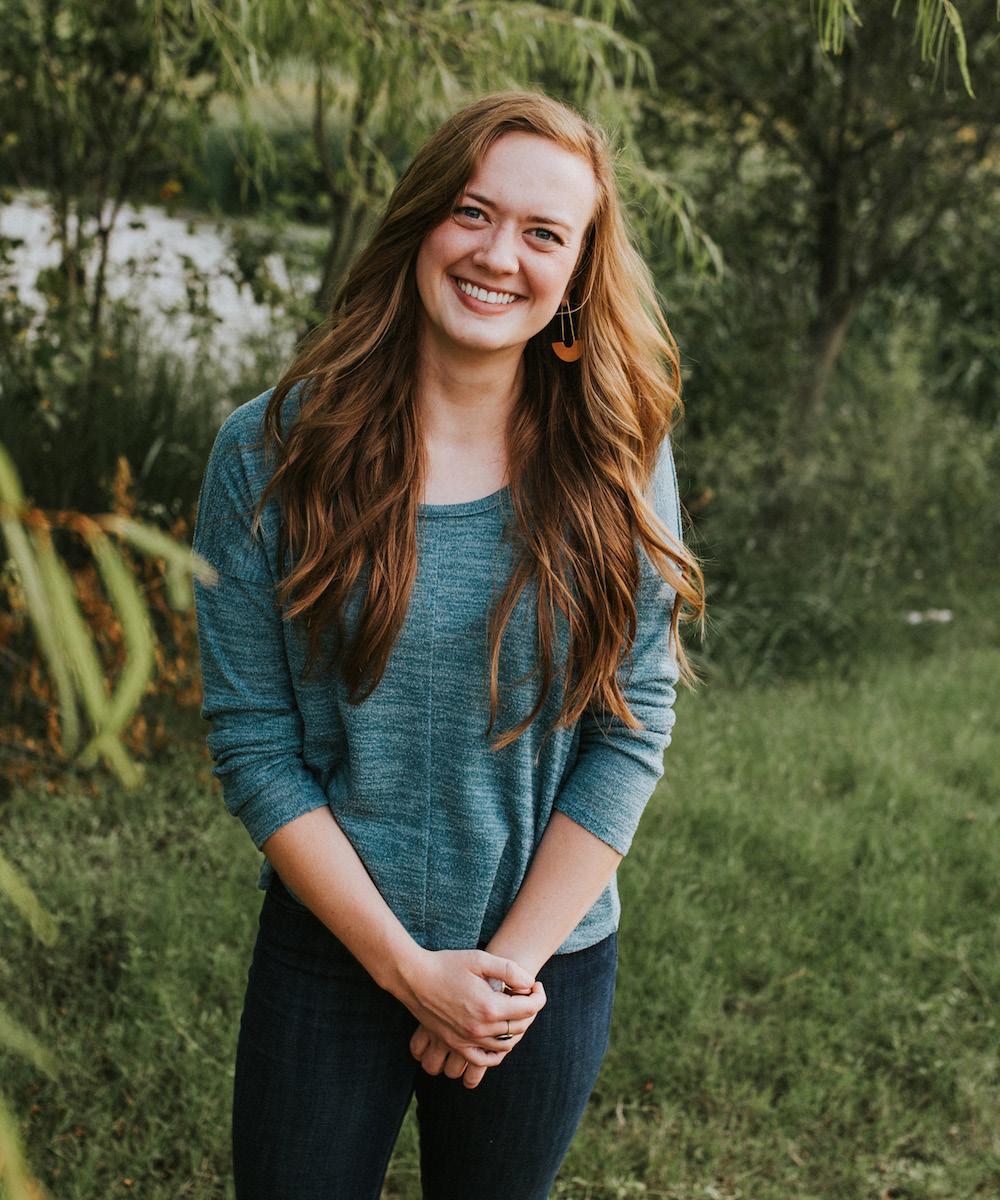
As deputy editor, Philbrick still gets to write some for the Journal, but mostly she shepherds the work of the other contributors. The Gaineses are not involved in the day-to-day production of the Journal, but they write for the publication, attend meetings, are hands-on with ideas and feedback, and determine and help interpret the one-word themes that guide each issue.
“The fall theme is ‘Embrace,’” Philbrick says. “It feels nice. You’ve had your time out during the summer taking risks and taking chances and enjoying the freedom. Now there is this feeling of wanting to come back home and embrace the familiar and the routine. It’s a neat creative exercise.”
While it’s true that Philbrick and many of her co-workers are younger than Magnolia’s core readers, she is fully aware of her role as a brand ambassador, and it is something she—yes— embraces.
“If I can help someone tell their story, I want to serve and honor the person I’m talking to,” she says. “I want to be someone who is casting light and hope and joy in people’s lives, so working at Magnolia makes sense for me.”
SPECIAL
McGee Philbrick is deputy editor of Magnolia Journal, the namesake publication of Chip and Joanna Gaines’ much beloved home and lifestyle empire. Her journey at Magnolia began the day before she graduated from UGA in 2018.
McGee Philbrick AB ’18
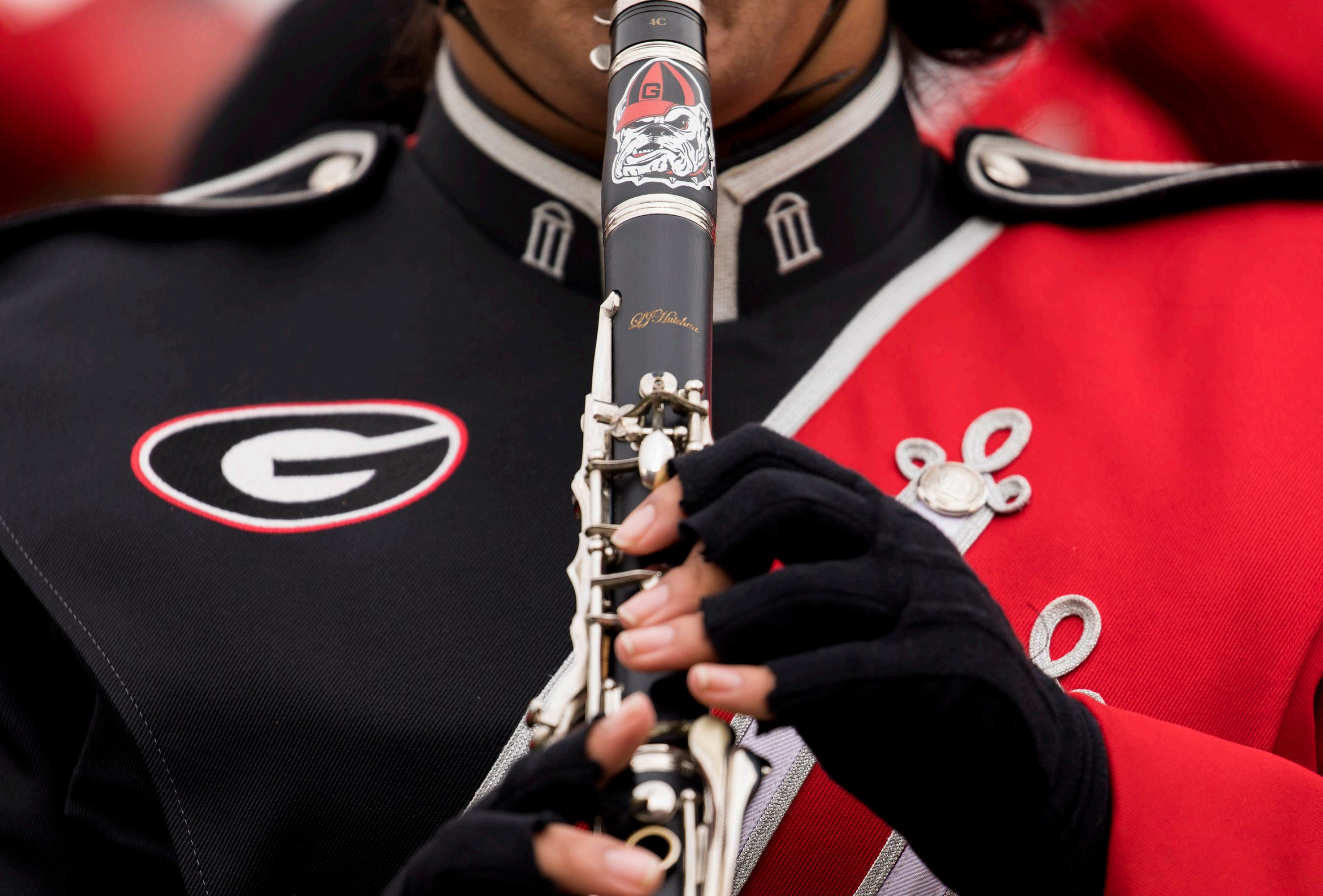
LET’S MARCH FORWARD TOGETHER
For 120 years, the Redcoat Marching Band has been the heartbeat of the University of Georgia. The Redcoats are more than a band — they are a tradition that brings the UGA spirit to life. GIVE.UGA.EDU/REDCOATS
We are raising funds to enhance the experience for the dedicated students who pour their time and talent into the band. From brand new uniforms to a new tour truck, your gift will ensure that the beloved tradition of the Redcoats will live for generations to come.


A Life in Translation
More than a century ago, French novelist Marcel Proust began writing what would one day be considered the longest novel ever written, In Search of Lost Time, a sprawling multi-volume masterpiece with more than a million words. Renowned for its lushly introspective and elaborate prose, the work poses a formidable challenge to any reader. But for William Carter AB ’63, MA ’67, teaching and interpreting Proust’s novel became a lifelong passion.
Carter’s journey began far from the salons of Paris. Born in small-town Jesup, he discovered a love of language at the University of Georgia. For many, French 101 is a blur of irregular verbs. For Carter, it became a singular passion.
“I loved it immediately,” he says. “I wasn’t even sure what I wanted to major in when I came to UGA, but once I took that first class, I never looked back.”
In 1965, Carter won a Fulbright scholarship and traveled to France to study at the Université de Strasbourg. There, he immersed himself in the language. He also met his wife of almost 60 years, Lynn Goudreau, a fellow Fulbright scholar. They went back to the United States together. After completing his master’s at UGA, Carter took a job teaching at Indiana University while he completed his Ph.D. in French. It was during his Fulbright year in France that Carter met his lifelong subject.
“I couldn’t help but be drawn to Proust,” Carter says. “When I read his writing, it’s like music. It’s just beautiful.”
Few living people know Marcel Proust (pronounced “Proost”) better than Carter. He has spent decades in conversation with this 20th century French novelist, decoding his famously layered prose and helping Englishspeaking audiences access it without diluting its complexity.
At the University of Alabama at Birmingham, where he spent the bulk of his career, Carter taught French courses on Proust. His lectures were known for bringing Proust’s revelations of late 19th century France and the World War I era to life.
“When in France, I would take slides of places Proust wrote about and use them in lectures,” he says, blending the visual and literary to capture the essence of Proust’s world.
Carter soon set out to create what renowned literary critic Harold Bloom called the definitive English-language biography of his favorite author. Marcel Proust: A Life, published by Yale University Press in 2000, became a New York Times Notable Book of the Year. In 2024, it made the New York Times Book Review’s list of best nonfiction books from 2000 to 2023. This work established Carter as one of the leading Proustian scholars in the world.
But Carter didn’t stop at the written word. In 1993, he coproduced Marcel Proust: A Writer’s Life, a PBS documentary that brought Proust’s Parisian world to the screen. And when the celebrated early 20th-century English translation of In Search of Lost Time by C.K. Scott Moncrieff entered the public
Written by Jayne Roberts
William
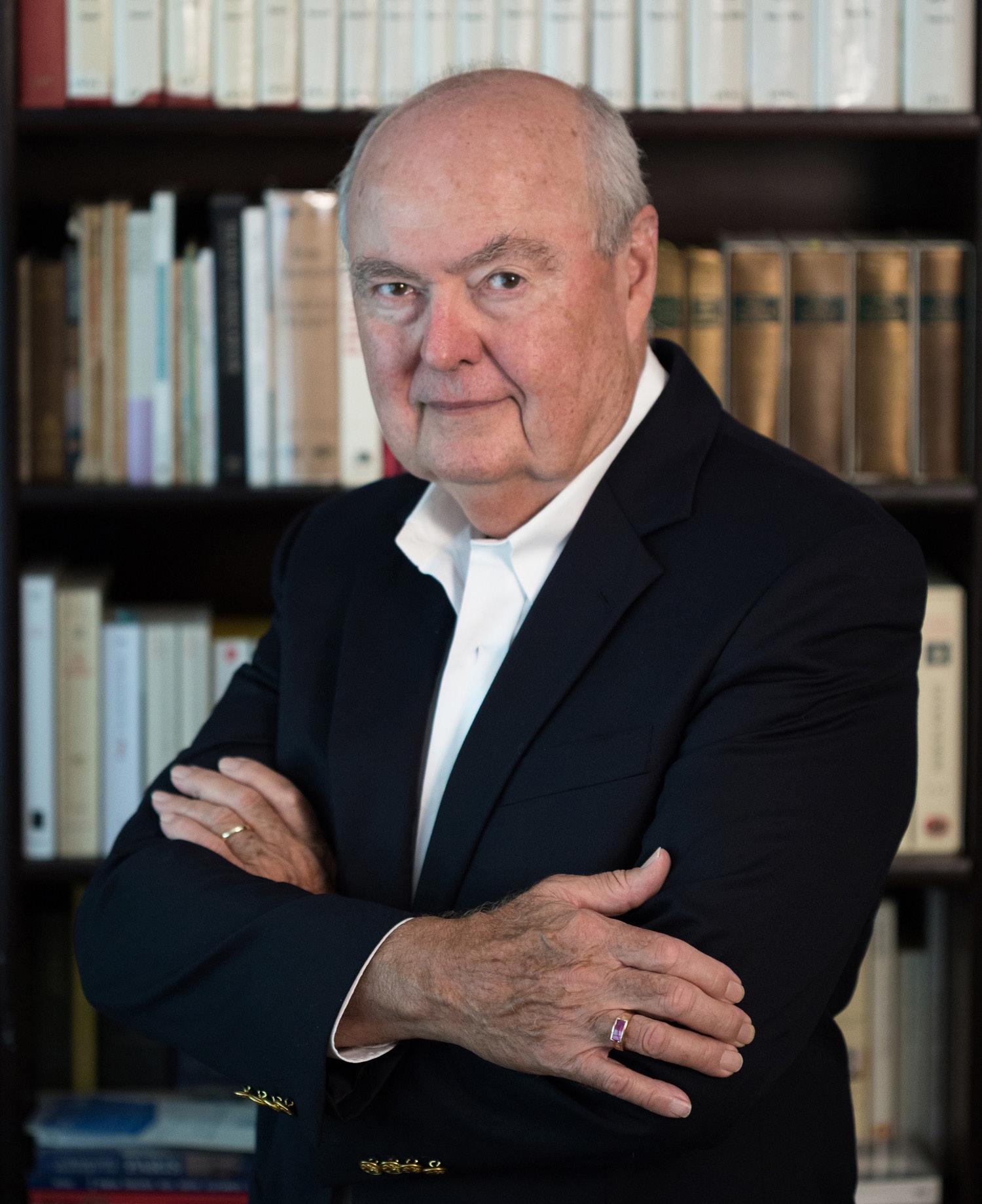
domain, Yale University Press tapped Carter once more—this time to produce a revised and annotated edition of the novel.
The task was monumental: six volumes, hundreds of pages each, with every word weighed against the original French. But this labor of love was worth every sentence to Carter.
“Great works of literature aren’t just words on a page,” he says. “They’re about us, about the reader, about the human experience. His work is a many-layered thing that you want to read over and over again. And that’s why we keep coming back to it.”
Now in his 80s, Carter continues to write and lecture in English and French, maintaining his ties with the literary world. He has also served on the editorial board of the Proust Journal (Bulletin Marcel Proust) in France for nearly 50 years.
After a lifetime of writing and translating, Carter’s dedication affirms what Proust himself suggested, that “the real voyage of discovery lies not in seeking new landscapes, but in having new eyes.”
“At the very end of In Search of Lost Time,” Carter says, “the narrator uses the analogy of a pair of glasses to talk about the book he’s writing. He says that if they enable you to see and understand the world better, fine. But if not, throw the glasses away and get another pair.”
William Carter is perhaps the world’s most knowledgeable scholar on the works of 20th century French novelist Marcel Proust.
Carter AB ’63, MA ’67

Cannon Gaines BSEd ’22, MS ’23 created Gaines Group Activations, a full-service creative NIL firm that supports brands in marketing campaigns with student athletes.
Alexa Hernandez AB ’22, AB ’22, JD ’25 graduated from the University of Georgia School of Law and will join the Georgia Lottery Corporation as an attorney.
De’Omini Daniely AB ’23 is starting a fulltime job as a fellow with the A.J. Fletcher Foundation, where she will be learning about philanthropy work and its role across North Carolina.
Jhenna Daugherty BS ’23 will be attending Mercer Medical School in August.
Mason Koski BSHP ’23 is working as a realtor in Atlanta.
Fernanda Lima BSW ’23, MSW ’24 is a mental health therapist at Steady Hope Counseling in Decatur.
Carly Lobdell BBA ’23, BBA ’23 opened a swim school, Oconee Flippers, in Athens.
Matthew Tesvich BBA ’23 founded Skunk Skin, formerly known as OX SOX, which sells odor-eliminating performance socks.
Trinity Travis BS ’23 is a student ambassador at Southern College of Optometry in Memphis, TN.
Hieu Vu BS ’23 is in graduate school at the University of Tennessee Health Science Center College of Pharmacy.
Janelle Booker BBA ’24 is a process improvement analyst at J.P. Morgan Chase, part of its Operations Analyst Program in Dallas, TX.
Ashleigh Hays AB ‘24, BBA ’24, BBA ’24 won the University National Powerlifting America 84 kg weight class, squatting 162.5 kg, benching 100 kg, and deadlifting 182.5 kg. Hays is currently pursuing her master’s in international policy at UGA.
Grace Noble BS ’24 is a group sales executive at Renaissance Life and Health Insurance Company of America.
John Provence BSCE ’24 is a traffic engineering analyst for Kimley-Horn, a civil engineering design firm in Columbia, SC.
Anthony Roper BSME ’24 is a production engineer at Pratt & Whitney working on the F-22’s F119 engine at Tinker Air Force Base, OK.
David Thigpen AB ’24 is a field representative for Turning Point USA.
2025
Andrew Gu BS ’25 is becoming certified to work as a phlebotomy technician to gain clinical experience before applying to medical school.




Love at First Bite
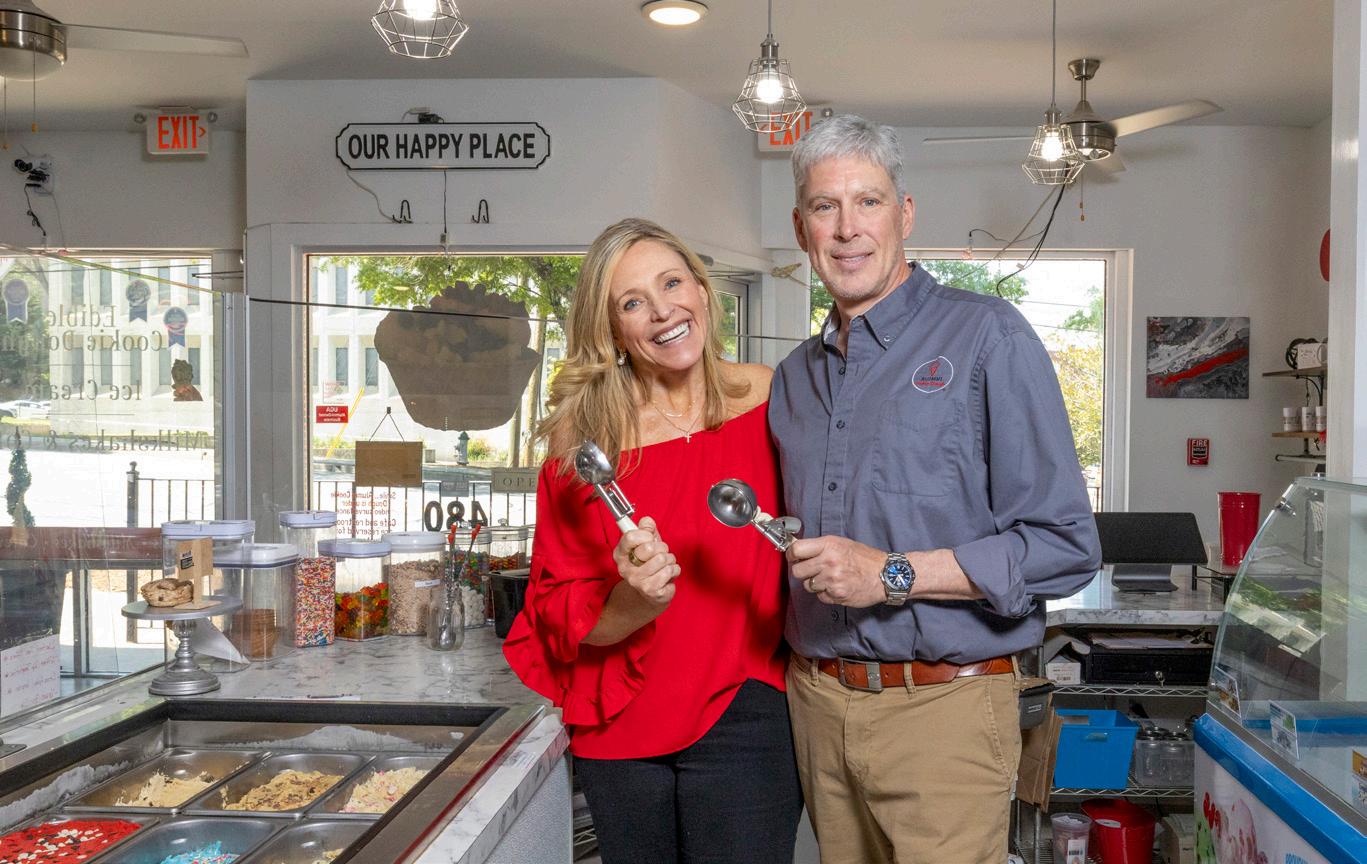
Jennifer BSFCS ’95 and Mike BBA ’90 Dollander have a deep love for three things: each other, Athens, and sweet treats.
In 2019, they combined those passions to create Alumni Cookie Dough, a nowbeloved Athens cafe serving up inventive takes on cookie dough, milkshakes, and ice cream. Since then, the Dollanders have turned their dessert shop into a go-to spot for both students and longtime locals craving a taste of nostalgia and indulgence.
The idea for the cafe emerged in 2018 when Jennifer and her daughter Stephanie visited a cookie dough cafe in New York. They were hooked. The edgy vibe of Greenwich Village reminded Jennifer of the Classic City, and one question kept entering her mind: Why is this not in Athens?
By the time Mike picked them up from the airport three days later, he had the LLC. The following fall, the couple found a vacant storefront just down the hill from the Classic Center while taking a stroll on a date night. It was the perfect spot for the business and an ideal opportunity to make an impact on the community that had such an impact on their lives.
“We had our first date at 5 Bar. We got married in Athens,” Jennifer says. “This
Written by Maura Rutledge
will always be home, and this cafe will always be home base for Alumni Cookie Dough.”
For the cafe’s first six months, lines of intrigued customers wound out the door and down Thomas Street. The crowds are more manageable these days, but the cafe’s popularity continues.
“We want people to come in and feel that this is a safe, fun, family environment,” Mike says.
Alumni Cookie Dough offers an array of flavors, including red velvet, birthday bash, and the classic chocolate chip cookie dough. The Dollanders are constantly changing the menu to include new and seasonal flavors.
“Since I was a little girl, I’ve always loved baking, but I would always lick the spoon and scrape the bowl. That was always my favorite part, way above and beyond the baked final product. I enjoyed the dough,” Jennifer says.
The shop’s fan-favorite dough wasn’t just a happy accident. From the beginning, Mike and Jennifer were committed to both flavor and food safety. They partnered with UGA’s food science lab to perfect their recipes, testing methods to safely heat-treat the raw flour and eliminate harmful bacteria. The result? A delicious, ready-to-eat dough that’s completely safe to enjoy and store.
Jennifer Dollander BSFCS ’95
Mike Dollander BBA ’90
Running the cafe is a true partnership. Jennifer serves as the creative force, devising recipes and new flavors, while Mike’s background in health care management helps him lead the business side.
“We work well together and really respect each other,” Jennifer says. “I think that is the foundation for any relationship or business partnership, and I am lucky to have it all wrapped into one.”
The couple continues to support the university through percentage nights and fundraisers. This allows for both the business and partner organizations to make an impact on their hometown.
Jennifer noticed how complicated fundraising can be, especially for students. She wanted raising money to be simple and easy for both the organizations they partner with and customers themselves. For instance, Alumni Cookie Dough has partnered on events with UGA organizations such as Greek Life and the Office of Student Affairs.
“We have appreciated Alumni Cookie Dough’s support for Student Affairs programs over the years, from events ranging from Welcome UGA’s First Night to our annual staff appreciation. Everyone is delighted when they see Alumni Cookie Dough on the table!” says Stan Jackson AB ’06, MPA ’18, PhD ’23, assistant to the vice president for student affairs.
As the company continues to grow, Mike and Jennifer want to remain focused on the impact they are making on their community while also rolling out Alumni Cookie Dough to restaurants, grocery stores, universities, and event venues nationwide.
“This little cafe started out as just a side hustle—something to bring in a little extra income for retirement. It was just a couple of Georgia alumni running a small business downtown,” Mike says.
“But it’s grown into something much bigger: the idea of multiple locations, franchising, and now a wholesale program with hundreds of wholesale locations across the country.”
CAROLINE NEWBERN
At their downtown Athens cafe, Alumni Cookie Dough, Jennifer and Mike Dollander strive to provide their customers with tasty and safe treats, that you simply cannot resist.
A People Person
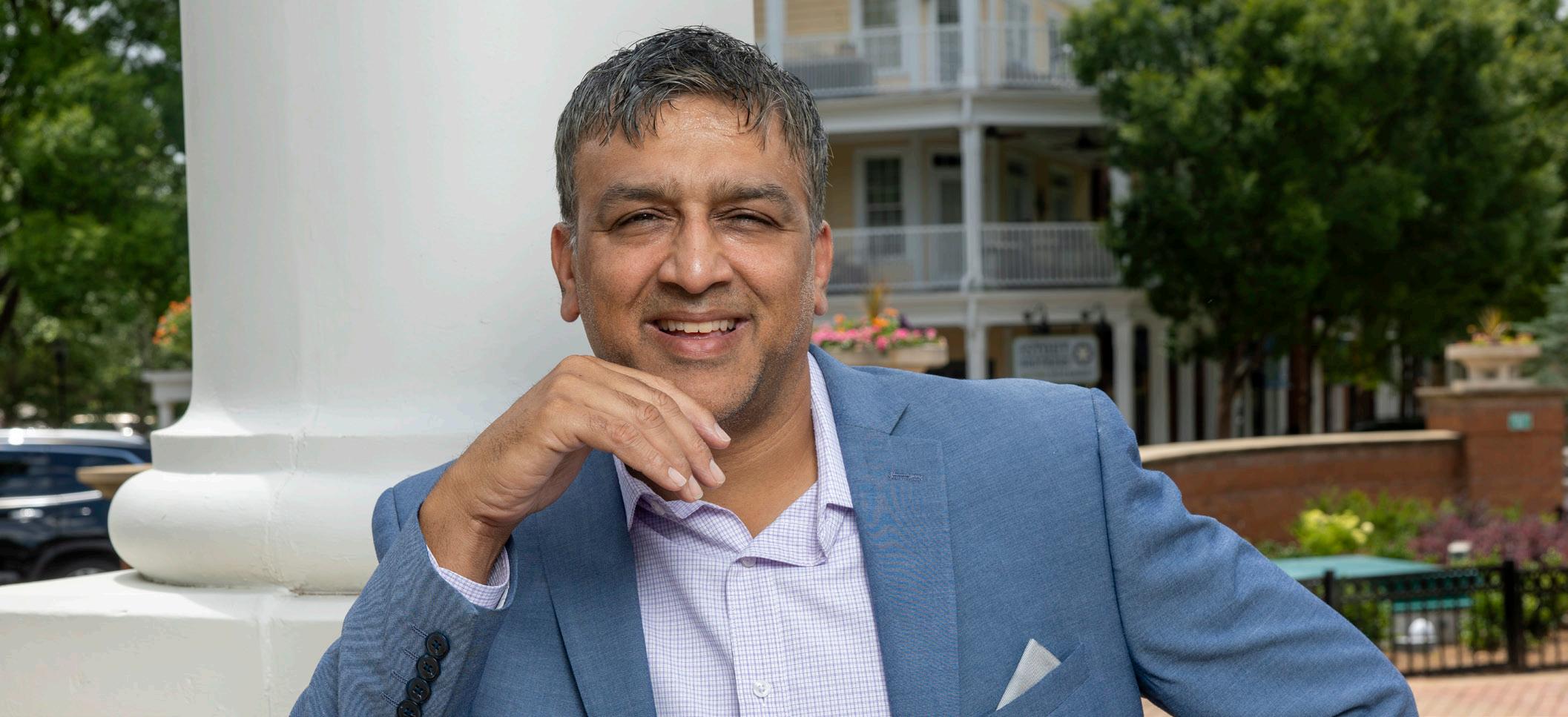
Tarun Ganeriwal attributes his business success to two things: focusing on people and building a strong company culture.
“I interact with my employees a lot, and I think a lot of times, people don’t know that I’m the CEO—that’s great,” Ganeriwal MBA ‘09 says. “It’s so important to take care of your people. If you do, they’ll take care of your clients, which will eventually take care of the business.”
That philosophy has gotten him far and earned his company, KBH Solutions, the No. 1 spot on the 2025 Bulldog 100 list of the fastest-growing businesses owned or operated by University of Georgia alumni.
KBH Solutions specializes in providing highly skilled, technical professionals to the energy, power, and construction sectors, delivering far more than typical staffing. Ganeriwal’s team offers project management, engineering, and consulting expertise, helping clients tackle complex challenges in areas like nuclear energy, hydropower, and fossil fuels.
But Ganeriwal didn’t always anticipate becoming an entrepreneur. He earned an undergraduate degree in engineering from Virginia Tech and went straight to work for General Electric, where he stayed for nearly two decades.
Written by Ireland Hayes AB ’23
While working full time in Atlanta, Ganeriwal pursued an executive MBA at the Terry College of Business. He was drawn to the program’s flexibility, which allowed him to balance work, family, and his studies.
The program not only sharpened his financial expertise but also opened his eyes to entrepreneurship. Surrounded by classmates who were launching startups and steering big companies, Ganeriwal’s ambition to forge his own path intensified. In 2018, he launched KBH Solutions.
The company has grown steadily, and now employs around 120 people, including Ganeriwal’s son and fellow UGA grad Kyle BBA ’20. KBH Solutions has also expanded through joint ventures like its sister company, KBH Thompson, which focuses on construction services. Throughout this growth, Ganeriwal has focused on maintaining a close-knit team, like celebrating birthdays with handwritten notes to make sure his employees feel valued and supported.
Ganeriwal feels fortunate to find great talent, largely through employee referrals, and he believes the company’s culture makes that possible.
“If people feel valued in their work, they want more of their peers to experience that, too,” he says.
For Ganeriwal, giving back to his community is equally important. In 2007, he founded a chess organization, Chess2Children, for students in suburban Atlanta schools. What began as a small after-school club at his children’s elementary school has grown into a program that reaches more than 500 children.
“I thought it’d be one semester and done, and 18 years later, we’re still doing it,” he says.
Ganeriwal stays plugged into UGA’s Entrepreneurship Program, judging some student competitions, but wants to find new ways he and KBH Solutions can engage with young professionals in the Terry College of Business and the College of Engineering interested in careers in energy.
“How do we collaborate? How do we not only find the talent, but also educate them on what’s out there in the energy space?” he says. “So if we can help the schools and students find some good resources, we’ll absolutely do it.”
Tarun Ganeriwal launched his company, KBH Solutions, in 2018. It offers professional, architectural, engineering, design, and construction services to partners in the energy industry. Seven years later, KBH Solutions earned the number one spot on the 2025 Bulldog 100 list.
Tarun Ganeriwal MBA ’09
Isabella Ngo BS ’25 is the vice president of UGA’s first medical study abroad trip to Vietnam.
Oguagua Nwaise BS ’25 is attending the Rollins School of Public Health at Emory University to pursue a master of public health in epidemiology.
Om Girish Patel BS ’25 is attending Tufts University School of Dental Medicine in the fall.
Shivi Patel BBA ’25 started a new role postgrad with RBW Logistics in Augusta as a supply chain data analyst.
Rinisha Ramprakash BS ’25 plans to pursue graduate studies in space exploration, with longterm goals of contributing to planetary science missions.
GRADNOTES
ARTS AND SCIENCES
Jennifer Gross PhD ’01 released Sisterhood of the Lost Cause: Confederate Widows in the New South, published by Louisiana State University Press.
Marilyn Evans MA ’06 was awarded tenure and promoted to associate professor at Kalamazoo College in Michigan.
Karen Barahona PhD ’10 was awarded the Strosacker Award for Excellence in Teaching for 2024-2025 from Baldwin Wallace University.
Georgia Stockton MS ’23 founded SZN Planners, which has been featured on The Drew Barrymore Show and Good Day LA.
John Fitzpatrick Jr. MS ’24 is an international scouting associate for the Boston Red Sox.
Abigail Jenkins MS ’24 is a program manager for the American Red Cross in its service to the armed forces division and will deploy with the U.S. military.
BUSINESS
Jeffrey Martindale MBA ’97 recently earned the Six Star Medal for completing all six Abbott World Marathon Majors.
Larry Richardson MBA ’18 was promoted to CEO at Atlanta-based AmeriPro Health.
John Mayfield MBA ’20 is the director of sales and revenue operations at Defendify, headquartered in Portland, ME.
EDUCATION
Rebecca Popelka MEd ’05 was elected to a four-year term as a member of the Homewood District 153 school board in Homewood, IL.
LAW
Todd Stanton JD ’02 of Stanton Law and Tyler Henderson BS ’08, JD ’11 of Briarwood Legal merged their legal practices.
PUBLIC AND INTERNATIONAL AFFAIRS
Winfred Owens MPA ’76 retired after 40 years of public service in local and state government community development.
Erin Greenberg MPA ’17 earned her certified government financial manager designation through the AGA. She also gave birth to her first daughter, Josephine.
SOCIAL WORK
Sean Williamson MSW ’04 was named the Sylvia Short Counselor of the Year by the Georgia College Counseling Association. Williamson is a licensed clinical social worker and has worked in counseling for more than 20 years, 10 of which have been in higher education.
KEEP UP WITH THE BULLDOG NATION
ADVERTISE IN Georgia Magazine
Published quarterly and mailed to the household, your advertising message reaches your audience directly, giving you one of the strongest demographic buys in the region. For information on advertising in the award-winning Georgia Magazine, contact gmsales@uga.edu or 706-542-9877.
SEND US YOUR NOTES
Help the Bulldog Nation—and especially your classmates—keep up with what’s happening in your personal and professional life. Send us a Class Note!
You can send us notes in two ways: 1. Through the UGA Alumni website or 2. By email directly to Georgia Magazine.
We will run your note in the first available issue. We receive a lot of notes (thank you!) and really appreciate your patience. It may take a few months for your note to appear, and we may need to edit them for length and/or clarity. When submitting a note, please include your current mailing address.
TWO WAYS TO SEND CLASS NOTES:
Through the UGA Division of Development and Alumni Relations: alumni.uga.edu/classnote
Email Georgia Magazine: gmeditor@uga.edu
Elizabeth Burch
Fuller E. Callaway Chair of Law SCHOOL OF LAW
By the time the heartburn drug Propulsid was pulled off store shelves in 2000 for allegedly causing serious heart problems, it had been linked to 302 deaths. Yet, when victims sued, only 37 of 6,012 received any settlement money. Their lawyers, on the other hand, pocketed millions—paid directly from the company they sued.
In her book, Mass Tort Deals: Backroom Bargaining in Multidistrict Litigation, Elizabeth Burch explores this case and many others like it, shedding light on how our legal system sometimes fails the very people it aims to protect.
—Sydney Barilleaux BS ’24
What is a mass tort?
Torts are a harm, like a punch, a kick, or a car accident. Mass torts are similar except they involve personal injuries on a large scale, often from a mass harm (think September 11 or the BP oil spill), or a drug or device like opioids, Vioxx, or pelvic mesh.
What do you wish more people understood about your field?
My field has grown exponentially with nationwide products. Most people who enter the federal court system on the civil side are mass tort plaintiffs. But oftentimes, they don’t understand how the system works, how they can protect themselves, or what information they are entitled to as a lawyer’s client. I hope to change that.
What are you working on now?
My next book, The Pain Brokers: How Con Men, Call Centers, and Rogue Doctors Fuel America’s Lawsuit Factory, is a real-life thriller about the court system’s gritty underbelly. It tells the story of three women caught in a nefarious web of call centers, lawyers, and doctors out to milk every cent from those women and thousands of others by luring them to South Florida to have their pelvic mesh surgically removed at a strip mall.
It is also the tale of two unlikely allies—a white shoe power lawyer who defended Big Pharma and a newly minted smalltown Arkansas plaintiff’s attorney who advocated for the unseen and unheard.
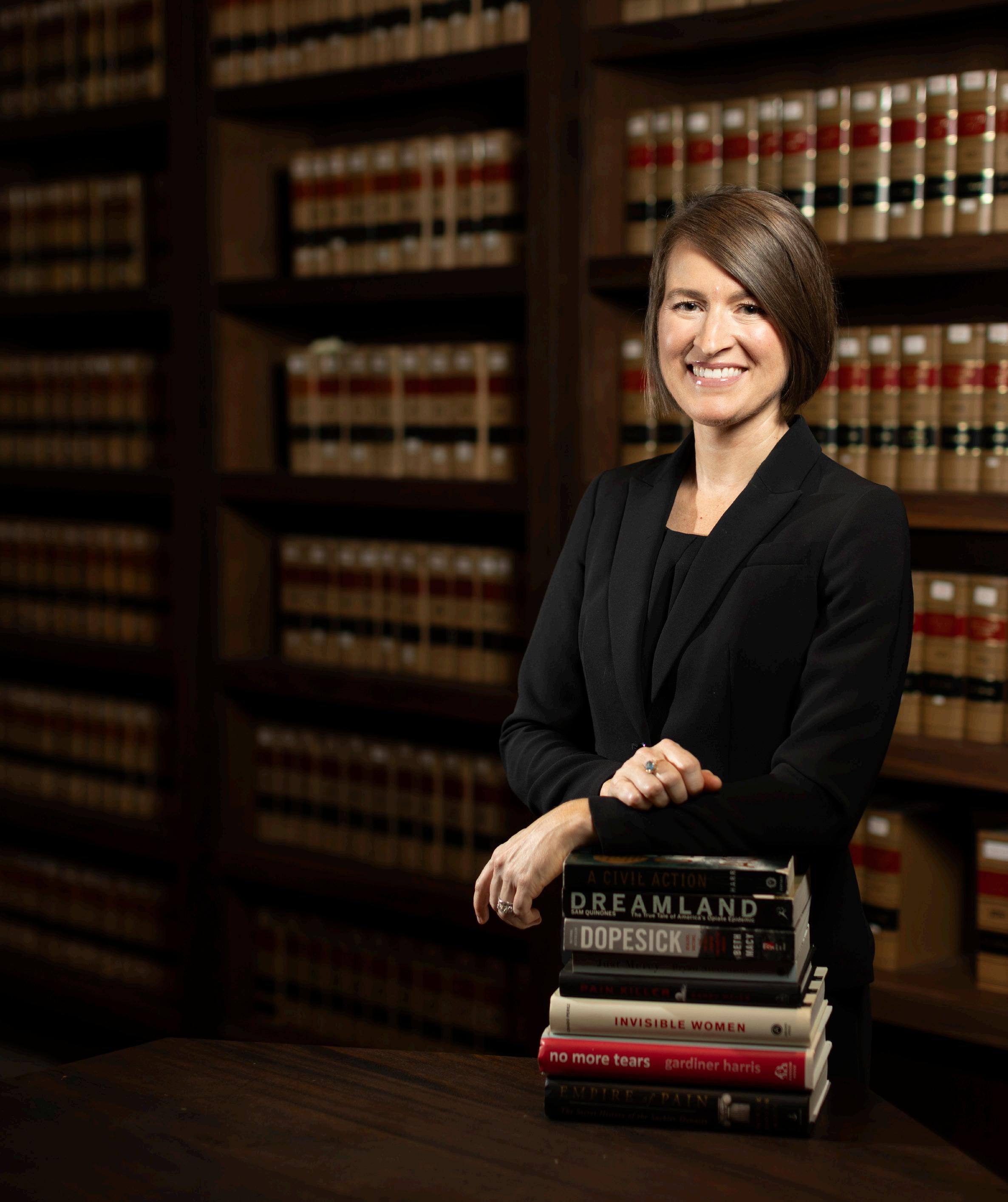
Endowed chairs—positions that receive supplemental support generated from private donations—are essential to recruiting and retaining leading faculty who are committed to world-changing research and preparing the next generation of problemsolvers, pioneers, and leaders. Learn more about supporting UGA’s leading faculty at GIVE.UGA.EDU



